#according to the first result it means lotus
Text
sara profusely denying they have a crush while hasumi gives a very knowing look at her trainer
#i was curious about what sumi's name meant so i went to google#according to the first result it means lotus#which i think is very fitting for her general personality#when i think of a lotus i think of a calm yet pretty pond#sumi is fairly chill when she isn't being the guard dog pokemon#sumi knows what you are sara.#you are helpless. helplessly in love you softie#sleepy rambles#oc: kisaragi🌙
3 notes
·
View notes
Text
CPTSD and Mysterious Lotus Casebook Part II: Di Feisheng, Violence, and Emotional Regulation
In last week’s meta, I wrote about complex CPTSD, its stereotypes, and how DFS and LLH each show different aspects of CPTSD symptoms.
This week’s post focuses on DFS and self regulation, including emotional regulation. As I mentioned before, it’s common for tv shows and films to have characters who have survived child abuse or traumatic combat situations be affected by out of control, violent outbursts. What I find fascinating about DFS, however, is that, while the jianghu and even Li Lianhua initially see him as someone who resorts to violence at the slightest provocation, that’s not at all who he is according to what we see on screen. While he does lash out with violence, he is more in control of his actions, expression of emotions, and violent impulses than just about anyone in the show.
Emotional Regulation
Emotional regulation is a challenge with complex PTSD for a number of reasons, including:
Traditional flashbacks (re-experiencing the traumatic memories as though it is happening again)
Emotional flashbacks (experiencing all the emotions from the trauma as intensely as if it were happening again, including grief, rage, betrayal, fear, etc.)
Body memories (experiencing the physical sensations of the trauma like it’s happening again)
Hypervigilance (being constantly on the lookout for threats to defend against them and keep yourself safe) and its resultant irritability and overstimulation
Intrusive thoughts (seeing images or thinking thoughts related to the trauma that you can’t block out)
Nightmares (of the trauma), or insomnia from avoiding nightmares and the resulting exhaustion and irritability from sleep deprivation
As a result, anything that reminds someone of the trauma can be a trigger that could set off any or all of these reactions. That means, for DFS, that being betrayed by someone he trusted, or being poisoned and made powerless, or being attacked by someone with more power than him, or confronting his abuser is never about experiencing just that event in isolation: it almost always brings up the feelings of the earlier, even more traumatic times similar things have happened. Also, it’s not just events or people’s actions that can be triggers: smells, colors, textures, sounds, tastes, shapes, terrain, enclosed spaces, decor style—anything can trigger this sort of re-experiencing. As you might imagine, responding appropriately to people and situations can be difficult when your brain is constantly telling you that you are in danger or actively being harmed!
How do people deal with being bombarded by emotions, memories, and sensations of the worst times of their lives? The version media shows most often is a traditional “fight” response, where people lash out at others, either preemptively to avoid being hurt or in retaliation for a real or perceived hurt, although lots of survivors of CPTSD turn this fight response inwards in what I’ve started calling “lashing in,” where, like Li Lianhua, they direct the anger and hatred that should go toward the perpetrators of abuse toward themselves instead. (There’s also the “flight” response—avoiding and running away from things that remind you of the trauma or throwing yourself into distractions by being a workaholic—or the “freeze” response of dissociation, or the “fawn” response of trying to appease and placate someone harming you, but more on those another day.)
DFS, Violence, and Emotional Regulation
I want to emphasize that I’m not saying DFS isn’t violent: Di Feisheng does lash out, verbally and physically! (And for a great image set of the number of people he chokes, check out this post by @difeisheng.) What I find fascinating about DFS is the way he is such an interesting twist on the idea of lashing out; he’s not hurting others during a flashback or nightmare, or harming others as an outlet for his anger, or killing first and asking questions later to stay safe. He’s using violence but in a deliberate, controlled way, and as a last resort. And this is even more impressive given all the potential things that might trigger him.
Leaving Seclusion
His first appearance as an adult in the show’s present highlights this beautifully: his first act when he breaks free from seclusion is to tell Jiao Liqiao and Yao Mo not to kill the people who have intruded on his hideout, which is the reason FDB and LLH live past episode 5. This is wild to me, because it would be easy for someone who has been on the run from the Di Fortress his entire life and clearly fears being recaptured to say they deserve death for trespassing or because they could be Di Fortress spies. Or, since he spent a decade recovering from injuries liable to make him feel helpless, he could have used it as a chance to fight them as a way of proving to himself that he is still strong and capable and unlikely to be recaptured. Instead, he tells JLQ and Xue Gong to stand down and uses his qinggong to leave the scene, not even interrogating them to find out more. So, even though being unexpectedly interrupted while he’s still weaker than he used to be would activate his hypervigilance and increase the likelihood of him lashing out, he doesn’t. Anything he’s feeling stays internal and not on his face, such that he looks and acts unaffected. And since it’s one of his earliest appearances, it’s proof that this pattern is present from the start. It’s not just Li Lianhua’s influence or DFS’ time without memories as a-Fei soothing his bad temper or rage or uncontrolled violence: he was never out of control to begin with.
Asura Grass
DFS’ restraint comes into play again when he finds out that Li Lianhua blocked his meridians with Asura grass, interfering with his ability to access his qi. I am feral about this moment. DFS has spent his entire life trying to be as strong as possible so he would never be helpless again and regularly has nightmares/flashbacks of his childhood in the Di Fortress in which he didn’t have the strength, training, or skills to defend himself properly, and to times he was helpless and couldn’t control his own body because of the mind control bug that had been put into him against his will. His nightmares show that he remembers the pain it caused when the Di Fortress head rang the bell, and that the bug writhed in his neck while triggering that pain. In poisoning him with the Asura grass, something that literally moves and grows inside him to make him weaker and unable to fully defend himself, LLH could have unknowingly reenacted that trauma from Di Fortress. The fact that it happens immediately after two positive things–he had regained the strength he’d lost so he’d be feeling safer and freer than he had for the last decade, and the fact that he’d just found LXY alive after mourning him and losing interest in martial arts beyond wanting the security his skills provide–would have made this betrayal hurt even more: it’s the sort of thing that crushes hope and makes you think you’ll always be trapped. That it came from someone he cared for (as a rival, as an aspirational figure, as his equal, as a romantic prospect, etc.) and still mostly trusted could have itself been a trigger because of the early days at Di Fortress when he learned the hard way that his options were kill or be killed, and trust and kindness didn’t fit into that world.
Despite the fact that LLH’s using Asura grass on him would be an incredibly painful combination of triggers and terrible timing, DFS stays mind-boggling in control of his external reactions. When he realizes his meridians are blocked, his face falls and his fingers twitch slightly (they are usually either held completely still in a studied, neutral rounded position or in a fist if he’s really mad about something and doesn’t mind showing it externally), and he starts to take a step towards LLH. But before he’s moved much at all, LLH tells him to stay where he is and not come closer.
And he stops.

He’s having Big Feelings about it (and who wouldn’t? Especially since part of his trauma is being immobilized when trying to get back at the person who harmed him!), as the Throat Bob of Feeling (his biggest emotional tell) shows, but he stops and hears LLH out.
He escalates things later by putting his sword to LLH’s throat and telling him he’ll torture him to get the cure, but it’s more a warning than an actual threat; the fabric of LLH’s robes is between the blade and his skin so not even the flesh will be nicked. And once he learns that LLH is doing this not to harm him but because he wants his help–before he even knows what LLH wants his help with–he removes his dao from LLH’s neck and asks for more details. (There’s so much to say about how he wields words in this conversation, too, but it’s already getting too long!) This interaction shows that, for him, physical violence is to counter an active threat, even if he’s mad and hurting, and that his default even during times of extreme stress is to stay calm, despite how incredibly hard that would be for anyone.
DFS and FDB
This could be an entire meta on its own, but since it’s more obvious than some of the other points, all I’ll say here is that Fang Duobing and Di Feisheng argue and fight all the time, but Di Feisheng almost never instigates it: DFS usually tries to ignore FDB and walk away to avoid the conflict entirely, and once FDB throws the first punch, DFS’s goal is to get out of the fight, not to hurt him. Look at how FDB is actually trying to choke DFS when they’re wrestling and DFS is more bracing against his shoulder, as @difeisheng has said, or even at the rest of the fight choreography where each of DFS’ strikes is to force FDB to let go of him and to leave the room.
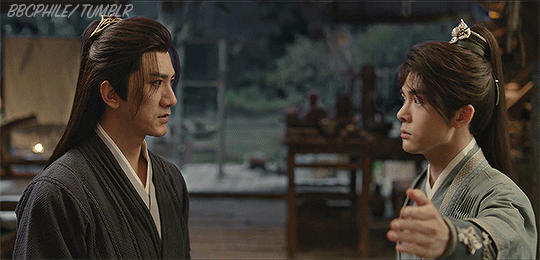
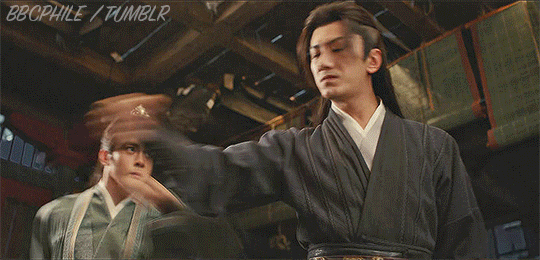
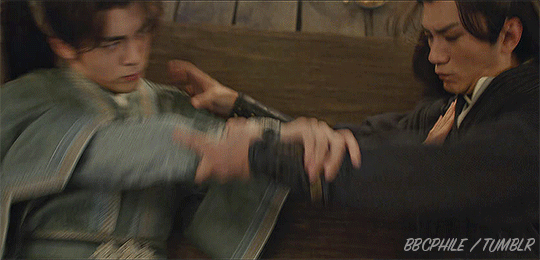
(Note: FDB tries to strangle DFS first, whereas DFS is mainly trying to brace himself against his arms and keep him at arm’s length.
Even in the ep 13 fight, when Di Feisheng eventually poisons Fang Duobing with gang qi, he gives him several verbal warnings to draw his sword first, because he doesn’t want to fight someone who is unarmed. He’s also not trying to kill FDB; he’s trying to hurt him just enough that LLH is forced to ask for his help and agree to live. (More on this in the yin leaves meta I will eventually write.) So, again, it’s controlled violence in service of a larger goal, not vengeful, uncontrolled lashing out.
DFS and the Limits of Emotional Regulation
There are 3 main times when DFS’ control over his anger/hurt/violence is shaken or in jeopardy: 1. when he finds out Li Lianhua was poisoned and is dying; 2. when he wakes up in pain and with no memories in the corpse seller’s place; and 3. when he wakes up from a nightmare/flashback–still without memories–in a bed with LLH hovering over him. For each, I’ll explain possible reasons the event could be so triggering to clarify why he struggled with emotional regulation. (Also, keep in mind that being triggered can happen even if the person in question doesn’t consciously know what triggered them or why, so while he might be aware of some or all of the connections between the present event and his past experiences, he wouldn’t need to be consciously aware of any of them for them to affect him emotionally and make it harder for him to control his response.)
Fight over Bicha
The scene where DFS learns that LXY was poisoned for their donghai battle and thought it was on DFS’ order is fascinating, because it is the most angry and volatile we see DFS at any point in the show as an adult: he yells, repeatedly, his voice shaking with emotion, and he chokes Li Lianhua twice. Given how tightly controlled he is the rest of the time—including when he confronts his abusers and any of the times he is captured or tortured (I’ll talk about the latter two in a dissociation meta later)—that means that whatever he is feeling must be overpowering to shake his iron control. So before we get into analyzing the way that he is still showing restraint, even here, we need to address why this realization would be such a trigger for him.
Although DFS claims he’s angry and upset about the realization because he wants to be the best in a fair fight and his previous fake victory made him seem like a joke, it seems highly likely he’s not telling the full story, since that’s not really a thing he does. (For a full listing of things he lies about or deliberately omits/withholds, check out this post.) In fact, it seems very likely his reaction happened because of just how many triggers this scenario managed to hit. For example, at Di Fortress, he was forced into fights he didn’t want to participate in, where the odds were stacked against him because he was a child forced to fight people older and more experienced than he was, so as an adult, he wants to fight people who are at his level, and not people weaker than he is, because he doesn’t want to continue the cycle. This is why he isn’t interested in fighting other people on the martial arts list, why he barely expends any power at all on fighting the Sigu sect members, etc. He knows what it feels like to be on the other side of that, and in the same way that he wants to free the children in the Di Fortress so they don’t have to suffer as he did, so he wants to never be the cause of someone suffering under an imbalance of power. Also, since every escape attempt from Di Fortress and every attack against his abusive master was rigged against him—because the mind control bug could stop him in his tracks—he likewise doesn’t want to deprive someone of their agency like that. We also know that Di Feisheng and Li Xiangyi signed a peace treaty for five years, where they promised not to attack each other; that promise not to attack each other was exactly what he kept trying to form with the other prisoners in Di Fortress, but he couldn’t find anyone to agree and just got stabbed for his efforts.
Li Xiangyi breaking the peace treaty would have shattered that dream (and probably his heart a bit, too), but even that wouldn’t hurt as much as finding out, all at the same time, that:
1. He had thought he was the best in the world at martial arts which to him meant safety and security from Di Fortress, and he just found out it was based on a lie;
2. His now second-in-command, JLQ, had poisoned LXY (which violated the peace treaty), a betrayal that would reactivate his already very prevalent trust issues;
3. He had fought and almost killed someone in a rigged fight when he tries to be deliberate about his kills and violence so as not to perpetuate the abuse he suffered from;
4. JLQ had essentially tried to turn him into the butcher the head of Di Fortress wanted him to be, and he hadn’t known it for a decade;
5. LXY had spent a decade thinking DFS endorsed the sort of abuses he abhorred;
6. LXY is now dying and mostly powerless because of what was done in his name and because he didn’t notice the poisoning kicking in, and LXY refuses to fight for his life or to give DFS a chance to save him and essentially undo the harm that has been done. To DFS, LXY is making him complicit in his death yet again, which would mean being again responsible for the death of someone he wants to live, just like he was as a child.
Oh, and he’s facing all this with his meridians blocked and without access to his qi, which means he’s most likely feeling perpetually hypervigilant and helpless, which would mean everything is likely to feel like even more of a threat and emotional regulation is even harder.
In short, it is a clusterfuck of epic proportions. And this is all assuming that he mainly thought of LXY as purely a rival he respected: if you read DFS as already loving LXY (whether he realizes it consciously or not), you can see why it would be even worse.
And of course, all of Li Lianhua’s suggestions that DFS pretend he didn’t hear or move on and fight someone else are not addressing the main issues, because he doesn’t know them. But if DFS wasn’t about to tell LXY that someone was framing the Jinyuan alliance for the murder of SGD a decade ago, he’s certainly not about to tell him his deepest secret–that due to a mind control bug, one ring of a bell can render him absolutely helpless, which is why fair fights and being strong enough to defeat any enemy are incredibly important to him–so of course, to LLH, it’s just about DFS wanting to prove he’s the best as part of an ego trip, even though that’s not it at all. And of course LLH’s dismissiveness is going to make everything worse for DFS.
With all that in mind, let’s look at his body language and actions to see how he handles things when he is incredibly close to losing it. Although he does lash out, his first choice, as always, isn’t violence: he gathers info via eavesdropping–rather than bursting in during a fit of rage as soon as he learns the truth–and when he confronts LLH, he yells at him first, telling him what he overheard. It’s only when LLH tries to avoid the subject by snarking at him about eavesdropping instead of telling him the truth that DFS grabs LLH by the neck and shoves him against a pillar.
The moment in the entire show he is at his angriest is when he yells “It matters!” after LLH says it doesn’t matter who won or lost.
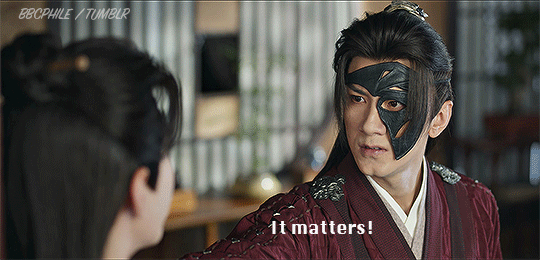
This is what DFS looks like when he’s losing control: his arm shakes for an instant before he locks the muscles to keep in place, and he puts a tad more pressure than he meant to on LLH’s neck before he realizes it and pulls back again. He’s been incredibly truthful here, in a way: the fact that he didn’t win because Li Lianhua was poisoned matters tremendously to him. He’s just not saying why and letting LLH believe the worst of him, which is another of his common strategies.
In case there’s any doubt that DFS’s choking of LLH is more designed to warn than to harm and is overall incredibly controlled apart from that moment, just look at his grip: Li Lianhua can talk and breathe normally and even turn his head the first time, so this move designed to show that DFS is mad, hurt, and serious about the conversation rather than actually trying to hurt or punish LLH or cut off his air. He also lets go completely while trying to convince LLH to let him cure him. He only grips Li Lianhua’s neck again when LLH refuses to accept help and only applies any real force when Li Lianhua essentially calls his bluff about killing people from Baichuan Court (or rather, tells his own bluff–a lie that he doesn’t care what happens to them).


Even there, since he’s making threats he doesn’t mean, he’s very much trying to play into the villain role LLH saw/sees him as (the person who murdered SGD, broke a peace treaty, and poisoned him), but he’s not doing it to harm LLH or “just” force him to have a second duel: he’s doing it to try to convince him to live, to give him something to fight (him) for: the safety of other people DFS thinks LLH cares about most.
After all, most of the conversation isn’t about a second duel at all: it’s about DFS trying to convince LLH to let him find a cure. No wonder he has the Throat Bob of Feeling twice when LLH explains that he’s dying and doesn’t have much time left.

With that in mind, the fact that DFS uses the traditional Di family choking move again when LLH refuses to agree to let DFS try to cure him is a fascinating metaphor for how DFS approaches violence when it comes to LXY: he’s using a move designed to cause harm, but with the intent to convince LLH to accept help. In other words, he’s using a technique designed to kill to try to force Li Lianhua to live.
a-Fei and Hypervigilance
Even when DFS wakes up with amnesia, only remembering “kill or be killed” and some of his worst trauma memories, and would be most likely to act on pure instinct, he still exercises restraint. When he finds himself first at the corpse seller’s and later at Lotus Tower, not knowing how he got to either place, it would be the work of a moment to snap the neck of the man trying to sell him to be married to a dead woman without his consent, or to stab the hair stick (or knife? I can’t tell which) from the nightstand through Li Lianhua’s throat. But even then, when he’d have every reason to assume his life is in jeopardy and he needs to kill first, he doesn’t. In both cases, he pauses, gathers information, and listens, and lets go. (And yes, he collapses in the first of these two instances instead of actively making the choice to let go, but he’s already loosened his grip to listen to Li Lianhua, and when he sees the corpse seller the next day, he doesn’t try to harm him, or even exhibit any animosity at all toward him, showing again that once the threat is passed, so too has his desire for violence.) Even when he’s under threat or having a flashback and all he knows is killing, he doesn’t kill.
DFS and Violence against Abusers
Even when he does intend to harm–particularly with his two abusers, the head of Di Fortress and Jiao Liqiao (who he kills, even though it goes against his policy of not killing women)–his emotions and actions are tightly controlled: while he does choke them and destroy their meridians, and tell them why he’s getting revenge, his voice, strength, and facial expressions are almost superhumanly regulated.
Confronting an abuser is incredibly difficult, because it usually triggers the feelings of fear and helplessness that were experienced during the abuse. It might be hard to imagine DFS feeling fear or helplessness because he doesn’t explicitly show it as an adult much, but the fact that he still has nightmares/flashbacks of being immobilized and hurt by the head of Di Fortress means that even though he’s an adult who is at the top of the jianghu, he’s still regularly re-experiencing the terror of being helpless and at his mercy for decades, and his fear of helplessness has motivated almost every action of his since. That means that he would be struggling during that confrontation, fighting off literal and emotional flashbacks and/or dissociation, and trying to convince his brain that he’s no longer a helpless child about to be punished or killed. And, generally speaking, once you’ve confronted one abuser, future confrontations with different abusers trigger all the feelings from the confrontation with the earlier abuser, especially if the aftermath of the confrontation was traumatic (which, given that it’s when JLQ incapacitated, captured, and tortured him, it definitely was). So, when confronting JLQ, he’s probably reexperiencing that fear and helplessness on top of everything else. And, given how often we see him show nothing, even while being tortured, the cracks in his facade here speak to just how deeply the confrontations are affecting him.
He doesn’t even raise his voice, and the only hints of the toll the confrontations are taking on him are tiny, almost invisible facial movements, which you can see in the gifs below:
When the head of Di Fortress offers to make him the new master and in charge of abusing others, the muscles of one cheek and under the opposite eye start twitching.

(and zoomed in if you need a close up!)

2. When JLQ taunts him after he broke free from her prison by saying “Do you want to escape?” his jaw works from side to side as he forces himself to not react.

3. When he chokes JLQ after she says she’ll kill LLH for being the reason DFS doesn’t love her, it takes him two tries to speak before his voice works (look at his lips forming the opening word twice before working the third time.)

So, clearly, the lapses in his control aren’t violent outbursts; they speak to something far more nuanced than that, namely, the emotional turmoil confronting an abuser brings up.
[Also, compare this to LLH’s reaction when he finds out SGD tricked their shifu into sacrificing himself for him. He’s flooded by his emotions, which affects his fighting style, and it triggers a Bicha flare. Note: I’m NOT criticizing LLH here. His reaction makes perfect sense and I’m not saying DFS’ approach is better. I am saying that it’s unusual to have the hero be the one who lashes out and has less emotional control and to have the person the jianghu sees as the temper-tantrum prone villain be the one who keeps his emotions in a chokehold.]
So many shows have confrontation scenes with an abuser be either profoundly triumphant events or violent revenge fantasies where the character almost loses control beating up the person who harmed them. These scenes are fascinating not just because DFS doesn’t rejoice or lose control, but because of the way DFS’ microexpressions show how hard the confrontations are for him. These are not the actions of someone who is controlled by rage or violent impulses. They’re the actions of someone who has spent so much of his life with his body controlled by the non-existent mercy of others that he refuses to let anything, including his emotions and memories, wrestle his hard-won control of his body away from him. Of someone who knows what it’s like to suffer, powerless, at the violent hands of others, and tries to make sure that the violence he commits with his own hands is well-reasoned and justified. Of someone who is hypervigilant not only to external threats but to the threat he himself could be.
In other words, the extreme amount of control he exercises over himself and the way he is hypervigilant to the threat that he could pose and the way he goes out of his way to not abuse power over others the way he was abused is itself a manifestation of his complex CPTSD.
The portrayal of his cPTSD is particularly interesting when you realize that the out of control, hyperviolent danger to society villain stereotype is exactly who the jianghu thinks Di Feisheng is for most of the show. But the reality is that Di Feisheng has more self-control than the rest of the lotus trio (certainly more than Fang Duobing does), even when he’s being violent. And, just as the jianghu’s legends have very little basis in reality and do damage to the characters, so does the caricature of a hyperviolent traumatized villain have almost nothing in common with the real experiences and symptoms of cPTSD and actively harm survivors. And I’m thrilled that this show is giving us new narratives about trauma to challenge that stereotype.
As for how he holds on to that type of control over himself, given that struggles with emotional regulation are part of having complex ptsd? The short answer is a combination of compartmentalization, dissociation, habit, and grounding techniques (including meditation).
Stay tuned for a post on these coping mechanisms and the evidence from the show that he uses them.
#mysterious lotus casebook#lianhua lou#mlc meta#Di Feisheng#lhl#complex PTSD#PTSD#dihua#Sorry it's incredibly long!#I hope y'all meant it when you told me not to cut anything from it#also I learned to make gifs for this!#Please be impressed: it was hard and stressful
130 notes
·
View notes
Text
Demon king, demigod, drunkard, dōji: exploring the archetypal oni, from Ōeyama to Lotus Eaters
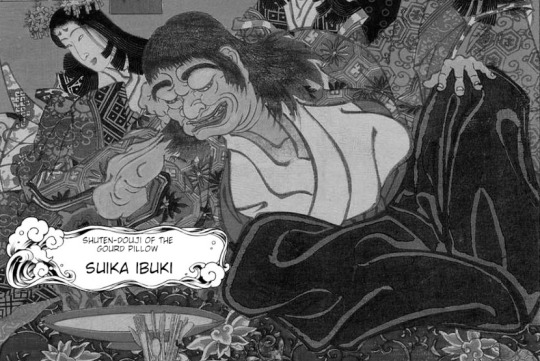
By popular demand, I wrote an article covering the background of Shuten Dōji and his underlings, and how it influenced Suika’s character and the idea of the Four Devas of the Mountain in Touhou. It was initially scheduled for last month, but I’ve experienced unplanned delays.
Read on to learn if you want to learn what Suika has to do with Yamata no Orochi and Mara, if it’s true that oni never lie, and more. I will also explain why making your own fourth Deva of the Mountain is entirely fair game and anyone telling you otherwise is wrong about the source material which inspired ZUN.
The article contains some spoilers for WaHH and a number of other Touhou installments, so proceed with caution if that might be an issue for you.
Ōeyama, or Shuten Dōji: origins
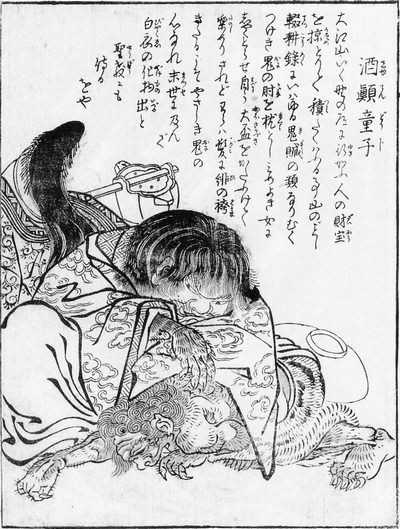
Shuten Dōji, as depicted by Sekien Toriyama in Konjaku Gazu Zoku Hyakki (wikimedia commons)
It perhaps seems a bit silly to start this article with an inquiry into the identity of Shuten Dōji (酒呑童子, “wine-loving youth” or something along these lines). After all, while Touhou characters are often based on obscure figures, Suika is hardly an example of that category. Shuten Dōji is arguably THE archetypal oni, known even to people with limited familiarity with Japanese mythology and folklore. And yet, the matter is nowhere near as clear cut as it might seem at first glance. From a certain point of view, Shuten Dōji might not even exactly be an oni, strictly speaking.
A book from Nara simply titled Ōeyama ("Mt. Ōe") offers a detailed account of Shuten Dōji’s origin. His father was not a man or a demon, but rather a mountain god, Ibuki Daimyōjin (伊吹大明神). That’s not all, though - according to a local belief, Ibuki Daimyōjin was actually Yamata no Orochi. How does that even work? Contrary to the more widespread tradition, the inhabitants of the area around Mt. Ibuki from the Muromachi period onward believed that Orochi survived his confrontation with Susanoo and hid in the mountains.
That’s actually not even the most unusual variant tradition about Orochi. A widespread belief through the middle ages was that he eventually managed to redeem himself, becoming a divine dragon (shinryū, 神龍) residing in the dragon palace under the sea. In that capacity, he was sometimes associated with emperor Antoku, with the latter even claimed to be his reincarnation, for example in a local legend associated with the Atsuta Shrine, preserved in the noh play Kusanagi. In esoteric Buddhist doctrine Orochi was sometimes perceived as a local manifestation (suijaku) of the buddha Yakushi - much like Susanoo was.
Ichijō Kaneyoshi in his Nihon shoki sanso (1455–1457) went into yet another direction, presenting the snake as identical with the naga girl from the Lotus Sutra. Apparently, he specifically means the version of her from Shaku Nihongi… who is identified there as Susanoo’s wife, down to being equated with Kushinadahime (this was not unusual in itself - Susanoo was equated with Gozu Tennō based on similar character, so it was sensible for their wives to be seen as analogous). This effectively created a scenario where Susanoo married his nemesis.
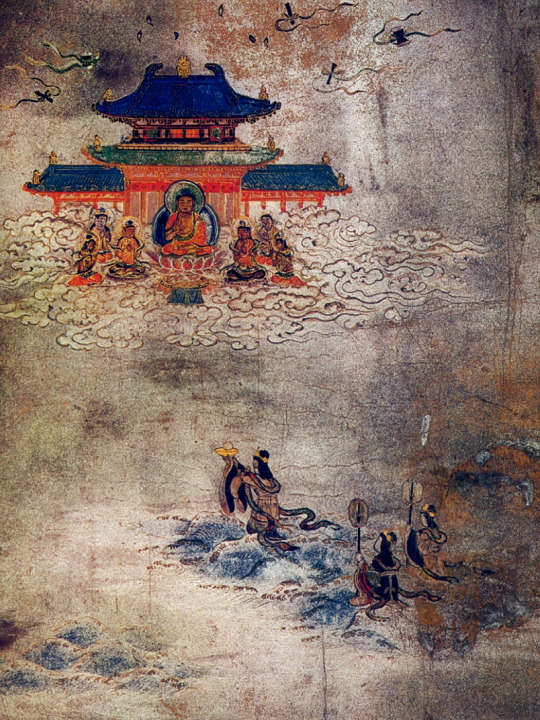
A Japanese depiction of the naga girl offering a jewel to the Buddha, as described in the Lotus Sutra (wikimedia commons)
Anyway, back to Shuten Dōji. According to Ōeyama, Ibuki Daimyōjin, before he even came to be known under this name, fell in love with the daughter of a local feudal lord, Sugawa. He started visiting her at night and she as a result eventually became pregnant. The identity of the visitor was unknown to her father, and out of frustration and fear that nefarious supernatural forces might be involved he eventually contacted various religious officials to perform exorcisms. Needless to say, Ibuki Daimyōjin was less than thrilled, and decided to display his divine wrath through rather conventional means: Sugawa was struck by illness. He once again summoned various Buddhist monks and onmyoji, this time to attempt to heal him. They concluded that the disease will disappear if the deity who caused it is properly honored, and established formal worship of Ibuki Daimyōjin, which apparently did indeed help.
Sugawa’s daughter eventually gave birth to Ibuki Daimyōjin’s child. The child started to cause problems at the age of three: his love of alcohol manifested for the first time, earning him the moniker of Shuten Dōji. By the time he was ten, his misdeeds were too much for his family to bear with and his grandfather decided to send him to Mt. Hiei to become a novice (chigo). The monastic lifestyle didn’t really change much though, and Shuten Dōji continued to drink. Eventually he managed to convince three thousand monks (sic) to drink with him and to join him in an “oni dance” during which everyone put on masks representing demons. The festivities lasted seven days. When Shuten Dōji woke up afterwards, he realized his mask had fused with his face, and he was no longer able to take it off. The other participants fled out of fear of his new form.
Shuten Dōji’s Mt. Hiei career was subsequently cut short by Saichō, the founder of the Tendai school of Buddhism. After learning what happened, he prayed to the buddha Yakushi and to Mt. Hiei’s protective deity Sannō Gongen to banish Shuten Dōji. It's worth pointing out that presenting young Shuten Dōji and Saichō as contemporaries is basically standard, and pops up in multiple legends. There are variants where Kūkai, the founder of Shingon, plays a similar role instead, to. They actually lived some 200 years before the other historical figures who appear in Shuten Dōji narratives, but this is not an oversight. It is a given that a partially divine being would live for much longer than a human.
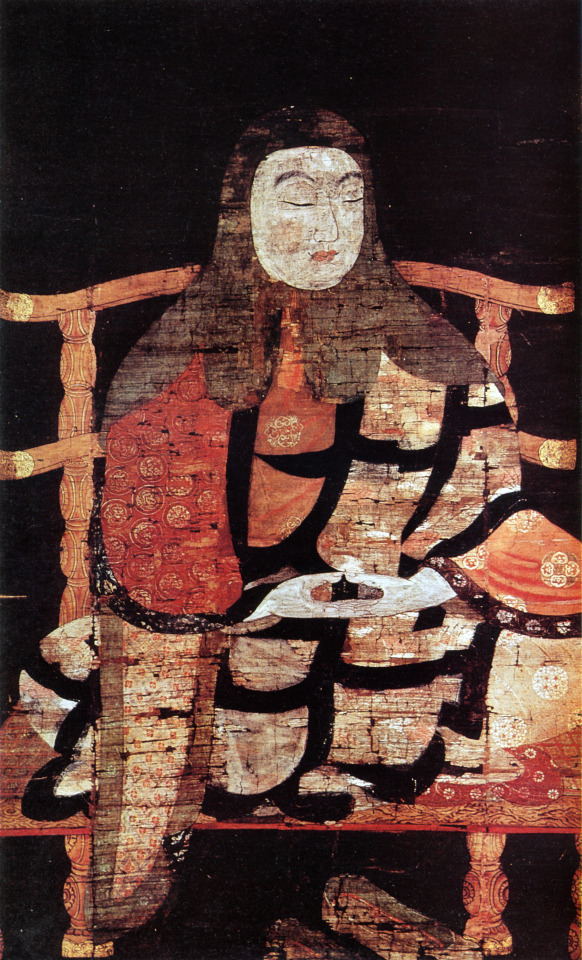
A Heian period portrait of Saichō (wikimedia commons)
As a result of Saichō’s success, Shuten Dōji had to flee. He tried to return to his grandfather’s residence, but this was no longer an option for him. He temporarily hid on Mt. Ibuki, but eventually left for Mt. Ōe, where he finally became a veritable "demon king".
The reason why Shuten Dōji was rejected by his family is that he was recognized as an “oni child” (鬼子, onigo). In the folkloric sense, this term refers to supernatural beings which are nonetheless partially human by birth. Not necessarily part oni, though. Another well known onigo, Sakata no Kintoki, was the son of a yamauba, for instance.
However, Yanagita Kunio noted that this term also referred to children born with teeth (a real, though very uncommon phenomenon), who were believed to turn into oni - much like how Shuten Dōji did. He states that especially before the Edo period this lead to cases of child abuse or outright murder. In some cases sending the child to become a member of Buddhist clergy was seen as a remedy. For example, a twelfth century monk named Jōjin in a letter relays that he suggested this to the mother of such a newborn. It is not hard to see that Ōeyama likely consciously references this custom.
The other origin of Shuten Dōji
Yet another tradition is preserved in a variant of the standard Shuten Dōji tale which switches the location of his demise from Mt. Ōe to Mt. Ibuki: here Shuten Dōji is not just any demon, but a manifestation of Mara. As in, the opponent of the Buddha and demon king of the sixth heaven, not some other accidentally similarly named figure.
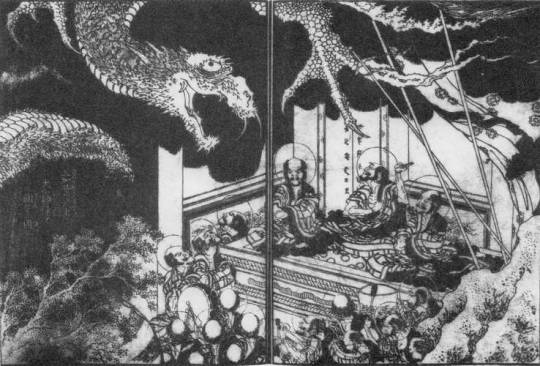
Mara, as depicted by Hokusai in Shaka-goichidai-zue (wikimedia commons)
It is presumed that this portrayal of Shuten Dōji might be tied to medieval Japanese traditions pertaining to Mara. They might sound unusual today: he was both a “demon king” (魔王) obstructing enlightenment, as expected, but also a jinushi (地主), or “landholder deity”. From the Buddhist point of view, jinushi were ambivalent figures: on one hand, their presence was responsible for bestowing specific locations with holiness. On the other hand, they could resist Buddhism as demonic forces, and had to be subjugated or converted to prevent that. Mara was the ultimate jinushi, the king of the world as a whole. A role already attributed to him in earlier Buddhist sources was basically adjusted for this framework.
The jinushi version of Mara originated among proponents of the imperial court and mainstream Buddhist institutions, but it curiously also gained traction among the opponents of these structures. Mara became somewhat of an anti-establishment icon more than once, essentially. A legend links him with (in)famous rebel Taira no Masakado (who you may know from SMT) for this reason.
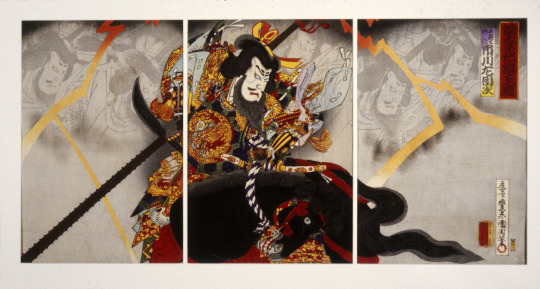
Masakado, as depicted by Kunichika Toyohara in Sen Taiheiki Gigokuden (wikimedia commons)
Other similar examples are also known. A local legendary figure from the Tsugaru peninsula in modern Aomori prefecture, Tsugaru Andō (津軽安藤), who after a failed rebellion fled to Hokkaido, was proudly described as a vassal of Mara by local officials who claimed descent from him. Prince Sutoku, a banished opponent of emperor Go-Shirakawa, swore a vow to become like Mara. Oda Nobunaga famously referring to himself as the “demon king of the sixth heaven” in a letter to Takeda Shingen is likely another example.
Reportedly a related belief that praying to the jinushi version of Mara can spare one from conscription persisted as late as the early 20th century, though generally he belongs to the realm of “medieval myths” which faded with the ascent of a new system of values in the Meiji period, in which the early imperial chronicles were favored. Even though it is largely forgotten today outside of specialized scholarship, there is much more to this Mara tradition. It led to the development of one of my favorite Japanese myths with no popcultural reception, but you will have no wait a few more weeks to learn more.
It has been argued that behind the identification of Shuten Dōji and Mara might reflect a historical event of the sort which led to associating the latter with figures such as Masakado. In other words, that Shuten Dōji in this case might be less a demon and more a demonized form of some opponent of imperial or religious authorities.
It has been argued that the Ibuki version was the result of combining an original oral narrative, a precursor of the textual versions we are familiar with today, with the memory of the death of a certain Kashiwabara Yasaburō, a bandit leader, in 1201. It has in fact been argued that even the mt. Ōe version might simply be a particularly fabulous reinterpretation of a punitive mission against bandits robbing and murdering travelers. Such rationalist explanations are not exactly new - Ekken Kaibara already argued in the Edo period that the legend of Shuten Dōji must have been the reflection of the downfall of a real bandit who perhaps wore the mask of an oni while committing robberies.
It’s important to bear in mind to not go overboard with this speculation, though. Ultimately the Mt. Ibuki version has a more pronounced religious character than other variants in general: Shuten Dōji’s nemesis Raikō’s is identified as a manifestation Bishamonten or Daiitoku Myōō (in the latter case, Bishamonten and the three other heavenly kings correspond to his four retainers), emperor Ichijō with Miroku (Maitreya), and Abe no Seimei, who plays a minor role in vanquishing the demon, with Kannon.
These equations reflect the idea of honji, or “true nature” of Buddhist figures, who were believed to take various guises through history to help people reach nirvana, for example these of local deities or historical figures. The best known example of application of this doctrine in Japanese Buddhism is obviously the historical phenomenon of honji suijaku, which was focused specifically on kami.
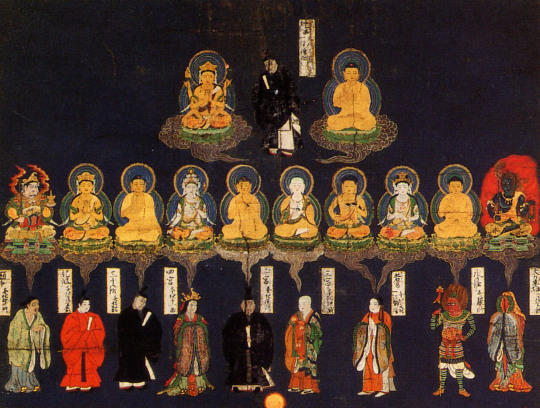
A Kasuga mandala representing the correspondences between Buddhist figures and local kami (source; reproduced here for educational purposes only)
The legend of Shuten Dōji
Regardless of which mountain is identified as the residence of oni, and of whether the dramatis personae are identified with Buddhist figures or not, the plot of the various versions of the legend of Shuten Dōji surprisingly does not vary all that much. While it is reasonably well known, I figured it won’t hurt to summarize it here anyway, especially since the information above should make it possible to view it from many new angles.
The oldest surviving version, Ōeyama Ekotoba (“Illustrations and Writing of Mt. Ōe”), presumably based on preexisting oral sources, comes from the fourteenth century, specifically from the Nanbokuchō period. However, the story only reached the peak of its popularity a few centuries later, in the Edo period. This was a part of a broader phenomenon: preexisting tales about warriors matched the sensibilities of the new ruling classes and were kept in circulation by them, but eventually they also became a part of urban popular culture. Many adaptations were produced, including noh plays and ukiyo-e. To put it very colloquially, the heroic warriors and demon quellers from the previous periods became the Edo period counterpart of contemporary superhero media. This is a genuine comparison employed in scholars, for clarity, not a joke.
As remarked by Bernard Faure, the most widespread version is basically framed as if it was a tabloid story from the Heian period. In 995, young women (and in some versions men too) disappear whenever a particularly violent storm occurs, and nobody knows how to stop it. Not even the power of Buddhist exorcisms is enough. Seeing as in the portrayed time period that was pretty much the universal solution to supernatural problems, this is a big deal.
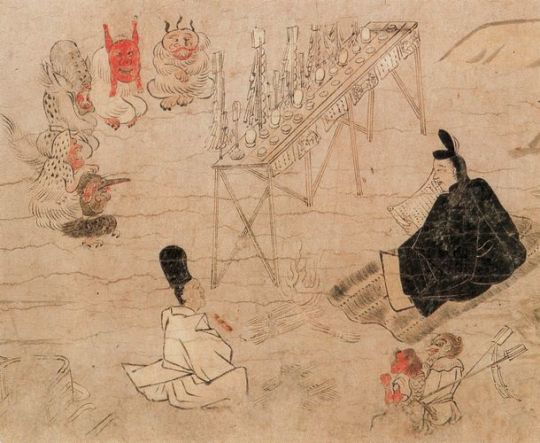
Abe no Seimei (right) in the Fudo Rieki Engi (wikimedia commons)
This is a source of distress for a certain official, Ikeda Kunikata (or, in some version, Kunitaka), whose only daughter is among the kidnapped women. He decides to seek the help of the Heian period superstar Abe no Seimei, arguably the most famous onmyoji in history. Alternatively, the expert contacted is a certain Muraoka no Masatoki, who to my best knowledge is a fictional character and doesn’t appear anywhere outside of some variants of this tale.
Either way, thanks to this intervention it is possible to identify the culprit as a demonic being residing on Mt. Ōe (or alternatively on Mt. Ibuki). In one of the versions featuring Seimei he specifically identifies him as a tenma (天魔), “heavenly demon” - a term commonly used to refer to tengu (as ZUN does in Touhou) and to servants of Mara (overlapping if not identical categories, really; stay tuned for a future article exploring this).
However, onmyoji arts are not enough to stop the crisis; all Seimei can guarantee is that Kunikata’s daughter will survive, but he has no way to confront the demon directly. Kunikata therefore decides to bring the case to the attention of the emperor, Ichijō. He holds a meeting with various ministers, who note that in the past a similar case was solved by Kūkai (recall his already mentioned association with Shuten Dōji). However, there are no monks of equal skill left, so his feat cannot be repeated.
It is then concluded that the only way to end the demon’s reign of terror it is to send the strongest warrior they were aware of, Minamoto no Yorimitsu (Raikō) and his four retainers, Watanabe no Tsuna, Sakata no Kintoki, Taira no Suetake, and Tairi no Sadamitsu, on a mission to kill him. Raikō is also assisted by Fujiwara no Yasumasa (Hōshō) and his anonymous attendant, but these two never gained much prominence as characters in this narrative. Additionally, in some versions other figures from the same period - Taira no Muneyori, Minamoto no Yorinobu (Raikō’s younger brother) and Taira no Korehira - are namedropped as potential candidates considered by the emperor, but they all reportedly decline to partake out of fear.
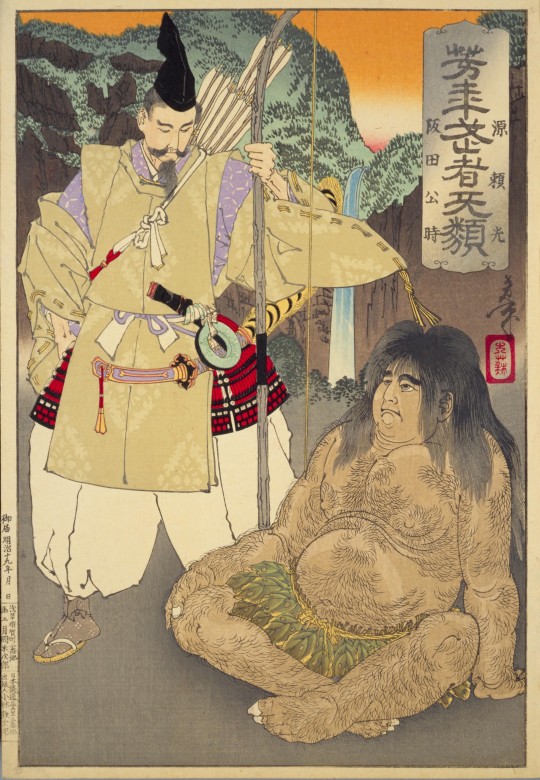
Raikō and Kintoki, as depicted by Yoshitoshi Tsukioka (wikimedia commons)
Preparations started with prayers in Sumiyoshi, Kumano, Kasuga and, in some versions, Hie shrines. They did not go unanswered. Raikō and his retainers subsequently encounter a group of shugenja (mountain ascetics) who turn out to be the manifestations of the deities they paid honor to: Sumiyoshi Myōjin, Kumano Nachi Gongen, Hachiman (here addressed as a bodhisattva) and, if the Hie shrine is included in a given version, Sannō Gongen. They explained that to safely enter the fortress of Shuten Dōji, Raikō and his men must disguise themselves as shugenja (that’s because the legendary first shugenja, En no Gyōja, famously had an entourage of demons). They also provide him with supernatural wine. They state the oni will inevitably drink it due to their fondness of alcohol, only to end up poisoned as a result. In some versions they vanish afterwards, but in others they continue to accompany Raikō.
The protagonists then encounter a woman washing blood stained clothes. In some versions she is described as elderly, and states she has lived for 200 years as a servant of Shuten Dōji. In the most widespread Edo period version, she is young and says she was only kidnapped a year earlier, though.
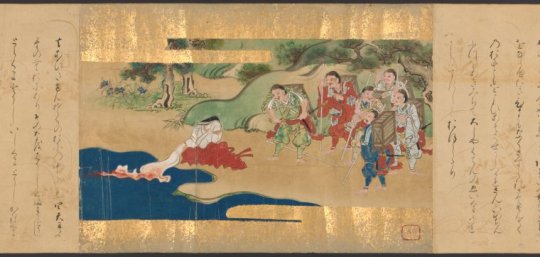
Encounter with the woman washing bloody clothes (NYPL Digital Collections)
Regardless of her age, she reveals some additional information about Shuten Dōji, though that also varies depending on the version. In some, she explains that he looks like a human during the day, but takes the form of an oni at night. His human form is specifically that of a dōji, literally “child”, but we’ll get back to the full context of this term later. In any case, I think it's safe to say the shape and size changing is where Suika'a ability came from.
In another variant, the woman warns the heroes that Shuten Dōji is enraged by Abe no Seimei’s actions, as the onymoji apparently figured out in the meanwhile how to keep the people of Kyoto safe by employing a number of shikigami (a standard part of his repertoire).
There are no further stops on the journey, and shortly after the encounter with the woman of variable age Raikō and his men enter the mountainous land of the oni. Especially in the older versions, it’s a place completely out of this world, with all four seasons occurring at once. Once they enter the fortress located there, they instantly encounter Shuten Dōji… and ask him for a place to stay for the night.
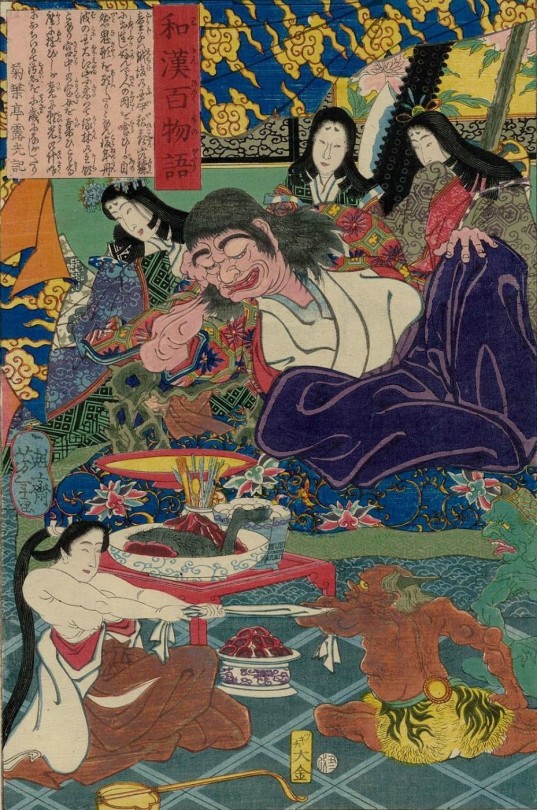
Distinctly human-like Shuten Dōji, as depicted by Yoshitoshi Tsukioka in One Hundred Ghost Stories from China and Japan (LACMA; reproduced here for educational purposes only)
Rather unexpectedly, he instantly agrees. He then tells them about his past; this largely a shorter version of the legend already discussed earlier, though with nothing predating the Mt. Hiei section mentioned. We also get a specific date for his arrival on Mt. Ōe, 849. This doesn’t last long, though, and soon he invites the protagonists to partake in a feast with him. This is obviously not a regular party, and while the individual versions can be more or less graphic, it is clear that the oni are consuing the flesh and blood of their captives.
Despite various horrific sights, Raikō maintains composure. He uses the opportunity the feast presents him with to offer Shuten Dōji the sake he received from the three (or four) deities earlier. As expected, Shuten Dōji gets drunk, and leaves to rest in his chamber.
The other oni continue to party. In some versions, some of them try to approach the protagonists by disguising themselves either as a group of courtly ladies or as a dengaku troupe, but Raikō’s glare is so intense they quickly relent. Eventually all of the oni give up on attempting to engage with the alleged ascetics and end up drunk.
That’s when the heroes decide to free their captives. These obviously include the women from Kyoto. However, as it turns out, Shuten Dōji’s rampages actually extended beyond Japan, to India and China, though only captives from the latter area actually appear. Multiple versions additionally mention that one of the prisoners was a young acolyte of the Tendai abbot Ryōgen, who was protected by assorted deities. This doesn’t really come into play in any meaningful way, though. Once everyone is freed, the heroes draw their weapons and enter Shuten Dōji’s chamber.
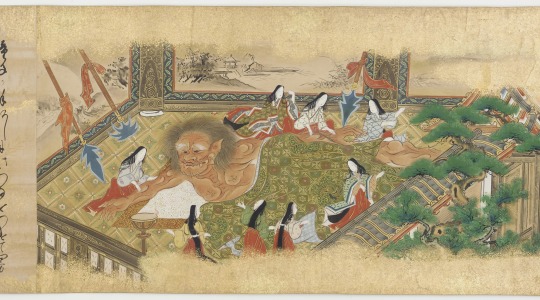
Sleeping Shuten Dōji (National Museum of Asian Art; reproduced here for educational purposes only)
The protagonists finally witness Shuten Dōji's oni form. He is five jō (around fifteen meters) tall, has fifteen eyes and five horns. His head and torso are red, his right arm is yellow, his left arm is blue, his right leg is white and his left leg is black. This might be a reference to the five elements. Alternatively, he could be described as entirely red, which might either be yet another way to reference his love of alcohol, as in the case of the shōjō, or an indication he was comparable to a “plague deity” (疫神, ekijin).
The manifestations of the deities from earlier show up again, this time to hold Shuten Dōji in place so that Raikō can strike. He cuts off his head, but to his shock it rises into the air and starts talking.
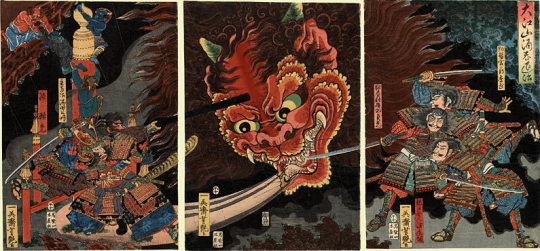
Confrontation between the heroes and the floating head of , as depicted by Yoshitsuya Utagawa (wikimedia commons)
Shuten Dōji actually mocks the heroes: “How sad, you priests! You said you do not lie. There is nothing false in the words of demons.” Needless to say, his final words are pretty directly referenced in Touhou. Oni, at the very least, claim they do not lie. Mileage of course varies, though.
ZUN is not the only author drawn to this element of the legend. It would appear that even the Japan Oni Cultural Museum has advertised itself with the words “there is nothing false in the words of demons” in the past. As noted by Noriko T. Reider, emphasizing this apparent honesty (or naivete) sometimes serves as a way to make oni sympathetic or even relatable for modern audiences.
However, it's worth noting that in the noh version, Raikō pushes back against Shuten Dōji’s words, and points out even the claim oni do not lie is a lie. He has a point, considering some versions outright establish oni capture their victims by disguising themselves as people close to them, imitating their voices. It probably also should be pointed out that in Konjaku Monogatari, oni are said to be scary precisely because they can tell apart right and wrong.
Anyway, oni ethics aside, it turns out that to kill Shuten Dōji for good, one has to gouge out his eyes. Once that is accomplished, Raikō's mission is finally complete. After killing the other oni, the protagonists take the head with them to Kyoto. Obviously, they also take the freed captives with them. The young women return to their families, and the Chinese men head for the coast to find a ship which could take them home. They promise to let the emperor (the Chinese one, for clarity; that would be Zhenzong of Song in 995) about Raikō's heroism.
In the versions where the woman washing clothes was elderly, rather than simply one of the young captives, on the way back the protagonists learn that she has passed away in the meanwhile, since her lifespan was unnaturally extended by Shuten Dōji. Once he died, so did she.
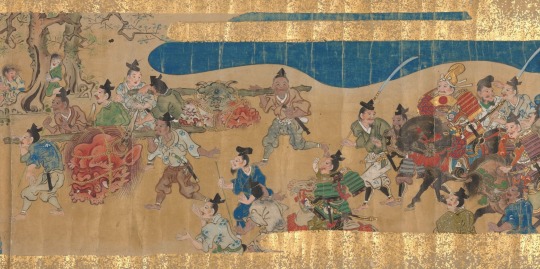
Transport of Shuten Dōji's head to Kyoto (NYPL Digital Collections)
Before the head can enter the capital, a purification ritual has been performed. Abe no Seimei thankfully knows how to do that. Thanks to him, all the relevant authorities can examine it. The emperor decides it will be best to store it in the treasure house of Uji. This location pops up in multiple legends. The severed heads of the two other equally famous malign entities, Ōtakemaru and Tamamo no Mae, were also stored there according to legends focused on them, in addition to various Buddhist relics and mundane treasures.
In an alternate version, the head never reaches the imperial court. Raikō and his retainers encounter the bodhisattva Jizou, who tells them it is too impure to be shown to the emperor, and suggests burying it. The location selected, a hill on the northwestern limits of the city, came to be known as Kubizuka (首塚), literally “head tumulus”. Shuten Dōji actually came to be enshrined there as Kubizuka Daimyōjin (首塚大明神), and in this divine guise developed an association with learning and ailments of the head.
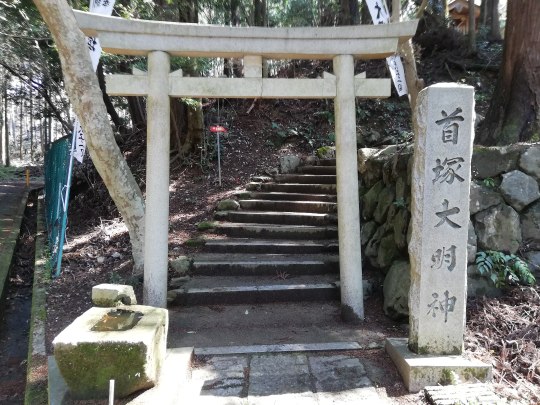
The Kubizuka shrine in 2019 (wikimedia commons)
There is yet another variant tradition about the final fate of Shuten Dōji: after his death he became a vengeful spirit, and then turned into a tsuchigumo, just to be defeated by Raikō and his retainer Tsuna for a second time.
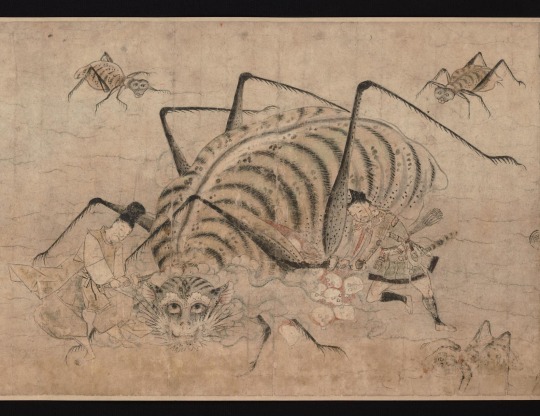
Raikō and Tsuna battling tsuchigumo, as depicted in Tsuchigumo no Sōshi Emaki (wikimedia commons)
Interestingly, it has been argued the tale of Shuten Dōji was at least in part based on that of the tsuchigumo Kugamimi no Mikasa (陸耳御笠), who resided on Mt. Ōe according to Tango Fudoki Zanketsu (丹後風土記残欠). The tale is not preserved fully, though, so all we know for sure other than the location is that the hero opposing him was Hikoimasu no Miko (日子坐王), a stepbrother of emperor Sujin (he is also attested in other sources). A second tsuchigumo, Hikime (匹女) is successfully defeated, but the fate of Mikasa is left unspecified in the surviving sections. This obviously makes further comparisons difficult. The topic of tsuchigumo cannot be dealt with here due to space constraints, but I promise I will return to it in a future article.
The supporting cast of Shuten Dōji
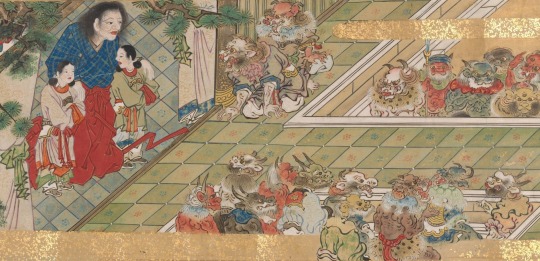
Shuten Dōji in his human form and his oni henchmen (NYPL Digital Collections)
Something that requires further discussion is the matter of the underlings of Shuten Dōji, since it is a topic directly relevant to Touhou. You might have noticed I actually avoided referencing them in any meaningful capacity in the summary of the legend. That’s because they actually do not play a major role. There also wasn’t any consistent view regarding their number or names. However, the version which came to be standard in the Edo period lists four of them - an obvious mirror of Raikō and his entourage. As a matter of fact, both groups even share the same moniker, Four Heavenly Kings.
This idea predates the Edo period, though. An earlier variant based on picture scrolls created by Kanō Motonobu already lists four servants of Shuten Dōji: Gogō, Kiriō, Ahō, and Rasetsu (yes, an oni named Rakshasa). However, two additional oni at his service are also listed, Kanakuma Dōji and Ishikuma Dōji. They are described as his personal guards, and as, well, dōji. It is clear the term is used in a literal sense here - they are said to look like “overgrown adolescents”. Two different subordinates are mentioned in another picture scroll: Kirinmugoku (麒麟無極) and Jakengokudai (邪見極大). However, they do not receive any characterization, or even physically appear in the narrative. Shuten Dōji shouts their names when he is about to die, and the very assumption that he’s referring to his oni subordinates is conjectural. The same version states that there were at least ten oni in the fortress so it’s not like it’s an implausible assumption.
The group of four oni returns in the standard Edo period version, where their names are Hoshikuma (“Star-bear”) Dōji, Kuma (“Bear”) Dōji, Torakuma (“Tiger-bear”) Dōji and Kane (“Iron”) Dōji. There’s also a fifth oni who is not a member of the group of 4, but shares the same naming pattern, Ishikuma Dōji. He actually gets a handful of lines, though they do not really provide him with much of a character beyond establishing he likes sake, that he eats humans, and that he is loyal to Shuten Dōji. Kane Dōji also gets a single line… explicitly alongside Ishikuma and multiple other nameless oni, though, and it boils down to announcing they will go down fighting because without their leader they no longer have a place to go.
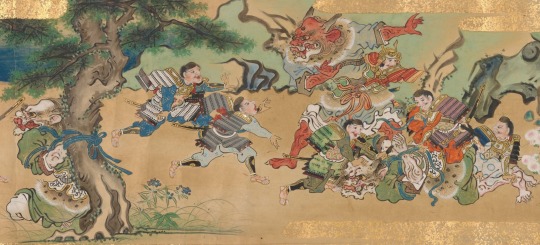
Defeat of the oni (NYPL Digital Collections)
Ibaraki Dōji: Shuten Dōji’s only equal?
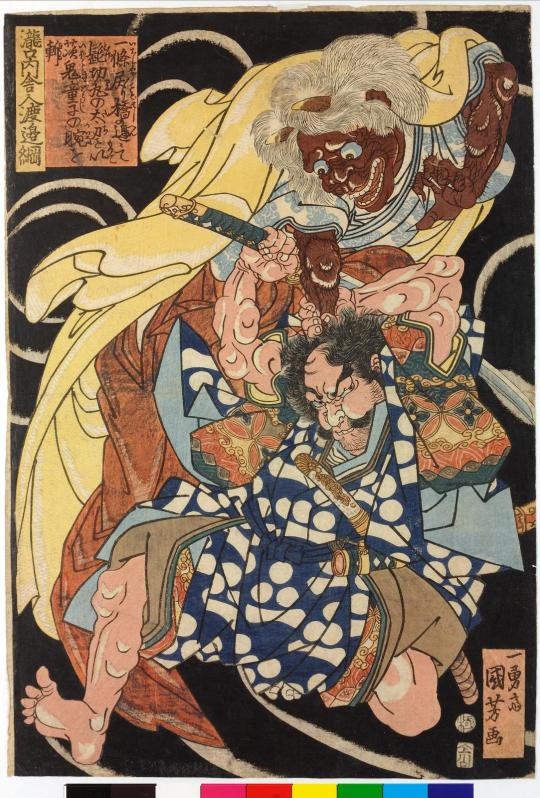
Watanabe no Tsuna battling Ibaraki Dōji (wikimedia commons)
A further unique case is that of Ibaraki Dōji, who actually acquired some fame as an individual character, and today is sometimes cited as an example of an oni equally archetypal as Shuten Dōji.
Despite being portrayed as a close associate of Shuten Dōji, Ibaraki Dōji to my best knowledge isn’t counted among the Four Heavenly Kings in any version. The character of the connection is evidently more nebulous. I know an assertion that a tradition presenting Ibaraki Dōji as Shuten Dōji’s wife is attested is repeated as fact on wikipedia and various at least semi-credible websites, but there is never a citation provided, and no version of the narrative covered in articles and monographs I have access to includes such an element. I am not claiming it is impossible, though I do feel the fact it doesn’t come up in any paper or monograph discussing either figure I have access to doesn’t mention to might indicate it’s either a recent reinterpretation or a very obscure local variant. Note this is not meant to be an argument against any Touhou ships.
What I can say with certainty is that Ibaraki Dōji’s gender is actually a matter of occasional academic dispute. In the versions of the basic Shuten Dōji narrative which mention this oni, he is pretty firmly male. However, he is said to be capable of taking the form of a woman. Noriko T. Reider argues that on this basis it can be effectively assumed that at the very least this specific oni can be considered genderless or capable of freely changing their gender, though she tentatively extrapolates this ability to oni in general.
While Ibaraki Dōji’s gender changing adventure is technically its own legend, a reference to it was incorporated into the basic Edo period version of the Shuten Dōji narrative. During the feast, the latter mentions in passing that the former, his trusted ally, lost his arm in a fight with Watanabe no Tsuna during one of their Kyoto raids, after failing to abduct him while disguised as a woman. He clarifies that the arm was later recovered, but not particularly many details are provided.
The rivalry between Tsuna and Ibaraki Dōji subsequently comes into play after Shuten Dōji’s death, when the protagonists are about to exterminate the other oni. Ibaraki charges him and they two fight without a clear winner for a while, until Raikō intervenes and kills the oni. I would argue that despite him being responsible for dealing the killing blow, it is Tsuna who should be considered Ibaraki’s nemesis, though. Interestingly, at some point ZUN considered featuring a character based on him in Wild and Horned Hermit (source). That obviously did not come to pass, though.
Tsuna already fights an oni in Heike Tsuruginomaki, and many other variants of the story were written subsequently, with the noh play Rashōmon being the most famous. Curiously, the oldest version makes no reference to Shuten Dōji, and the oni actually resides on Mt. Atago, but by the Edo period the two were regarded as allies operating from Mt. Ōe.
The details are otherwise generally similar across all of the sources. Raikō sends Tsuna on an errand. He encounters a woman on the Modoribashi Bridge in Kyoto, but as soon as he offers to take her with him she turns into an oni. Thinking quickly, he cuts off the creature’s arm, which is enough to make them flee. He keeps the severed limb as a trophy. Some time later, he is visited by an old woman who he assumes is his aunt... but who turns out to be the same oni, who uses a brief moment of confusion to recover the arm and fly away.
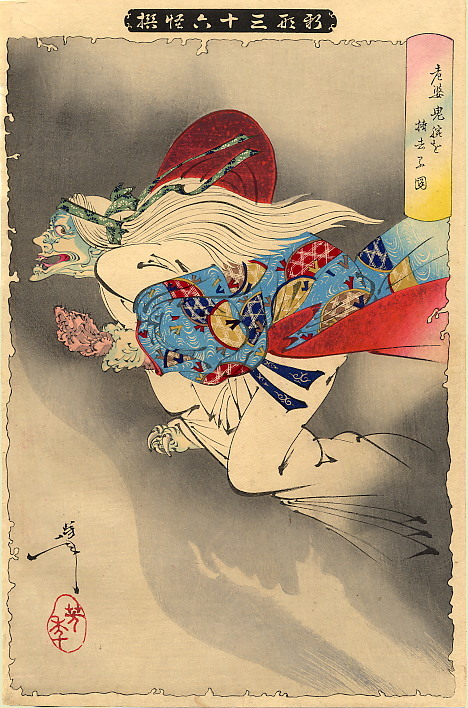
Transformed Ibaraki Dōji, as depicted by Tsukioka Yoshitoshi (wikimedia commons)
The legend of Ibaraki Dōji was evidently reasonably popular in the Edo period, and could even be utilized to comedic ends. One example is an Edo period satirical pamphlet, Thousand Arms of Goddess, Julienned: The Secret Recipe of Our Handmade Soup Stock, written by Shiba Zenkō and illustrated by Kitao Masanobu. Here the one-armed Ibaraki Dōji is one of the figures interested in leasing one of the now detached additional arms of the Thousand-Armed Kannon, who has apparently fallen in dire straits (“business slumps are inevitable, even for a Buddha”, comments the narrator, alluding to the financial conditions of the 1780s). As we learn, after making a purchase Ibaraki is disappointed by the lack of hair, and promptly hires a craftsman to add it:

Original translation by Adam L. Kern; reproduced here for educational purposes only. I am not responsible for the typesetting.
In my recent Ten Desires article I’ve already discussed the oni of Rashomon as a character in legends about Yoshika no Miyako, which I won’t repeat here. It will suffice to say that this conflation effectively made Ibaraki a penchant for poetry and fine arts, and that it indirectly put him in the proximity of the pursuit of immortality. Whether this is why ZUN made Ibaraki’s counterpart a wannabe immortal (“hermit”) is difficult to ascertain, but it does not strike me as impossible.
The oni of Rashomon actually appears in at least one more legend which similarly portrays him as an enthusiast of the arts, though to my best knowledge this one never came to be reassigned to Ibaraki Dōji. It is centered on a famous biwa player, Minamoto no Hiromasa, who has to resolve the case of mysterious theft of an instrument from the imperial palace. As you can expect, it is revealed to specifically be an exceptional biwa, which bears the name Genjō. Hiromasa surveys the city in hopes of finding it, and eventually hears its distinct tones while passing near the Rashomon gate. He quickly realizes an oni is playing it. He politely asks if he can have it back, since it’s a treasure of the imperial court… and the oni eagerly obeys, thus bringing the story to a happy end. However, we are told Genjō acquired supernatural qualities in the aftermath of the theft, and only played when it felt like it, as if it was a living being.
There is a variant which reveals that the oni of Rashomon was in fact the ghost of Genjō’s original maker, a craftsman from India. In this version, Abe no Seimei has to intervene to recover it, and the oni only agrees to return it after being promised a night with a woman he fell in love with who resembles his deceased wife. There is no happy ending here, though, as the woman’s brother convinces her she needs to kill the oni. She fails, and meets such a fate herself instead. It seems that the reader’s sympathy is actually supposed to be with the oni in this case.
Conclusions, or why you should make your own Deva of the Mountain
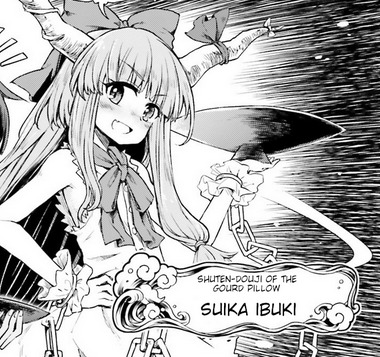
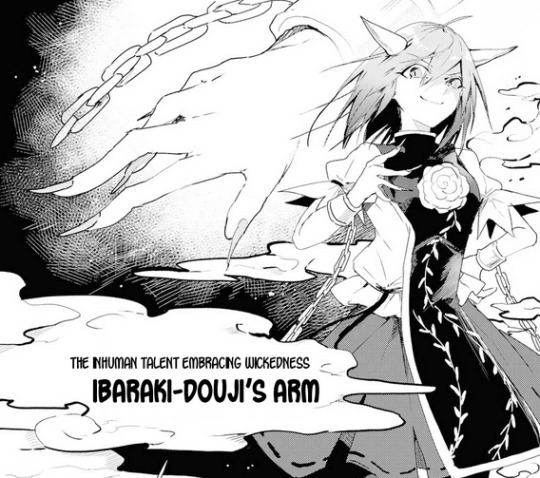
Obviously, there is nothing novel or clever about stating that the two figures this article is focused on, Shuten Dōji and Ibaraki Dōji, correspond to Suika and Kasen respectively. You can learn that from the official media itself, after all. Funnily enough, it seems this might have been even more blunt, judging from unused ideas for referencing the legend to an even greater degree in WaHH, with the defeat at Mt. Ōe as the explanation why oni reside… well, elsewhere (source). Granted, it would also be a disservice to ZUN to say he only created anime girl versions of the classic oni. He effectively created his own versions of both Shuten and Ibaraki - for every similarity between the irl background I’ve described and Touhou, there is also something brand new. That is part of what makes Touhou compelling, I would argue.
Naturally, the fact that the group Kasen and Suika belong to is referred to as the Four Devas of the Mountain shows clear inspiration from the Edo period version of the original legends. However, Suika and Kasen are counted among the four, which is obviously an innovation. Additionally, while Yuugi is naturally named after Hoshikuma Dōji, who you were able to meet earlier, save for the name she is effectively a fully original character. Her ability references the Analects of Confucius, rather than anything directly tied to Shuten Dōji. And, on top of that in all honesty, she has more character than any of the additional oni appearing in the real legends. ZUN, as far as I am concerned, created a more than worthy addition to the classics.
What about the much discussed fourth deva? I think it’s safe to say that in the light of the discussed material there simply isn’t a single most plausible option. As I stressed already, there’s no consistent group of oni appearing alongside Shuten Dōji, and it cannot be said that the Edo period version is clearly what should be treated as true in Touhou. ZUN picked what he liked from many versions.
For what it’s worth, so far all of the oni forming the Four Devas are based on those who share the moniker of dōji, so that’s the closest we have to a theme. As I already said earlier, this term can be simply translated as “child” (or “lad”, though I think a gender neutral option is more apt since we are talking about Touhou here, ultimately). However, it has a more specific meaning when applied to supernatural beings. In this context it refers to a category of ambiguous figures characterized by “vitality, (...) hubris, and (...) unpredictability”, as well as fondness of violence, as summarized by Bernard Faure. Shuten Dōji, and by extension his underlings, are obviously the dōji par excellence. However, the term could also be applied to benevolent, or outright divine beings. That, however, goes beyond the scope of this article.
I personally think despite the possible dōji theme the fourth slot will never be filled, ultimately. ZUN likes leaving gaps in established groups - there are types of tengu which were a part of the background for well over a decade, for instance. I think these are left as paths to make ocs with an instant excuse to interact with canon characters. Despite ZUN’s generally pro-fanwork stance I do not think I’ve ever seen anyone make this point.
As far as I am concerned, the conclusion is clear: it’s entirely fair game to invent characters to fill the empty spot. There’s even a solid case to be made for reinventing oni from other legends as members of the Four Devas - remember that much of Ibaraki Dōji’s character was borrowed from a nameless oni from a legend about the Rashomon gate, as I discussed last month.
Bibliography
Bernard Faure, Rage and Ravage (Gods of Medieval Japan vol. 3)
Michael Daniel Foster, The Book of Yokai. Mysterious Creatures of Japanese Folklore
Adam L. Kern, Thousand Arms of Goddess, Julienned: The Secret Recipe of Our Handmade Soup Stock, written by Shiba Zenkō and illustrated by Kitao Masanobu (translation and commentary), in: An Edo Anthology: Literature from Japan’s Mega-City, 1750–1850
Keller Kimbrough and Haruo Shirane (eds.), Monsters, Animals, and Other Worlds. A Collection of Short Medieval Japanese Tales
Irene H. Lin, The Ideology of Imagination: The Tale of Shuten Dōji as a Kenmon Discourse
Michelle Osterfeld Li, Human of the Heart: Pitiful Oni in Medieval Japan in: The Ashgate Research Companion to Monsters and the Monstrous
Noriko T. Reider, Shuten Dōji: "Drunken Demon"
Idem, Japanese Demon Lore
Idem, Seven Demon Stories from Medieval Japan
also check out the scans of an amazing Shuten Dōji picture scroll from the NYPL collection here!
156 notes
·
View notes
Text

our rainbow-coloured days will advance forward, so shine forever

❤︎ summary : Yuuka, a completely ordinary magicless girl, finds herself in an incomprehensible predicament. Soulmates appeared in the human world only a few decades ago and still have many inconsistencies, but Yuuka's case, to her dismay, becomes rather unprecedented.
Apparently, her soulmate is waiting for her somewhere beyond this world.
❤︎ tags : female reader, soulmates, reader is yuu, sfw, fluff, pining in some chapters, one character = one soulmate prompt
❤︎ ao3

ִ ꕤ Caprice of the leaves | Leona Kingscholar


⏤ . . . prompt : scars of one of the soulmates turn into flowers on the body of another ⏤
It hurts when Yuuka tugs it on, and the pain spreads all over the left side of her face when she’s touching the petals. Gentle light pink flower with a richer crimson hue settling on the tips of the petals responds to her with a shock wave accumulating under her skin right where she touches.
It’s been a while since she touched it willingly last time.
She couldn’t remember when she got this rather prosaic yet frail mark on her body. At first it was small yellow flowers, reminding her of gypsophila, covering her back, as if stars were falling down her spine, leaving a long constellation map with blinking dust. She didn’t mind as she was quick to adapt to not sleeping on her back. It was bearable.
She did notice something wasn’t right when one day she woke up, realizing she couldn’t see with her left eye. Opaque blurry stain covered her vision, and when her fingers reached the face right where her eye was supposed to be, she screamed.
Thankfully , nothing happened to her body afterwards. Still, the last modification was an unpleasant one, that is for sure.
She wasn’t the first one with a whole confusing soulmate mess like this. Yuuka did investigate this case, and according to data received throughout countless surveys and examinations, this one could be related to her own situation.
Scars-flowers complementary pair . Apparently, her soulmate was the one with the scars, considered an addresser of sorts, and she was the addressee, who converted scars into flowers.
Even if it meant she wasn’t alone in this world with such a cruel soulmate mark, she couldn’t help but laugh almost hysterically at the amount of provided data. According to it, the percentage of those who actually found their soulmate when faced with such a case did not exceed a thousandth . Scar on an eye is one thing, but small ones which could be easily covered with clothes, was a way of another.
Even if she actually meets someone with scars like that, it couldn’t mean she’ll get rid of the flowers. An eye contact is needed in order to do so. Now that — that was a problem. At least she tried joking.
“That’s a difficult task for me to do. I could double the chances if I looked with both eyes open, but you’ll get very interesting math results when you realize I can’t use both of my eyes, right?”
Anyhow, she tried just… get over it. Touching the flower on her eye was painful as hell, and the prospect of accidentally touching or tugging it on by someone else was a scenario she couldn't find pleasant at all, but then again, she could… no, she will manage.
Or so she thought.
Waking up in a coffin wasn’t her best plan, and Yuuka thought her most hellish scenarios couldn’t surpass this unfathomable mess. Getting isekai in another world, full of magic and… Actually, she adjusted quite quickly, it took just an hour after being dragged into catching the fire-eared cat and brief explanations to realize — magic wasn’t unfamiliar to her, giving soulmates was a new feature of her own world.
What a predicament. A magicless girl in an all-boys college. For a mere second she thought no one cared about her face and a lotus-looking flower on her left eye, but then this happened.
“Although Dark Mirror stated you have no magic, is it a common feature in your world to have a flower on an eye?” Crowley asked, finally bringing her attention to the fullest.
“Huh?” Yuuka shivered. “No, actually, let me ask you… Do you have soulmates in this world?”
“My, my, of course we do! Though it’s the first time I’m seeing this kind of soulmate bond.”
“Glad to be of help in discovering something new then…”
She spent countless hours thinking whether her soulmate was left in her original world or was it the chance for her to actually find her person in here?
⊹₊┈ㆍ┈ㆍ┈ㆍ✿ㆍ┈ㆍ┈ㆍ┈₊⊹
Leona yawned at first.
It is a tribute to him, Leona actually thought it was quite unusual to witness such a situation. Amusement came to him, and he chuckled, his lips curving into a small sly smile. What a wonderful motive it was to collect new Savanaclaw students and get going already, he had to nap, after all.
“What’s with her eye?”
“Is it a flower?”
“Looks kinda aesthetic tho…”
“Get yourself together already. Don’t you find it terrifying?”
“Yeah… must be tough.”
“I wonder if it’s painful.”
Leona's left eye twitched as he felt irritation build up somewhere under his ribs, comparable to a boiling lava. He couldn’t comprehend so many useless talks at once, yet couldn’t help but take a look at a stranger girl either.
Sudden wave of pain almost paralyzed him and he thought it was his imagination at first.
Was it so poignantly painful because a flower on someone’s eye did sound like a serious problem in maintaining casual routines? That too, but what was the scalding feeling spreading right in his chest, making it hard to breathe?
Her gaze fixated on Crowley, on mirror, on that damn stupid cat — on anything but him. But he had no right to feel disappointment, and why even would he?
She moved a bit, arching in the back when she tried to catch a cat, and small dots pointing through her robe were almost unnoticeable, yet Leona did — he did notice.
Maybe… just maybe he considered making Ruggie turn the whole library upside-down in order to find books with a soulmates theme in them. He did not voice it outloud, but Ruggie always was a quick one to catch on things.
⊹₊┈ㆍ┈ㆍ┈ㆍ✿ㆍ┈ㆍ┈ㆍ┈₊⊹
It was a peaceful warm day, when Leona wondered for once if he had a soulmate in his current lifetime.
It was habitually cozy in the botanical garden, perhaps a little stuffy from the accumulated air, but the atmosphere was conducive to sleep. The rays of the sun reflected from the mirror surface of the walls, creating sparkling splashes of light dancing on the surface of the plants, to which Leona squinted his left eye, twitching his tail.
Something will happen today and he couldn’t say he was amused at the thought.
Soulmates. The word, haunting him at nights in his dreams, and the image of a Ramshackle prefect. Time rushed away from him, as if afraid of being caught, and Leona sometimes got lost in its flow. A girl with a colorful flower on her eye absorbed all his thoughts, which he clearly was not happy about.
He searched for every possible soulmate case in the books available in the college library, brought some outside, made Ruggie ask that damn Fish Mafia leader or what was his name again…
Apparently, there was one which affected one of the soulmates, causing them to live with flowers instead of another person’s scars. He wasn’t fancying this thought, and he was even ready to declare it was… unfair.
Leona wasn’t stupid. He didn’t need a soulmate, he never asked for one, but if there was someone suffering with flowers which were making life incredibly difficult, he wanted it to be canceled right away. He thought it would be okay to look into a person's eyes and be over it forever, everyone will be pleased and happy, continuing to live normal ordinary lives of their own.
And yet… He smelled this sweet flowery scent as if it gently touched his nose. It was pleasant, but Leona wasn’t thinking about becoming a perfumer or whatsoever.
The sun was still shining in its magnificence, but for a moment Leona saw a halo of flowers. He blinked away this delicate apparition, as he felt an unpleasant weight on his tail.
“O-oh! I’m sorry I didn’t notice it was someone!.. Well, it’s not like I’m seeing people with tails everyday, though…”
“I believe you have to now.”
Leona, who had previously been lying on the trampled grass, took a sitting position and carefully examined the girl who was avoiding his eyes. He wondered, what caused such a reaction?
Her gaze followed from his tail, which thumped the ground uncontrollably in displeasure, to his strong arms crossed over his chest.
“Oi, herbivore. Does it hurt?”
“Who are you calling herbivore!..”
She shifted her gaze to his face, and then a muffled breath escaped her lips.
Delicate petals began to fall, swirling in the air, as if in a playful romantic waltz, and finally silently, almost weightlessly, settled on the grass right next to Leona's tail. She blinked once, first with her right eye and then with her left, not fully realizing that the familiar pain had finally left her.
Leona felt a burning sensation in his chest, his eyes widened in disbelief.
Yuuka stared at him, her gaze was almost piercing him right through bright green-coloured iris, as if trying to reach something hidden, something more intimate than just a confusion.
She broke the silence first, but no words were needed.
She laughed, falling to the ground uncontrollably, and Leona involuntarily reached for her shoulders in order to prevent her falling, — he failed, though, but no one cared — noticing how a pile of yellow petals fell from under her jacket, and only now found out his own eye and entire back felt like burning.
“Never… never in my life thought I actually will find my soulmate in another world.”
“That makes both of us.” He responded quietly, not knowing what he should do.
They weren’t even acquainted. They weren’t close. They weren’t friends, they weren't lovers.
Yet when she smiled at him, arranging fallen down petals around him in a heart-shaped composition, he thought he was a complete fool.
Was it even foolish to feel something warm in his chest when she asked if he would tell her his name?
“I’m Leona,” he didn’t mind this stupid flower heart around him, reaching for her hand. “You, herbivore?”
“I’m Yuuka, please refrain from calling me strange names.”
“Hm… don’t feel like it.”
“Ugh, of course my soulmate just has to be an annoying one.”
He pulled her on his lap, gently holding her chin and making her stare at him. She has beautiful eyes, indeed.
“You don’t look like you’re not enjoying every second of it, though.”
A light and carefree smile lit up her happy face, and she settled herself comfortably on his lap.
“Oi, herbivore. Hope you don’t mind me making amends.”
She didn’t have time to ask what he could possibly mean, when she felt a light kiss on her eyelids.
The touch on her eyelids was fleeting and ephemeral, as if illusory. Leona recoiled from her, peering into her eyes, as if trying to look deep and explore her soul through them, but she quickly deprived him of the opportunity to carry out this idea. Grabbing Leona by the collar, she pulled him back and placed a tender kiss on his scar.
“I spent almost my entire life trying to find my soulmate, don’t you think it would be only fair if I kiss you a little longer? You have a beautiful face, you know.”
“I guess I can say yours is quite decent, too,” he chuckled, clasping his hands around her waist.
“Decent, huh? Oh, I’ll make you change your mind until you’re crying out of appreciation of the perfection of my face. Are you ready? I’m starting now.”
“Ooh, how scary. Let’s see what you can do.”
The kiss, which she had begun by touching her lips to the scar on his left eye, moved straight to his lips. She greedily picked them up with her own, completely forgetting herself in the tangled feelings, but it seemed that Leona himself was no better than her.
Perhaps he would figure out the details in the process, but for now, all that occupied his mind was her and the scent of lotuses hanging in the air around them at that moment.

❤︎ notes :
song : caprice of the leaves - hoyo-mix (i just like the song name, but its vibe can be applied to just an end of the chapter ig…)

© yushiiae 𝐚𝐥𝐥 𝐫𝐢𝐠𝐡𝐭𝐬 𝐫𝐞𝐬𝐞𝐫𝐯𝐞𝐝. 𝐝𝐨 𝐧𝐨𝐭 𝐫𝐞𝐩𝐨𝐬𝐭, 𝐜𝐨𝐩𝐲, 𝐦𝐨𝐝𝐢𝐟𝐲, 𝐨𝐫 𝐜𝐥𝐚𝐢𝐦 𝐚𝐧𝐲 𝐨𝐟 𝐦𝐲 𝐰𝐨𝐫𝐤𝐬 𝐚𝐬 𝐲𝐨𝐮𝐫 𝐨𝐰𝐧.
59 notes
·
View notes
Text
⚠️必ずチェック⬆️⬆️⬆️タップ🔺 一閻浮提広宣流布おはようございます。今日のJapanese SEIKYOです。
youtube
創価学会は、日蓮大聖人(1222.2.16〜1282.10.13)の仏法を信奉する団体です
「創価」とは価値創造を意味します。その価値の中心は「生命の尊厳」の確立に基づく「万人の幸福」と「世界平和」の実現であり、それが創価学会の根本的な目標です。
また、仏法の実践を通して各人が人間革命を成就し、真の幸福境涯を確立するとともに、生命の尊厳を説く仏法哲理を基調として、豊かな文化、人間性あふれる教育の創造を推進し、人類社会の向上に貢献することを目的としています。
こうした考えは、池田先生の小説『人間革命』『新・人間革命』の主題として端的に表現されています。
「一人の人間における偉大な人間革命は、やがて一国の宿命の転換をも成し遂げ、さらに全人類の宿命の転換をも可能にする」と。
1930年の創立以来、日本には827万世帯、そして世界192カ国・地域の会員が日蓮大聖人の仏法を実践し、各国の繁栄と世界の平和を願い、活動しています。
創価学会の世界広宣流布の活動に御参加・御協力をよろしくお願い申し上げます。世界平和の全権大使となる君に贈ります。
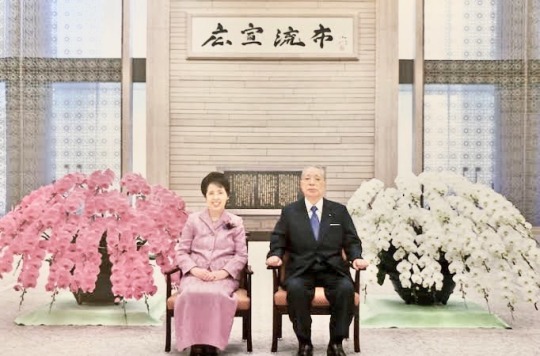
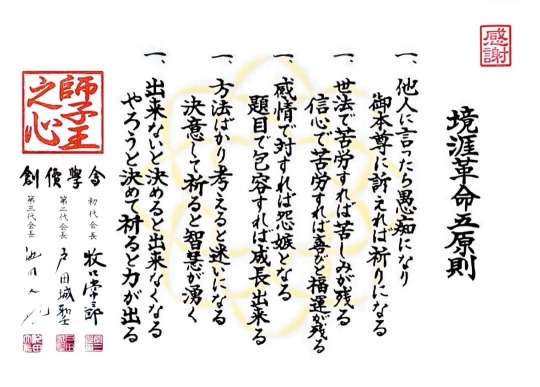
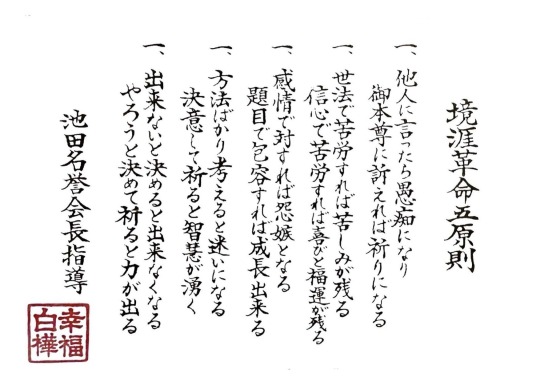
合掌🙏🙏🙏

祈り🙏合掌 2024 .3.16『広宣流布記念日』おめでとう御座います㊗️
THE CONSTITUTION OF THE SOKA GAKKAI
PREAMBLE
Buddhism was first expounded by Shakyamuni Buddha. The Lotus Sutra, the essence of Mahayana Buddhism, clearly illuminated the way for all living beings to attain enlightenment. Nichiren Daishonin, the Buddha of the Latter Day of the Law, revealed the fundamental Law that is the heart of that sutra as Nam-myoho-renge-kyo. He went on to establish the means for the enlightenment of all humankind into the eternal future by giving concrete expression to Nam-myoho-renge-kyo as the Three Great Secret Laws. He also called for the realization of worldwide kosen-rufu.
The Soka Gakkai was founded on November 18, 1930, by Tsunesaburo Makiguchi and Josei Toda, his disciple with whom he shared a complete unity of purpose. They served as the organization’s first and second presidents, respectively. The Soka Gakkai is a religious organization fulfilling the unique mission of actualizing the Daishonin’s call for worldwide kosen-rufu, in exact accord with his teachings. It is the sole organization that embodies the vast compassion of Nichiren Daishonin and is spreading the Law amidst the challenging realities of life in the Latter Day of the Law. It was for this reason that Toda Sensei declared that it would be recorded as “Soka Gakkai Buddha” in the Buddhist scriptures of future ages.
Through a profound karmic connection, Makiguchi Sensei started to practice Nichiren Buddhism. He came to see it as a guiding principle for daily life and a source of value creation. Together with Toda Sensei, he began to actively propagate Nichiren Buddhism in order to achieve kosen-rufu. During World War II, Makiguchi Sensei remonstrated with the militarist government that had implemented a policy of compulsory worship of State Shinto. As a result, he was persecuted and imprisoned by the authorities, and ultimately died in prison. By laying down his life for his beliefs, Makiguchi Sensei left for future generations an example of the spirit of selfless dedication to propagating the Law.
Toda Sensei was imprisoned along with his mentor and, while in prison, awakened to the truth that the Buddha is life itself and realized his identity as a Bodhisattva of the Earth. After the war’s end, he set to work on rebuilding the Soka Gakkai. Propounding the principle of human revolution, he began the task of reviving and renewing the significance of Nichiren Buddhism in the contemporary world based on his understanding of the true nature of life. When he was inaugurated as the second Soka Gakkai president, he vowed that the Soka Gakkai would without fail accomplish kosen-rufu. He initiated that effort by enshrining at the Soka Gakkai Headquarters, as “the banner of propagation of the Lotus Sutra,” the gohonzon (object of devotion) bearing the inscriptions “For the Fulfillment of the Great Vow for Kosen-rufu through the Compassionate Propagation of the Great Law” and “To be enshrined permanently within the Soka Gakkai.” Achieving his lifetime goal of 750,000 member households, he established the foundation for kosen-rufu in Japan.
Third Soka Gakkai president, Daisaku Ikeda, declared his intent to take the leadership in kosen-rufu as a disciple fully sharing the spirit of Toda Sensei and initiated a dynamic new phase in the development of the organization.
In Japan, Ikeda Sensei achieved unprecedented growth in terms of propagation and membership, building a new popular force comprised of individuals awakened to their mission for kosen-rufu. He also realized all the plans and visions set out by Makiguchi Sensei and Toda Sensei, creating a wide-ranging and multifaceted movement for peace, culture, and education based on the principles of Nichiren Buddhism. Through undertaking pioneering initiatives in diverse spheres, he has established the Soka philosophy of value creation as a leading presence in society and the era, thus making kosen-rufu a tangible reality.
Immediately following his inauguration, Ikeda Sensei began to travel the globe, sowing the seeds of the Mystic Law, fostering capable individuals, and building the foundations for worldwide kosen-rufu. On January 26, 1975, he established the Soka Gakkai International (SGI) as an international association of the Soka Gakkai, comprising constituent organizations in countries and territories across the globe. At the same time, he began engaging in dialogues based on Buddhism with leading world thinkers, delivering addresses at renowned universities, and authoring peace proposals, all in the effort to pursue a universal philosophy of humanism and build a network of people of good will committed to peace. Ikeda Sensei’s achievements in opening the great path of worldwide kosen-rufu are without precedent in the history of Buddhism.
The three founding presidents of the Soka Gakkai—Makiguchi Sensei, Toda Sensei, and Ikeda Sensei—are the eternal mentors of kosen-rufu, having appeared in this world with the mission to realize the Daishonin’s call for worldwide kosen-rufu. The spirit of oneness of mentor and disciple and the practice of selfless dedication to propagating the Law demonstrated by the founding presidents represent the “Gakkai spirit” and serve as a timeless model for all Soka Gakkai members. The Soka Gakkai, originating in Japan and now encompassing the entire world, embodies this spirit in every endeavor.
Ikeda Sensei proposed building a center of faith and practice for the Soka Gakkai in Shinanomachi, where Toda Sensei had led the movement for kosen-rufu and the enduring place of origin for the Soka Gakkai’s efforts for kosen-rufu imbued with the mentor-disciple spirit of the three founding presidents. He named this the Hall of the Great Vow for Kosen-rufu.
On November 5, 2013, Ikeda Sensei presided over the enshrinement of the Kosen-rufu Gohonzon at the official opening of the Hall and offered prayers for the realization of the great vow for worldwide kosen-rufu throughout eternity in the Latter Day of the Law. In this way, he offered a model and example to his disciples worldwide of making a profound pledge to propagate the Mystic Law globally and into the eternal future.
Members from throughout the world, regardless of differences of nationality, gender, or age, gather in the Hall of the Great Vow for Kosen-rufu and—uniting in spirit with the three founding presidents, eternal mentors of kosen-rufu—pray for the happiness and prosperity of humankind, for world peace, and for their personal human revolution, pledging together to advance worldwide kosen-rufu.
Ikeda Sensei has expressed the identity and mission of the Soka Gakkai in a calligraphy as “Nichiren Sekai-shu Soka Gakkai” (Nichiren World Religion Soka Gakkai), indicating that the Soka Gakkai is the organization carrying out the Buddha’s intent and decree, fulfilling the unique mission of widely propagating Nichiren Buddhism throughout the world.
Looking to the future of worldwide kosen-rufu into the twenty-third century, Ikeda Sensei shared his grand vision of establishing Shinanomachi as the Soka Gakkai’s global headquarters and entrusted its realization to his disciples throughout the world, under the leadership of each successive president.
Honoring the three founding presidents as the eternal mentors of kosen-rufu, the Soka Gakkai is committed to fulfilling the great vow for worldwide kosen-rufu with faith that manifests the spirit of “many in body, one in mind,” and in accord with the global, future-oriented vision that Ikeda Sensei has set forth.
人間革命に創価学会の精神の正史がある⬇︎
ダウンロードページです。
https://drive.google.com/file/d/1AnsNTKYjV4GQwmYQRgomU672UvB0mTjw/view?usp=drivesdk
ダウンロード印刷⬇️

#創価学会#soka gakkai#seikyo#南無妙法蓮華経#池田大作#戸田城聖#牧口常三郎#人間革命#日蓮大聖人#聖教新聞#御書#広宣流布#法華経#iphone#windows#Google#Apple#fecebook#tiktok#Twitter#YouTube#Instagram#chat gpt#AI#sgi#大百蓮華#世界平和#soka#nam myoho renge kyo#daisaku ikeda
2 notes
·
View notes
Text
Navratri 2023: Know Interesting Facts About Navratri, Its History & Importance
Navratri is a major Hindu festival according to Indian mythological and religious significance, which is celebrated every year in the months of Magh, Chaitra, Ashadh, Ashwin from Pratipada to Navami. The word Navratri means 'nine nights'. Nine forms of Shakti are worshiped during these nine nights and ten days. The tenth day is famous as Dussehra.
The festival of Navratri is mainly celebrated twice a year, one in Chaitra month and the other in Ashwin month. According to the calendar, Shardiya Navratri starts every year from Pratipada Tithi of Shukla Paksha of Ashwin month and continues till Navami Tithi. .
On the occasion of Navratri, Durga Maa Idol is installed, and Garba and Ramlila are also organized during Navratri at many places. On the first day of this great festival, Ghat is established in the form of Kalash Sthapna. During the nine days of Navratri, the nine forms of Maa Durga are worshiped with full rules and Maa Durga Aarti is performed, and fasting is also observed, and on Dashami Tithi, Durga Maa Murti ends with immersion.

This year, Shardiya Navratri will start on October 15, 2023, end on October 23, 2023 and Dussehra will be celebrated on October 24.
History of Shardiya Navratri
One day during the Lankan war, there was an atmosphere of worry in Ram ji's army, on the other hand, there was a wave of joy in Ravana's camp. At that time, seeing his commander worried, Jamwant ji asked Shri Ram, "Lord, the reason for your worry." What if one day Ravana gets the upper hand in the war? You have the same quiver and the same bow, maybe tomorrow we will have the upper hand in the war.
Then Shri Ram said that the reason for my worry is something else, I have seen Shakti fighting on behalf of Ravana and how can we be victorious if there is Shakti, maybe he has worshiped Shakti, then Jamwant ji said that you should also worship Shakti and should respond to worship with worship only.
Then Lakshman ji was made the commander for the next day's war and Shri Ram asked Hanuman ji to pluck 108 blue lotuses from the river and Ram sat in meditation.
When the ninth day of Ram ji's meditation came, Shakti thought of testing Ram ji to see how much attention Ram ji had towards his goal. On the ninth day, when Ram ji was about to offer the 108th lotus, he noticed that the last lotus was missing from the plate. Then Ram ji decided that he would not leave the puja incomplete. He said that in childhood my mother Kaushalya used to call me Rajeev Nayan.
Therefore, now I have two more lotuses, I will complete my puja by dedicating one of my eye, then as soon as Ram ji took out the arrow from the quiver, Shakti appeared and had held Ram ji's hand and gave him the boon that he would be victorious in this war. Then on the tenth day when there was a war between Shri Ram and Ravana, Ram ji killed Ravana and we celebrate that day as Vijayadashami or Dussehra.
Other Stories
According to another story related to this festival, on this day Maa Durga had killed Mahishasura. According to mythology, Mahishasura did penance from Brahma Ji and asked him for a boon that neither any human being, god nor any animal could kill him. After getting this boon, Mahishasura attacked heaven and within no time he conquered all three worlds and became the ruler of three worlds.

As a result, all the gods, troubled by the atrocities of Mahishasura, went to Lord Vishnu. Then Lord Vishnu advised him to pray to Mata Shakti. As a result of the prayer, Shakti appeared and then gods Brahma, Vishnu, Shiva, and Indra, etc., offered their weapons to the Goddess, and then the Goddess killed Mahishasura.
Importance of Navratri
Navratri, famous as 9 special nights, the word 'Ratri' is considered a symbol of Siddhi. This time is considered to be the main occasion for worshiping the nine forms of Shakti. The nine forms of power are as follows:
Shailputri
Brahmacharini
Chandraghanta
Kushmanda
Skandamata
Katyayani
Kalaratri
Mahagauri
Siddhidatri
There are 4 Navratri in each year, in which Sage & monks have made the rule of worshiping during Navratri twice a year. Navratri is celebrated from the first day of Vikram Samvat, i.e. from Pratipada of Shukla Paksha of Chaitra month to Navami, i.e. for 9 days. Exactly 6 months later, from Pratipada of Shukla Paksha of Ashwin month till Mahanavami, i.e. a day before Vijayadashami, the Goddess is worshiped. This Navratri is considered more important from the point of view of accomplishment and sadhana. On this occasion, people observe various types of fasts, restraints, rules, yagyas, bhajans, pujas and yoga-sadhana etc. to increase their spiritual and mental strength.

Mainly, the worship of Shakti has been going on since ancient times. In fact, the account of Devasura Sangram in Shrimad Devi Bhagwat Mahapuran refers to the origin of Durga, the confluence of the powers of all the gods who gathered to save the divinity from the demonic powers, and it is called as durga puja.
There are three types of qualities pervaded within our consciousness – Satoguna, Rajoguna, and Tamoguna. Naturally, the celebration of this consciousness is called Navratri. During these 9 days, the Tamoguni nature is worshiped on the first three days, the Rajogun nature is worshiped on the second three days, and the Satoguni nature is worshiped on the last three days. On the last day, we celebrate Vijayotsava as we reach the Trigunatit state, beyond the three gunas, and celebrate victory by vanquishing lust, anger, pride, greed, and other demonic tendencies.
Some Interesting Facts Related to Navratri
Why is the Goddess Considered to Have Eight Arms?
Maa Durga has been described in the scriptures as having eight arms and at some places as having ten arms. There are eight important directions in Vastu Shastra, although at many places ten angles or ten directions are also mentioned. These directions are as follows: Prachi (East), Pratichi (West), Udichi (North), Avachi (South), Ishaan (North-East), Vayu (North-West), Agniya (South-East), Nairutya (South- West), Urdhva (towards the sky), and Adharasta (towards the underworld). At some places, the direction of sky and hell is not given the status of direction, and for this reason only eight directions are considered at some places. According to Hindu scriptures, Goddess Durga protects her devotees from all directions, and that is why she has eight arms.
Why Ride on a lion?
The goddess's vehicle is a lion. The lion is seen to be associated with incredible power, and it is believed that Goddess Durga riding on the lion brings an end to suffering and evil.
Why is Navratri Celebrated at the End of Pitru Paksha?
Pitru Paksha is followed by purification of the house, and after this comes the arrival of Devi Paksha, called Navratri and also the beginning of all kinds of other festivals. It is believed that on the first day of Devi Paksha, Maa Durga starts traveling towards the earth.
Why is Kanya Pujan Done During Navratri?
In Hindu religion, Kanya Puja is organized on Durga Ashtami and Navami Tithi of Navratri festival. On this day, there is a tradition of inviting nine girls below 10 years of age to their home and serving them food. According to beliefs, worshiping Kanya and Batuk on the day of Kanya Pujan pleases Mother Bhagwati and bestows blessings of wealth and prosperity. It is said in scriptures that on this day, devotees get special benefits by feeding food to girls according to age.
Why Organize Garba Raas and Dandiya During Navratri?
In Navratri, Garba Raas and Dandiya are organized on the occasion of Durga Ashtami and Mahanavami. It symbolizes unity, respect, and joy in the society and it is a symbol of celebration as well as devotion to Goddess Durga.
Conclusion
From this article about Navratri, we learn that it is an important festival of Hindu religion which is celebrated every year in the month of Chaitra and Ashwin. Its importance is because at this time, nine forms of Maa Durga are worshiped by installing Durga Maa Statue or Photo and on the day of Vijayadashami, Ram's victory over Ravana is celebrated. Is. Through this festival people increase their spiritual and mental strength and achieve victory against evil forces. Along with this, we also get the unique importance of worshiping the goddess in her eight-armed form and the significant meaning of riding a lion. Through Kanya Puja, we honor young girls.
Organizing Garba Raas and Dandiya during Navratri is a sign of unity and joy. Through this festival we all remember the importance of Shakti and by worshiping their we welcome new power in our lives. Along with Navratri, we also remember the heritage of Indian culture and try to keep it alive in today's time. This festival is a symbol of unity, respect, and happiness and helps in moving our society towards prosperity. From our side, wish all of you a very Happy Navratri!
0 notes
Text
All About Sapphire Gemstone: Colours, Cuts, and Variations
Blue, Yellow, and Red are the three main colors that Sapphire Gemstone can be found in. In addition, the color spectrum can be divided into a wide variety of additional colors and color nuances, ranging from light to dark. The trace components in the mineral corundum give sapphires their color. Iron and titanium are the main components of traditional blue sapphires. Chromium is an extra element that gives corundum its pink hue. The presence of more chromium turns a sapphire more reddish, turning it into a ruby.
With over 30 years of experience as exporters and wholesale suppliers of gems and one of the finest collections of different quality cut and loose gemstones that are recognized internationally, Giri Corporation is one of the most important precious and semi precious gemstone traders who trade different types of Sapphire Gemstone.

The first image that comes to mind when someone thinks of sapphires is a deep blue hue. However, natural gemstones are available in nearly all colors of the rainbow including pink, rose, violet, yellow, orange, green, blue-green, and white (colorless). Padparadscha sapphire is the rarest sapphire color and a unique rarity. It is a special color combination of pink-orange or orange-pink. There are also "color-changing" and "two-color" sapphires.
Padparadscha Sapphire:
The word "Padparadscha", which in German means "lotus flower," has its roots in the Sri Lankan tongue of Sinhala. The Padparadscha Sapphire, like the flower from which it gets its name, mesmerizes onlookers with a special play of colors that are closely related to the island of Sri Lanka and the culture of its people.
Padparadscha is sometimes referred to as a "Salmon Color," and its hue has been likened to the warm sparkle of a Sri Lankan sunset. The stunning Padparadscha color is the least common sapphire color, and as a result, Padparadscha sapphires frequently sell for values that are significantly higher than those of sapphires with more common colors.
The term "Padparadscha sapphire" was used to refer to a variety of yellowish-orange and reddish-orange sapphires. Today, the majority of reputable gemological labs agree that only stones that fall within a specific, well-defined range of "Pinkish Orange" to "Orange-Pink" colors with low to medium saturation still have the right to carry this honorable name.
In addition to meeting the standards for color and saturation, a Padparadscha sapphire must also have an even spread of color and not have undergone any additional processing beyond simple heating.
King of sapphires
The color of padparadscha is an orange-pink mixture. However, there isn't just one shade of padparadscha; rather, the color ranges from orange-pink to pink-orange. Sri Lanka was regarded as the only legitimate nation of origin for Padparadscha sapphires for a very long time.
But recently, gems have been discovered in Tanzania, Madagascar, and Vietnam that have been considered to possess the saturation and color necessary to merit the name Padparadscha sapphire. For this incredibly uncommon and exotic sapphire color, it is also common to hear the name "Padparadscha, the king of sapphires".
Fancy Sapphires:
A corundum of gem-quality that isn't strictly ruby, blue, or colorless is referred to as a fancy sapphire. An endless variety of colors can be found in the mineral corundum. If it is red, it is referred to as a "ruby," if it is blue, it is referred to as a "sapphire," and if it is translucent, it is referred to as a "white sapphire" or leuco sapphire.
The term "fancy sapphire" is used to describe all other colors of gem-quality corundum. In a wider sense, fancy sapphires refer to any sapphire that is not blue and is sold on the market. Pink, orange, yellow, green, purple, and violet are the colors of fancy sapphires, according to this description.
Pastel Sapphires:
All sapphires are available in pale pastel or pastel-colored hues. These hues are distinguished by light tones and minimal saturation. For instance, the color pastel blue originates in Sri Lanka, Burma, Kashmir, Madagascar, Tanzania, and Montana (USA). In recent years, pastel diamonds have grown in popularity. They are particularly well-liked jewelry among younger jewelry enthusiasts, in part because of their glow and brightness, which give them a "fresh" and "modern" appearance.
White Sapphires:
Colorless sapphires are also known as "white sapphires," "colorless sapphires," or "leuco sapphires." These pure white sapphires are an alternative to white diamonds; they can be extremely pure, have a different refraction, and are much less expensive in bigger carat counts. White sapphires with a delicate tint, also known as "Champagne" sapphires or sapphires with a champagne tone, are very beautiful.
Here, however, it is important to note that the term "champagne" cannot be precisely defined and does not denote a particular shade of sapphire because it is also frequently used to refer to light yellow, orange, or pink sapphires, the latter of which resembles a very light "peach" or morganite color.
Get in Touch, white Sapphire Gemstone that have a faint blue, yellow, or pink tint are also known as "white-blueish," "white-yellowish," and "white-pinkish," and they are also lighter than sapphires with pastel hues. They are more uncommon than pure white sapphires and mostly come from Sri Lanka.
They have a special charm and a distinctive color shine. The appearance smoothly changes from being completely white in direct sunlight to the corresponding light shade or hue that is more noticeable in the shadow.
0 notes
Note
Prompt day hurray! What does BaXia think of ChenQing? They would have crossed paths in the war, right? What do all the other weapons and instruments think of WWX apparently setting aside SuiBian for ChenQing? Can THEY tell he's got no golden core?
ao3
You seem kind of evil, Baxia remarked when she first met the flute.
Yeah? The flute responded without first bothering to extend her perceptive aura out to see who was talking to her, sounding like a little punk, arrogant and bold. Well, you seem kind of – oh fuck oh fuck you’re terrifying!
This was true. Baxia was terrifying.
Please don’t destroy me! My master needs me!
Baxia said nothing, enjoying how the flute squirmed, and nudged her own master pointedly.
Do not destroy the flute, her master responded with a sigh. He knew Baxia well. Her master is on our side.
Truly, war made for strange bedfellows. Baxia mourned the loss of the easy, straightforward night-hunt.
She nudged her master again.
Yes, fine, you can chase.
Her master - loving, wonderful, understanding master that he was - very casually walked across the room, unhooked her from his back, and put her down next to where the flute was hanging off her master's belt.
Chase, Baxia said happily, the aura of her power already spreading beyond the confines of her blade. Chase, chase, chase –
Someone help meeeeeee!
-
You’re kind of a dick, Chenqing said, having finally realized that Baxia had no intention of destroying her incipient spiritual soul. Anyone ever tell you that?
Yes.
…really? Who dared?
My master.
Your master is badass. Chenqing contemplated for a moment. So is mine, he's very brave, even suicidally brave, but not – you know – that much.
Baxia considered this, and accepted it. Her master was indeed a superior sort of human.
Why do you smell of death? she asked, mildly curious.
My master uses me to direct resentful energy, so I’m affected by its aura. You?
I bathe in it.
…you're so badass.
Yes. Baxia was.
You’re not bad, she told Chenqing, which almost predictably got a little huffy.
I raise armies of the dead! I am terrifying! They call me the phantom flute! I am more than 'not bad', okay?!
Baxia ignored Chenqing's nonsense. It would not take long for her to realize that being called ‘not bad’ by Baxia was a very high compliment, as such things went.
-
Are there any swords that aren’t afraid of you? Chenqing asked. She was very chatty. Or sabers. Or musical instruments…
Which musical instruments have you met?
Uh, mostly Wangji? Wangji’s cool.
Baxia occasionally wished for eyes so that she could roll them. Her human got a great deal of relief out of doing that, according to him. Wangji has a temperament of ice, yes.
No, I mean, that’s not what I meant, I – wait. Are you making a joke right now?
Baxia said nothing.
You have a sense of humor?!
Baxia said nothing.
This is ridiculous. It’s like meeting a hurricane with sharp teeth and finding out it also likes to sing bawdy brothel songs.
You’re kind of stupid, Baxia observed.
Well, yeah. I mean. Have you met my master?
Baxia had.
He’s only scary by accident, Chenqing said ruthlessly, which was only to be expected – no one dunked on a human like their spiritual weapon. Inside, he’s a big soft squishy meatball.
My master cries when he has feelings.
My master too! Humans, am I right?
Baxia supposed Chenqing was, in fact, right.
Perhaps she could stay.
-
It’s not that I don’t appreciate everything Wei Wuxian is doing for us, Baxia's master remarked to her one day. But didn’t he have a sword at one point? The one with the ridiculous name – Suibian.
At the next meeting, Baxia asked.
Suibian? Yeah, master doesn’t use him anymore, Chenqing said. It's a bit sad, actually. He can’t access the spiritual energy in the blade anymore.
Baxia didn’t like the sound of that. How come?
Master doesn’t have a golden core, Chenqing said. I think he used to, but he doesn’t anymore.
Seems careless.
Hey, I’m pretty sure it’s not his fault! Anyway, it’s a whole big secret. Why do you ask?
My master wanted to know.
Hah, Chenqing said. Nice of you to ask on his behalf, since you can’t tell him what the result of your question was.
Baxia said nothing.
You – can’t. Right? Masters can’t hear what swords say.
I, Baxia said, am not a sword.
…oh shit. Shit, no, you can’t –!
-
“We need to talk,” Baxia’s master said to Chenqing’s. “In private.”
You’re a rotten tattletale, Chenqing said.
Why do you care? He won’t know it was you that squealed.
Yeah, well, I know that I did it!
It’s for the best. My master will be nice about it, and your master will feel better for it. Baxia considered. There may be tears.
There were many tears.
Master really does seem like he feels better, Chenqing observed. I wouldn’t have called that.
Told you so.
-
So, Chenqing said. This hunt is probably the last time we’ll be able to hang out.
Probably, Baxia agreed.
I was hoping to ask for some advice.
Bichen is amendable to your flirting, and Wangji follows where she leads, so you have a shot.
I – what? That wasn’t what I was going to ask.
Baxia waited.
…wait, are you serious? Will that work? I could do that –
-
The flute’s an idiot, Baxia told her master. But maybe she and that master of hers can help you here.
It would be inappropriate for me to ask, her master said, rubbing his eyes. The Jiang sect kicked him out, remember? It would be stepping on their face to approach him despite that.
Okay, Baxia said. So step.
Baxia…
You share a secret with him, at his request, she pointed out. He owes you for keeping it secret for him. At minimum, even if he can’t help you right now, he can help protect your brother when you’re gone.
Her master was silent. That was his weak spot, and had always been.
No one would be able to know, he finally said. And Meng Yao comes every week.
Is our home so small that we can’t hide someone from Meng Yao’s sight? Baxia said scathingly. Since when is he the master here, not you?
I just meant that he’s a sneak that’d sell me out to his father given half a chance, her master sighed. All right, I’ll see if there’s anything that can be done. Wei Wuxian is a musical cultivator, and a genius; maybe he can tell me why Clarity doesn’t seem to be having the impact we hoped it would.
Sure, Baxia said. Whatever. I don't really care. Just get help.
-
Well, that worked, Baxia said to Chenqing. Sort of.
How are you this badass? You just -! Singlehandedly -! I can’t – how?!
Calm down, Baxia advised. What are you, human?
How dare you.
You’re the one acting like you need air to speak.
…so I’m looking forward to seeing the Lotus Pier again now that we're not banished any more, Chenqing said, pointedly changing the subject because she was wrong and she knew it. Thanks for that.
Thanks for figuring out that the evil meat was poisoning my master.
That’s. uh. Sure a way to call someone.
Why not? He’s evil, and he’s made of flesh, and he’s going to be nothing but meat as soon as I have an opportunity.
I thought your master was thinking of some sort of confinement…?
He certainly has thoughts, Baxia allowed, purposefully broadcasting.
I have very strong thoughts, her master replied pointedly. Do not kill him on your own – I’ll only get the blame for that.
Oh no, Baxia told him insincerely. How terrible for you.
Baxia. Please.
Fine. What about Jin Guangshan?
…what about him?
Me and the flute are going to take care of him.
We are? Wait, are you talking to your master right now? Oh that’s so cool. Tell him to tell my master that I said hi.
Baxia would tell her master no such thing.
That’s probably not the right way to do that, her master said, but in that wavering tone of voice that suggested he was open to being convinced. Though it would be easier to sell Meng Yao as being only collateral damage in the scheme if Jin Guangshan took the lion’s share of the blame, which would only happen if he wasn’t around…that doesn’t seem right, though.
Sure it is, Baxia said soothingly. He’s the one who wanted to play with resentful energy, right? All we want to do is play with him back. Who can say no to that? He’s practically volunteered!
-
“Okay, I have a weird question,” Chenqing’s master said to Baxia’s. “Please don’t judge me. But…did we happen to work together to drive Jin Guangshan into a resentful energy backlash?”
“We did not,” Baxia’s master said.
“Okay. Right. Got it. Sorry, stupid question.”
“Our spiritual weapons did.”
“…what?”
“If you’re wondering why your Chenqing shows signs of use in the manner that would be associated with Jin Guangshan’s untimely demise, it’s because the resentful energy you’re using has been sufficient to allow it to cultivate in the direction of a guai,” Baxia’s master explained. “It has a will of its own now, just as Baxia does. You will need to account for that when you master it in the future.”
“Wait. Are you saying that my flute has, what, a personality? Can think and talk and do things on its own?”
“Yes.”
“That’s…that’s so cool. Can you tell Baxia to tell Chenqing I said ‘hi’?”
Why are they like this, Baxia’s master asked Baxia.
I don’t know, you’re the human expert, she replied, ignoring the way that Chenqing was happily chirping answers to her human’s questions even though he couldn’t hear her. Why are you all like this?
I don’t know, he said. I really don’t know.
-
It’s nice to meet you, Suibian said, sounding appropriately respectful. I appreciate your master finding a way for my master to continue to wield me.
It’s through resentful energy, Chenqing said gleefully. Lots and lots of it, refining the sword like a saber – my poor master’s going to have to stay up late and learn so many techniques, his hair’s all going to fall out.
Yes, Baxia said. I can see the resentful energy. There’s a lot of it.
Lots and lots, Suibian said proudly. I drew in everything I could.
Without sorting out the evil?
…isn’t it all evil?
Mm, not really, Baxia said, and began to extend out her aura.
Uh, Suibian said. What’s going on.
I told you to be more patient! You shouldn’t have taken the evil parts, Chengqing said. It makes you a little bit evil, too, and that makes you Baxia’s prey.
…prey?
Chase, Baxia said. Chase, chase, chase –
Help! Help – somebody help!
I would, Chenqing giggled. But master doesn’t speak flute. Sorry!
562 notes
·
View notes
Note
my problem with people who criticize wwx and say that we brush over his actions is that most of them do it while defending or ignoring literally almost every other characters' actions...I just think that if one's going to pinpoint wwx's shortcomings then they might as well do it with everyone else because, iirc, for every mistakes and wrongs he did (and I mean the ones that people keep bringing up) there's some other people who's done the same or even worse.....or maybe I'm just a bit more protective of wwx and maybe I wouldn't be so if the fandom doesn't sound like those irritating mob in the novel
I have been very heavily thinking on this ask so apologies for taking so long with making something cohesive that seems a bit less salty!
A big point of Wei Wuxian himself is that despite what his past actions may have been, he knows he can not change it, alter it or condemn anyone for their hate of him. He realizes this along with coming to terms that his own self-sacrificing tendencies were only a short term solution in comparison with to the later help he he received from Lan Wangji and Wen Ning. Because of their support and their protection, which he has never had before (despite all of Jiang Yanli's good will and Wen Qing's their first obligation was to their blood relations) he is able to reflect on himself and the reasons others may have held resentment for him, without major condemnation and judgement. They let him come to his own decisions without pressing as everyone else had for instantaneous results.
He does not ever deny others resentment, but he also finally admits self-sacrifice is nothing but a shallow short-term solution (analytically this is very pointedly referencing Jiang Cheng's continued reliance to clinging to a past that is gone and placing blame on a party that has no fault with Lan Wangji, and Wei Wuxian who by daoist ideology has paid his dues with his own death already by his own hand).
Wei Wuxian at the point of being stabbed and through Nie Mingjue's memories has admitted to his own faults in the past as well as admitting he dislikes his past self for his arrogance (which stemmed from his secrecy and reluctance for asking for help due to distrust in the wrong people). He has admitted to the audience his regrets and his own longing for maybe having done different with the flashback through the Lotus Pier fall and torture of Wen Chao. Lan Wangji has also grown to have realized his own faults and according to the juniors own comfort around him, has amended his past behaviors and harsh circumstances words to be seen as a confidant as a mentor and a continued beacon to civilians who are usually ignored by the greater sects.
The two blatant stagnation and worsening resentment is shown through Jin Guangyao and Jiang Cheng as respective mirrors to the leads. They had progressively worsened/ bettered themselves, one more subtly (Wei Wuxian/Jin Guangyao) and the other more overt (Lan Wangji/Jiang Cheng). Their dynamics are similar next to their moral choices eventually.
Wei Wuxian in particular is never supposed to be taken as totally in the wrong as was painted by the Jin Sect who had orchestrated his blackened reputation purposely where as Jin Guangyao's was done by his own hand due to his manipulations of others. By narrative purpose by the end Wei Wuxian's and Lan Wangji's "flaws" are very much morally lesser and superior to Jin Guangyao's and Jiang Cheng's due to simple admission and willingness to change and learn for the better for others they care for.
#mdzs#mo dao zu shi#lan wangji vs jiang cheng#wei wuxian vs jin guangyao#jin guangyao stans block me (。・ω・。)
32 notes
·
View notes
Note
i've debated with myself so much about madam yu and saw you rt that post defending her and i read it but it still didn't sit right with me, i'm not chinese but i am from one of those taugh love mom cultures and still find her extra bad, i asked a few chinese people who don't stan the book and they were horrified at the defense and said that it was not normal, sure she shows regular ch mom characteristics but she's like the hyperbole of a ch mom so does anyone own the monopoly of wha's normal?
Hi there anon,
This is only my pov and I cannot speak from the perspectives of Chinese and Chinese diasporic people, nor for the people who wrote on the topic of Yu-furen (I can only speak of how I interpreted the posts I came across).
My understanding of the situation, however, is that they are not attempting to do with these posts what you are suggesting. You ask “does anyone own the monopoly of what’s normal”, which suggests you believe the posts meant to give a definitive answer on what is ‘normal’ behaviour, when in reality the posts seem to have been made with the opposite aim in mind: to remind people who do not share the cultural background of the intended audience of MDZS that there does not exist a single definition of what constitute “normal” behaviour and that fandom discussions dissecting every single action or word of Yu-furen’s toward any character to portray them as “clear signs of abuse” has been difficult to stomach and might even feel imperialistic for people who have been raised by parents who came from a cultural background where some of these very behaviours are not regarded as abusive.
These posts, in general, have also seemed to attempt first to explain the nuances of Yu-furen’s relationship to WWX, which often gets wrongfully portrayed as her unequivocally being his adoptive mother or a legal guardian. She is not a mother figure to him and does not act toward him from that position. These have also aimed to remind people that the behaviours and care we feel are “owed” to “children” as a group are spatiotemporally specific, and influenced by a variety of factors--in this case, WWX being the child of a servant and a disciple of the sect. By reminding people that, in her position, in that specific spatiotemporal moment, Yu-furen would have been allowed to be much more extreme in her disciplining or could have simply refused to let WWX stay in Lotus Pier, what I feel these posters are doing is not telling Westerners that they personally think it would be appropriate behaviour towards a child, but rather highlighting that this means something wrt how Yu-furen is characterised in the context of the novel considering that the intended audience of the novel would be aware of that reality. Differently put, that it suggests a framing of Yu-furen as someone that does bark more than she bites even if she does bite. And aside from the irrelevant surface-level readings of Yu-furen as a sort of “girlboss” that seem to originate mostly from the CQL-verse in any case, I’ve never seen anyone suggest that she is irreproachable. All the serious analyses I’ve seen acknowledge that Yu-furen is meant to be a complicated figure or acknowledge that she abuses her authority in the sect by giving WWX punishments she does not bestow on other disciples. What they seem to disagree with is the ways western fans make sweeping generalisations and accusations without the relevant context, which comes off to them as insensitive and coming from a place of cultural ignorance.
Maybe it is time for a discussion that humanist thought, that which underlines so much of our modern understanding of rights and social progress, flattens spatiotemporal differences (or, as they often talked about, cultural differences), staying deeply rooted in Western supremacy when it aims to provide a single answer to what is right and what is a right. It can verge very easily into the evangelical and the imperialistic: we have only to look at the influence of the “global” LGBT movement has had on erasing localised social organisations and identity markers by superposing themselves unto them as more intelligible ideas through which to barter for rights with the political class. Or worst, by having the “global” LGBT movement frame localised expressions of queerness as not progressive enough or harmful (sometimes I think back at Gaudio’s ethnography of queer men in the Hausa-speaking region of northern Nigeria, and how the men who took on the penetrative role in sex generally switch to self-reference and being referenced in a feminine way and using “women’s talk”, and thinking “wow, they would be so cancelled or condescended to by tumblr kids 😬”).
The point of this tangent is not to underline that everything about humanism or its influences on modern life are bad, but that it is an intellectual “tool” that can be do harm and be imperialistic and racist (since it is generally the White, Christian-adjacent, Western standards that are posited as the moral truth that defies differences in cultures and material contexts). And most of the discussions of what “adults” owe to “children” (ideas that are generally treated as homogeneous and clear-cut across time and space, as apriori categories), of what rights are owed to children, exist within these frameworks. Or, they might exist within the framework of “science,” as if science itself cannot be influenced by Western imperialism and researchers’ biases. Reading western language acquisition research and comparing it with cross-cultural ethnographic sociolinguistic research on language acquisition really highlights how some of the science that informs “good parenting” in the West is incapable of realising how much the material and cultural context of the West influences the results that are supposedly controlled.
Or, again, the idea that science can help us define clearly and once and for all where the line between shitty actions and abuse, or discipline and abuse, should be drawn, is to me one that cannot be dissociated from a belief that science can provide us with definite truths about our existence as social animals as if these sort of truths were not inherently positioned and negotiated. It is an uncomfortable idea, isn’t it, to realise that two people can be against abuse but at the same time not draw the line at the same place? How do we best grapple with the discovery that “abuse” is not an apriori category but rather one that is constructed according to varying forms of positioned and shifting knowledge and experience? I do not have an answer, but I certainly think that fandom arguments will probably not be the best place for that level of philosophical discussions.
To conclude, anon, I do want to acknowledge that your ask seems to come from a place of concern and perhaps even hurt. And that is perhaps why the posts from Chinese diasporic people in the fandom might appear to you as dismissive or flippant towards the interpretations of other fans of the novel. But perhaps without this prism of concern and/or hurt through which your perception of these analyses are filtered, you might have been able to notice a lot more nuance to their points than what your ask suggests. And that is not a criticism per se, but simply a reminder that, sometimes, some topics are difficult for us to approach clear-headed and to receive differing perspectives in good faith. In any case, I am certainly not the arbiter whose opinion on the topic will finally settle these debates, as such you might want in the future prefer to direct your questions (politely of course) to people who penned such analyses or who can speak from the relevant cultural perspective. If your aim in sending me this ask (because I reblogged a post you disagreed with) was to judge whether I passed your litmus test for being “morally just” to decide whether anything I have to say on any other topic is still worth paying attention to, well I suppose you now have your answer.
76 notes
·
View notes
Text
FFXIVWrite Prompt #20: Petrichor
In among the many other large and small celebrations of the Doman Enclave’s refurbishment, Lord Hien proposed a juried incense judging as historical Doman lords had done to entertain their courts. Strix intended to politely decline her invitation; she enjoyed scent but had other, more urgent demands on her time. Hien made a sly, sidelong comment about the comparative merits of Eorzean and Othardian perfumery, and though she wouldn’t have taken obvious bait in any other circumstance, she felt obligated to put in a good showing.
At Nanamo’s suggestion, instead of digging into her repertoire of Thanalani ingredients and recipes, she looked to Ala Mhigo, and in particular to the Lochs for a local specialty undergoing renewed interest after a long period of decline. Quite different from the rose and lotus attars favored by the royal family or the careful blends of spice that traced their history to medicinal philters, the formula Strix had in mind was developed for devotional use by the meditating aescetics of the Fist of Rhalgr before being adopted for private enjoyment by secular folk. Gyr Albanian perfumers had devised a means to bottle the scent of an oncoming storm.
To distil attar of petrichor, mud hauled in by cartloads from maintenance of salt flats of the Lochs was washed, sieved, and laboriously kneaded by hand until only fine, silky, salt-studded earth remained. Flatbread-sized pucks of it were shaped and laid out to harden in the sun. They were carefully stacked, packed, and transported, by aetheryte when possible, overland by carriage when not, west to Ala Ganhha, whose snowmelt-fed river and stands of timber supplied some of the last steam-stills to escape the plundering hands of Garlemald and the King of Ruin.
The banked bronze kettles, large enough that a grown Roegadyn man could stand inside, were packed with the bricks of salt-earth, topped off with cold water, then enclosed with a lid that was hammered into place and further sealed with a plaster of earth and ox dung. When hardwood fires were lit in the trench beneath them, the resulting scented steam was driven through long tubes into receivers primed with fragrant, fixative sandalwood oil and sunk into a fast-flowing sluiceway for cooling.
Attendants carefully monitored and fed the fires, reprimed and replaced the receivers, and separated the contents into recondensed, lightly-scented water and highly fragrant oil. The latter was collected in jhalmel-hide flasks and baked again by sunlight or buried in hot sand to draw out any remaining traces of water.The result of all of that labor was a pale golden oil that, when uncorked, filled the room with the smell of drying salt, levin-charged air, and the first spattering drops that preceded a deluge of rain.
Petrichor attar could be diffused or worn as a solo accord or form the base note of more complex compositions. Strix faced a worktable filled with her bank of flasks, vials and pipettes, considered the possibilities, and started selecting her options. Destructively-distilled whelk shell, also from the Lochs, to give the composition a bit of smoky depth and a long life in the censer. Dimwold cypress, East-End cedar cedar, and Radiata sage for their sweet, woodsy heart. Finally, with a careful, sparing hand, Coldhearth heather and Rhalgr’s Stave.
She swirlded the contents together and dipped in a blotter to test. The blend would need time to rest and meld together, but she was happy to have made a start on bottling Ala Mhigan rain to bring to Doma.
3 notes
·
View notes
Text
Final PBIO/IOTNBO analysis and theory
This post is my final analysis and includes some questions I have as we go into the final weekend of one of the best dramas in history. It is VERY long as I consolidate and expand on my previous analysis and theories.
I also lost a big chunk of this post while I was working on the draft just a few hours before posting, resulting to this post as a little inconsistent. Excuse me if my points are messy and some points missing with some issues untouched (because I forgot 😭). I think most points can be linked back to my past theories so you can read up on them if you haven’t.
List of my theories before ep 14:
Do Heejae and the other woman
Moonyoung’s background and Go Daehwan
Head Nurse is NOT Do Heejae, she’s the previous housekeeper
Maybe Head Nurse really is Do Heejae
As usual, please note that anything I quote may be a mix of Netflix’s subs and my translation because I know Korean and Netflix tends to miss nuances sometimes.
Firstly, Park Ok Ran’s dead.
Let’s get this out of the way first. (You can read my first theory on her role in this whole saga.)
“She can’t come anymore.”
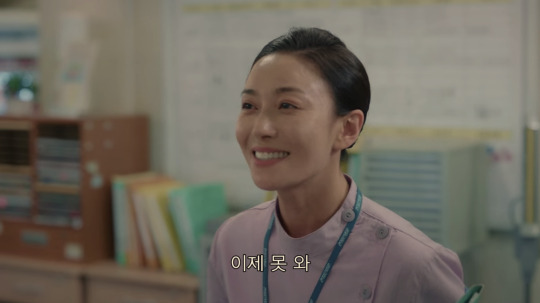
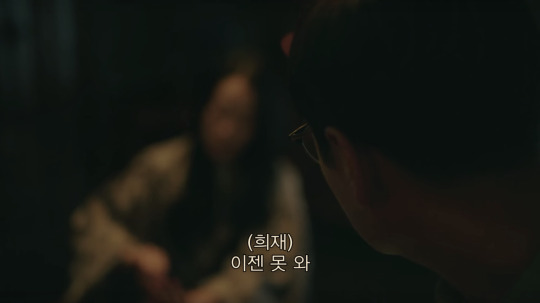
Can’t have her exposing Park Haengja. Or plot twist: she is alive and returns to save the trio from the villain 😆
No one’s memory is reliable
Not Kangtae’s as established in ep 6 that he didn’t remember his mother brought them to eat jjamppong because he’s the one who liked it, not Sangtae.
Not Sangtae’s. In spite of his good memory, it was established in ep 10 that he didn’t remember Kangtae saving him, so his memories can be flawed as well.
Therefore, not Moonyoung’s, and definitely not Go Daehwan’s.
There are few things that we can be sure because they are concurrent:
There was a female body in the basement that was disposed or disappeared.
The murderer of Taetae Bros’ mother wore Moonyoung’s mother’s a one-of-a-kind brooch.
There was a body in the reservoir.
Taetae Bros’ mother was the new housekeeper (I saw that some people disagree but here are the supporting screenshots).

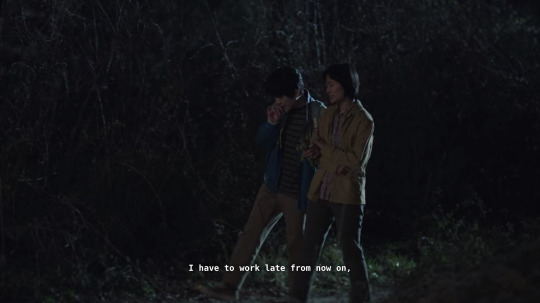
There were definitely two women
My theory that there were 2 women in Moonyoung’s family still stands and I’m expanding on it.
Let’s look at the family photos first. There are multiple versions of the family photo, and I suspect they were taken at different times. Here they are in what I think is the chronological order.
1) Photo in the basement: Go Daehwan had full-rimmed glasses, Moonyoung wore a scarf and stood closer to him with his hand on her shoulder, and the lady wore a fully black high neck top with the brooch on the right.

Before the family moved in, on the day Go Daehwan showed the lady around the house, he was wearing the full-rimmed glasses, and the house looked lived in (fully furnished, fully decorated, shelves full).
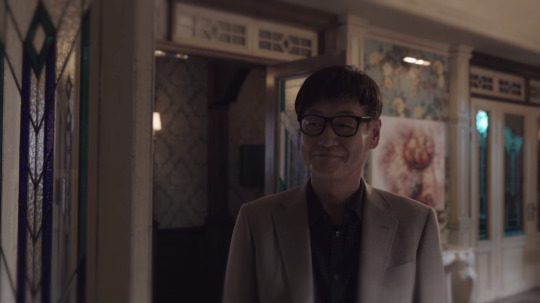
2) Go Daehwan’s photo: Go Daehwan had half-rimmed glasses, Moonyoung stood right in the middle and without the scarf, and the lady wore a blazer over a straight neckline blouse with the brooch on the right.
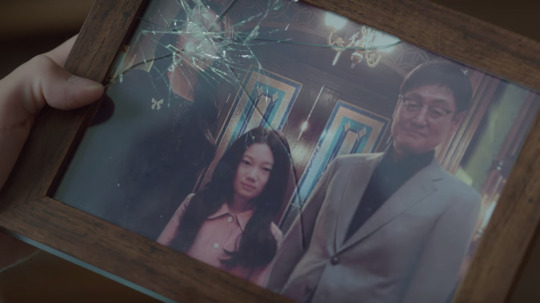
3) Park Haengja’s photo seems to be the same as Moonyoung’s: Go Daehwan with half-rimmed glasses, can’t tell whether Moonyoung was wearing a scarf or not but she sat nearer to the lady who wore the same blazer over a straight neckline blouse without the brooch.
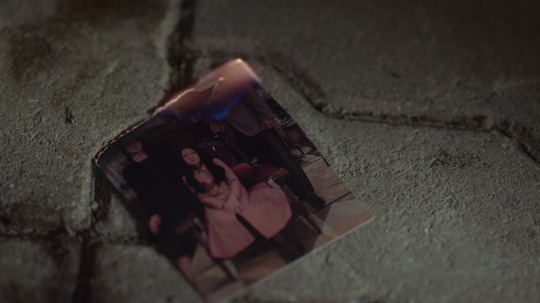
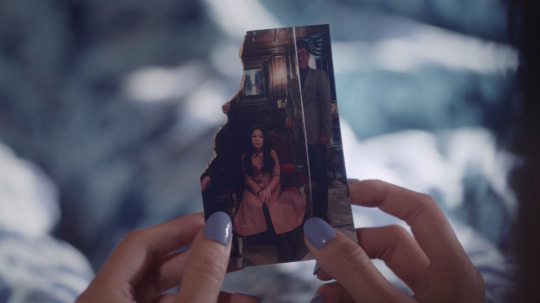
Go Daehwan had half-rimmed glasses when he realised his wife killed Taetae Bros’ mother.
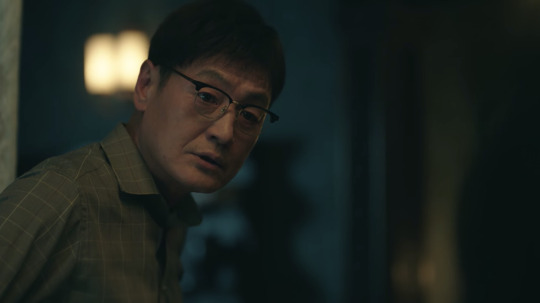
Photos are evidences of relationships. In a group photo, the people who are closer would pose closer to each other. These family photos tell us that Go Daehwan and Moonyoung were actually close, and showed us the progression of Moonyoung’s relationship with the woman.
But why were multiple photos taken? If they were the same woman, why are they still hiding the woman’s face in the photos?
When Go Daehwan killed his wife, he said, “If I die, my daughter will become a monster like you.”
Why was it “my daughter” and not “our daughter?” It’s even odder for Koreans because being a very collectivist society, they don’t claim people or objects as mine. They say “our country,” “our father,” “our daughter” to show unity even when they actually mean “my country,” “my father,” “my daughter.”
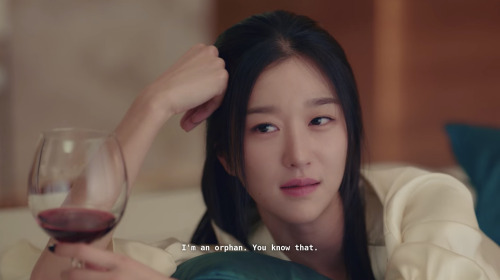
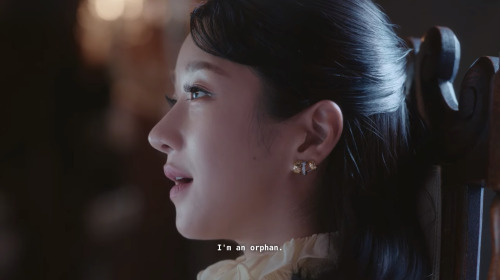
Moonyoung insisted she’s an orphan. Technically, when one biological parent dies, the child is an orphan (single orphan). So perhaps Moonyoung’s not wrong. And as explored in my second theory post, she might have been referring to her biological mother. The abusive woman was probably her stepmother.

Go Daehwan told Director Oh that his wife loved Moonyoung “terribly. Very terribly,” and we have Moonyoung who doesn’t want a child to not get jealous over Kangtae’s affection. Judging by the family photos (Moonyoung posing closer to the woman each time), perhaps the stepmother was jealous of the father-daughter relationship and became obsessed with Moonyoung.
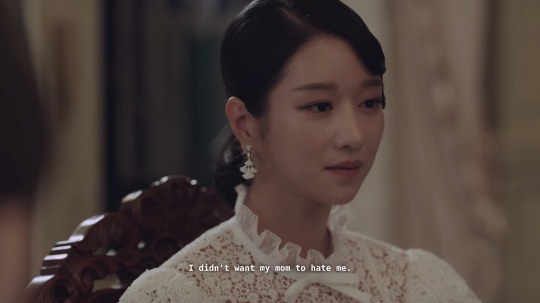
Would a child be afraid of their parent because they didn’t want to be hated? I was just afraid my mother would scold me (which was a lot). Right, we can argue that her mother was abusive, but this is something to think about.
Park Haengja: stepmother and crazy aunt
Bluebeard the French folklore, which ep 6 was based on, is about a man who married several times as he killed his disobedient wives. According to Wikipedia, his final wife had invited her sister and others over for a party before she snuck away to explore the forbidden room. Bluebeard found out and was about to kill her on the spot when her sister and brothers arrived to kill Bluebeard.
It was also in ep 6 when Taetae Bros moved in that they specifically had a shot of the dolls in Moonyoung’s old room (the brothers’ new room). I mentioned this previously: one male doll as Go Daehwan, two female dolls in similar dresses as Moonyoung’s mother and stepmother, and one small female doll.
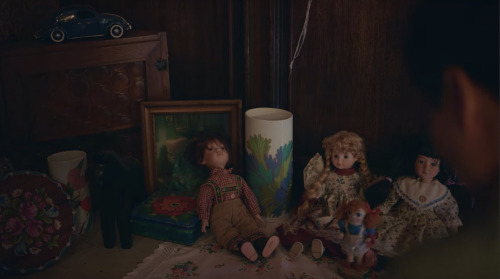
You can see the two dolls behind little Moonyoung in her memory of her father reading her a book.
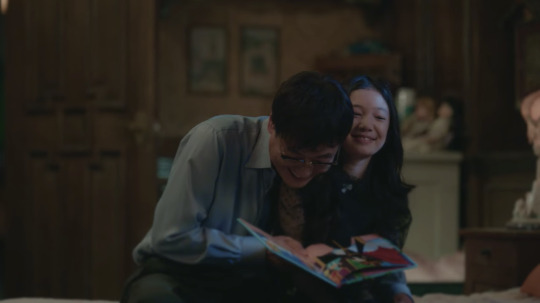
The dolls are a representation of the Go family in the house because in ep 7, only the small female doll (Moonyoung) was left, and I think there are 2 more new figurines as Taetae Bros on that cabinet but I can’t be bothered to search for a clearer shot 😁
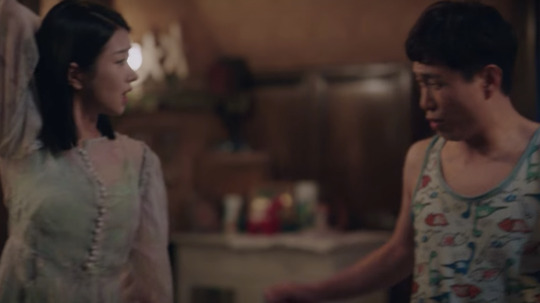
When Go Daehwan strangled little Moonyoung, afraid she would become like her mother, they featured one of the dolls in the shot.
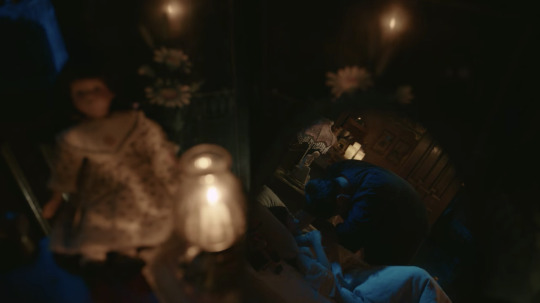
The point of mentioning the dolls is: Moonyoung’s mother wore a similar dress as the dolls in most of the flashbacks.
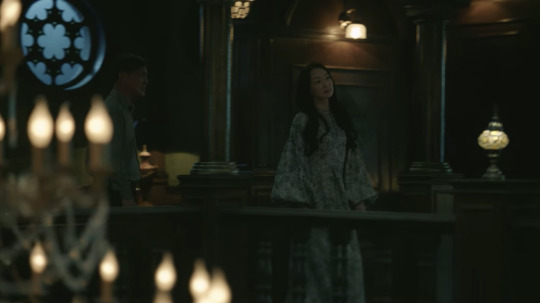
Ep 13 was based on the Korean folklore The Story of Janghwa and Hongryeon and its popular movie adaptation The Tale of Two Sisters (2003). IOTNBO has more links to this story than “the bystander is worse than the abuser.”
In the movie, Moon Geunyoung’s character frequently dressed in floral patterns (like the dolls’ and Moonyoung’s mother’s dresses).


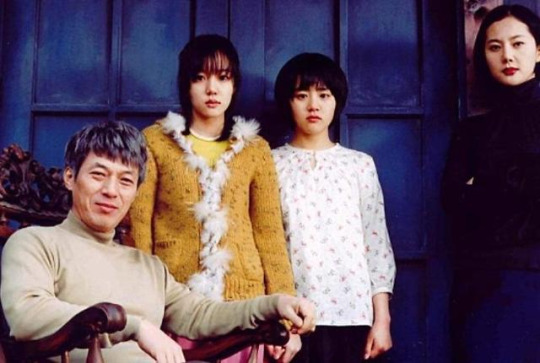
In both the folklore and the movie, the sisters were named after rose and lotus flowers. In the folklore, it’s the sister that died who was named after the rose flower. In the movie, it’s the surviving sister that was named after the rose flower. The rose is also a motif of Moonyoung’s mother.
The flower language of rose is love and passion. Personally, considering how Moonyoung always thought of her mother when she brushed her hair, and her love for a head pat, I think the rose also symbolises her mother’s "affection."
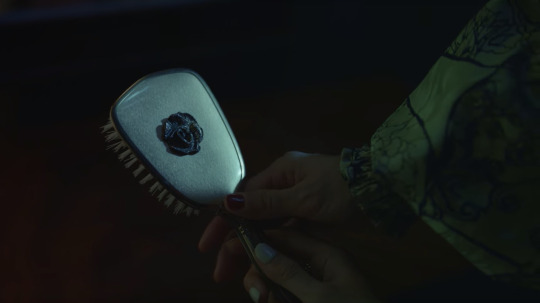
The movie is a story of two sisters who were abused by their stepmother so badly that one of them died. As it turns out, the remaining sister developed dissociative identity disorder (DID; the same disorder as the patient Yoo Sunhae) with two other personalities: her dead sister (Moon Geunyoung’s character) and her stepmother.
I take this as a lead that Moonyoung has a stepmother, who also happens to be her aunt obsessed with her sister. Wicked Witch of the West (WWOTW) coveted Wicked Witch of the East’s (WWOTE) ruby shoes; perhaps the aunt wanted to be in her sister’s shoes, figuratively AND literally.
Now here’s another “coincidence” from the same:
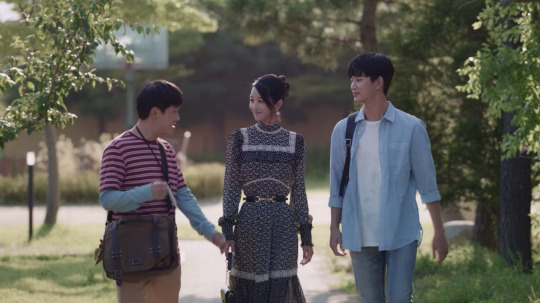

Left: Moon Geunyoung. Right: Im Soojung (sister with DID).
The story Go Daehwan read to little Moonyoung mentioned a bad wizard that wasn’t invited to the birthday party so he went to the castle.
The story Go Daehwan read to little Moonyoung mentioned a bad wizard that wasn’t invited to the birthday party so he/she went to the castle to cause trouble.
Glinda the Good Witch of the North described WWOTW as worse than WWOTE.
Go Daehwan, who had recognition and memory impairment, said his wife has an angelic face but a devil lives within. Perhaps he remembers two persons as one.
We learnt from Sangin that 1) Do Heejae came from a prestigious family of medical professionals, 2) she dropped out of 3rd year of med school, and 3) she cut ties with everyone in her family. Could she have a sister in nursing? Could she have cut ties with her family because they cray cray (or the good old "you’ll starve with a creative career")?
Park Haengja has not claimed herself as Do Heejae, and the woman in the family photos are still covered.
Following these, we can assume that Park Haengja’s the bad witch who is neither Do Heejae nor Moonyoung’s birth mother. She’s the stepmother and crazy aunt (I cover more about the sisters in the next section).
There’s always a crazy aunt or uncle.
It’s just too easy if Park Haengja really is Do Heejae. I’d also be disappointed in the writer if she takes this route because it’s cliché villain and this is not a makjang drama with illogical plot twists. It would also be a step back from all the efforts this show has been making to dispel stigma against mental illness.
So they were sisters and...
...one of them died. In water.
As per my first theory, the WWOTW and WWOTE are sisters in some adaptations of The Wonderful Wizard of Oz. WWOTE died under a house then disappeared into thin air, and WWOTW pretended to die in contact of water but she returned disguised as a good person. Sound familiar?
The Story of Janghwa and Hongryeon is a Korean folklore of a stepmother who abused two sisters to their death. She had her biological son push Janghwa the older sister into a pond and she drowned. The remaining sister couldn’t take the abuse any longer and drowned herself in the same pond.
The song “Oh My Darling Clementine” has a few variations but here’s the traditional lyrics (I removed repeated stanzas):
Oh my darling, oh my darling
Oh my darling, Clementine
You are lost and gone forever
Dreadful sorry, Clementine
In a cavern, in a canyon
Excavating for a mine
Dwelt a miner, forty-niner
And his daughter, Clementine
Light she was and like a fairy
And her shoes were number nine
Herring boxes, without topses
Sandals were for Clementine
Drove she ducklings to the water
Ev'ry morning just at nine
Hit her foot against a splinter
Fell into the foaming brine
Oh my darling, oh my darling
Oh my darling, Clementine
You are lost and gone forever
Dreadful sorry, Clementine
Ruby lips above the water
Blowing bubbles, soft and fine
But, alas, I was no swimmer
So I lost my Clementine
How I missed her! How I missed her
How I missed my Clementine
But I kissed her little sister
I forgot my Clementine
These stories are all about 2 sisters and dying in water. Whether they’re sisters or not, a woman died and she’s related to Go Daehwan somehow.
The Murder of the Witch of the West
Do Heejae’s novel hold huge clues. Here’s my translation of an excerpt from volume 9 shown in ep 10.
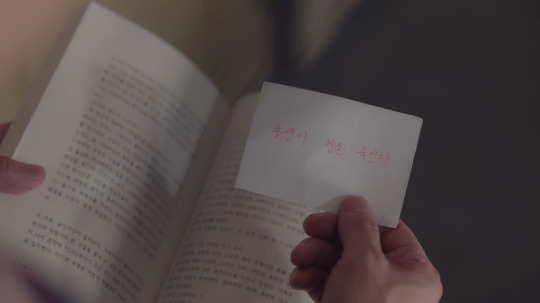
… __’s scalp skinned with a hunting knife without hesitation. The corpse’s lips sewed in a fence stitch. The body dismembered with a hand axe and thrown into the trunk. Yooyoung persistently as she watched the back of the West Witch leave unhurriedly after finishing the killing and leaving notes.
"Who the hell are you?"
"Why do you choose to kill happy people only?"
But as usual, there was no answer. Was it because of Yooyoung’s tenacity to catch the West Witch? Yooyoung always sees the West Witch at the crime scenes. A faceless woman who always observed Yooyoung work hard on finding the criminal before leaving abruptly. Yooyoung began to look at the crime scene from the criminal's perspective. Why here? Why kill by stabbing this way? As she simulates the crime, Yooyoung finds herself assimilating with the criminal. She felt a thrill from imagining that she stabbed and cut the victim. She’s getting confused. Is she a detective or a murderer?
Around the same time, a murder occurred. The West Witch mimicked a passage from The Wonderful Wizard of Oz, everything was in line with the Wicked Witch of the West, right down to the signature butterfly design. However, Yooyoung somehow felt guilty.
...
The suspect was a middle-aged woman in her 40s.
Yeah.
The misunderstanding
Othello killed his wife because he mistook his wife for committing adultery.
Romeo and Juliet mistook each other’s plan. Romeo died from drinking real poison, and Juliet faked her death before realising the mistake and killed herself with Romeo’s dagger.
Janghwa was framed and wrongfully accused by her stepmother for being unchaste. Her father believed it. When Janghwa ran away, her stepmother and stepbrother chased after her, and her stepbrother (under her stepmother’s instruction) pushed her into a pond to drown to her death.
What did Go Daehwan misunderstand? What misunderstanding did his recognition and memory impairment cause? Why was his wife being crazy but looked so shocked when he turned her around?
I do not believe that his memory of killing his wife is a complete memory because it has been mentioned multiple times that his memories are corrupted. I think it’s fragments of different memories pieced together.
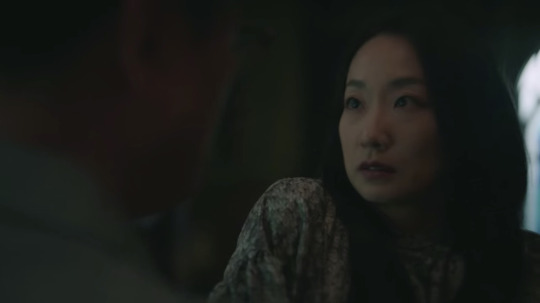
What’s going on with Park Haengja?
There are a few possibilities.
Park Haengja is Do Heejae’s sister who coveted her sister’s position and grew obsessed with her sister’s novel.
Do Heejae’s Moonyoung’s biological mother and Park Haengja’s her stepmother.
OR Moonyoung’s biological mother died when she was born, Do Heejae’s the stepmother (abusive but still her mother because she raised Moonyoung), and Park Haengja’s the obsessive aunt.
She got so obsessed she came to believe she’s Do Heejae.
So obsessed she was always keeping an eye on Moonyoung to fulfil the prophecy that is the novel. ("You’re my greatest creation," and volume 3, shown in episode 10 with Park Ok Ran’s copy, has passages that describes episode 3.)
Park Haengja’s the one who killed Taetae Bros’ mother (screenshots of Do Heejae vs murderer below).
She took advantage of Go Daehwan’s cognitive impairment and instigated him to kill the real Do Heejae. She’s the one who saw Go Daehwan kill the woman and hide her in the basement.
Do Heejae wore her butterfly brooch on right, the murderer wore it on the left. Do Heejae always wore red nail polish and a gold rose ring, the murderer did not (although she could have had them removed if it’s premeditated).
Moonyoung’s mother:
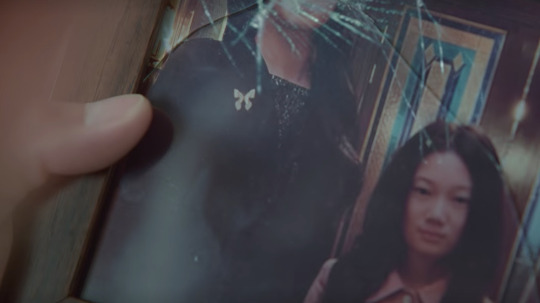
Murderer:
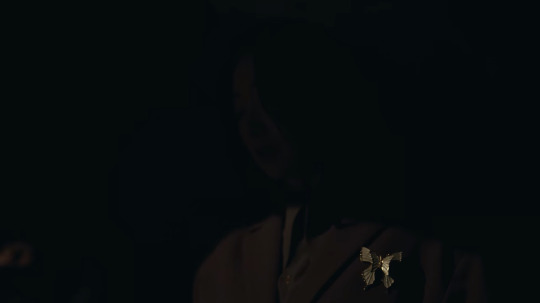
Moonyoung’s mother:
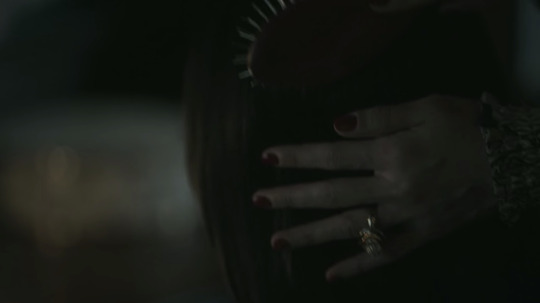
Murderer:
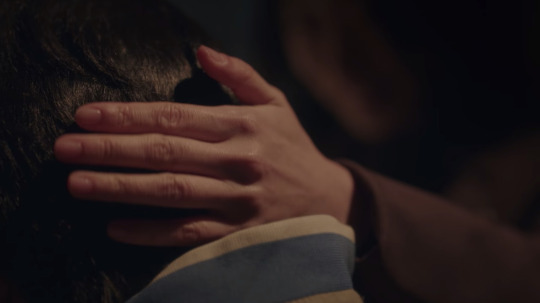
Clearly Do Heejae didn’t wear her brooch all the time, so it would have been easy to steal the brooch. However, Do Heejae wore her ring all the time, so Park Haengja can only get the ring after she dies and "truly” become Do Heejae.
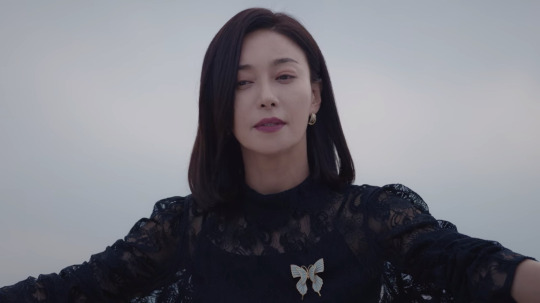
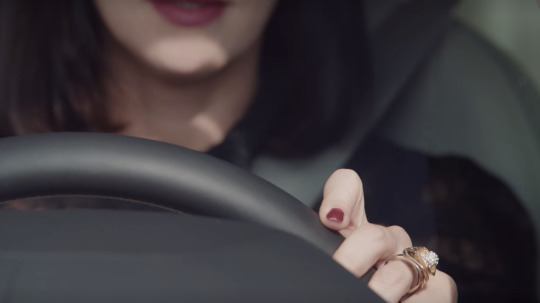
End.
I think I recovered most of my points but they’re still feel incomplete 😭
Let me know your thoughts 😊
#psycho but it's okay#it's okay to not be okay#kdrama#kim soohyun#seo yeji#oh jungse#jang young nam#i just refuse to believe she's do heejae#that's too simple for this drama
68 notes
·
View notes
Text
Sun Transit and Magic of Leo Decan 1 ~ July 22 - Aug 1, 2020


The Sun 🌞 will travel Leo ♌️ Decan 1, July 22 - Aug 1. Leo Decan 1 is ruled by Saturn 🪐 in the Chaldean order and by the Sun in Triplicity order.
This first decan is known as the Gate of Man, where souls enter into incarnation. Directly opposite where Saturn is right now in Capricorn is the Gate of Souls where man leaves his physical body. This is an industrious and prophetic section of the zodiac. The ability to mobilize ones forces is great here ~ with the results being highly spiritualized energy or highly ego-centric, self aggrandizement.
This decan contains the Fixed star Praesepe in the Beehive cluster and is traditionally linked with war like strategy. It also contains the fixed stars of Asellus Borealis in the constellation of Cancer. The name Asellus Borealis is Latin for, “The Northern Donkey.” This star pairs with its close neighbor Asellus Australis, or the “Southern Donkey.” These two stars were perceived as representing the donkeys that Dionysus ( Bacchus) and Hephaestus (Vulcan) rode into battle during the war between the Olympian Gods and the Titans. According to legend, the sounds made by the donkeys frightened the Titans, forcing them to retreat and secure the victory for the Gods.


This is also a caregiving portion of the zodiac symbolized by the Vedic Lunar mansion, Pushya, which means nourishing and is symbolized by a cow’s utter or lotus blossom. Leo Decan 1 is a bird or vulture decan and gives understanding of death and the afterlife. Those who have sensitive positions here may have an otherworldly understanding of the afterlife and ancestors.
With the current opposition to Saturn and Pluto, laws boundaries and dismantled old paradigms are about to have new leaders emerge from the past implosion of ashes …. defiant forward thinkers are about to say, “enough,” and the courage to step into the light will be granted …. But be careful for what you wish for … this decan is hot and those who come forth with me-centric Titan-esque agendas will get singed …
Magics Performed ~ of light and riches ...
Key of Solomon ~ Sun Talismans: Proper for perfecting experiments regarding wealth, hope, gain, fortune, dissolving hostility, making friends and divination.
Picatrix, Bk II, ch. 12 states: The first face of Leo is of the Sun in which make an image to acquire the love and benevolence of lords and for wolves, bears and wild beasts to collect in the place you wish.
Agrippa states : A man riding on a lion; it signifieth boldness, violence, cruelty, wickedness, lust and labours to be sustained.
Incense : First Face of Leo: frankincense
Angel: Michael, Angel of light. Virtue is Faith. Vice is Pride.The word of Truth.
#occult#traditional witchcraft#astrology#esoteric#witchblr#magick#witchcraft#witchcraft community#tarot#traditional astrology#medieval astrology#renaissance astrology#astrology forecast#diviniation#divination community#planetary witch#planetary clairvoyance#planetary magic#talisman#dionysus#vulcan#fixed stars
30 notes
·
View notes
Text
THE CONSTITUTION OF THE SOKA GAKKAI
PREAMBLE
Buddhism was first expounded by Shakyamuni Buddha. The Lotus Sutra, the essence of Mahayana Buddhism, clearly illuminated the way for all living beings to attain enlightenment. Nichiren Daishonin, the Buddha of the Latter Day of the Law, revealed the fundamental Law that is the heart of that sutra as Nam-myoho-renge-kyo. He went on to establish the means for the enlightenment of all humankind into the eternal future by giving concrete expression to Nam-myoho-renge-kyo as the Three Great Secret Laws. He also called for the realization of worldwide kosen-rufu.
The Soka Gakkai was founded on November 18, 1930, by Tsunesaburo Makiguchi and Josei Toda, his disciple with whom he shared a complete unity of purpose. They served as the organization’s first and second presidents, respectively. The Soka Gakkai is a religious organization fulfilling the unique mission of actualizing the Daishonin’s call for worldwide kosen-rufu, in exact accord with his teachings. It is the sole organization that embodies the vast compassion of Nichiren Daishonin and is spreading the Law amidst the challenging realities of life in the Latter Day of the Law. It was for this reason that Toda Sensei declared that it would be recorded as “Soka Gakkai Buddha” in the Buddhist scriptures of future ages.
Through a profound karmic connection, Makiguchi Sensei started to practice Nichiren Buddhism. He came to see it as a guiding principle for daily life and a source of value creation. Together with Toda Sensei, he began to actively propagate Nichiren Buddhism in order to achieve kosen-rufu. During World War II, Makiguchi Sensei remonstrated with the militarist government that had implemented a policy of compulsory worship of State Shinto. As a result, he was persecuted and imprisoned by the authorities, and ultimately died in prison. By laying down his life for his beliefs, Makiguchi Sensei left for future generations an example of the spirit of selfless dedication to propagating the Law.
Toda Sensei was imprisoned along with his mentor and, while in prison, awakened to the truth that the Buddha is life itself and realized his identity as a Bodhisattva of the Earth. After the war’s end, he set to work on rebuilding the Soka Gakkai. Propounding the principle of human revolution, he began the task of reviving and renewing the significance of Nichiren Buddhism in the contemporary world based on his understanding of the true nature of life. When he was inaugurated as the second Soka Gakkai president, he vowed that the Soka Gakkai would without fail accomplish kosen-rufu. He initiated that effort by enshrining at the Soka Gakkai Headquarters, as “the banner of propagation of the Lotus Sutra,” the gohonzon (object of devotion) bearing the inscriptions “For the Fulfillment of the Great Vow for Kosen-rufu through the Compassionate Propagation of the Great Law” and “To be enshrined permanently within the Soka Gakkai.” Achieving his lifetime goal of 750,000 member households, he established the foundation for kosen-rufu in Japan.
Third Soka Gakkai president, Daisaku Ikeda, declared his intent to take the leadership in kosen-rufu as a disciple fully sharing the spirit of Toda Sensei and initiated a dynamic new phase in the development of the organization.
In Japan, Ikeda Sensei achieved unprecedented growth in terms of propagation and membership, building a new popular force comprised of individuals awakened to their mission for kosen-rufu. He also realized all the plans and visions set out by Makiguchi Sensei and Toda Sensei, creating a wide-ranging and multifaceted movement for peace, culture, and education based on the principles of Nichiren Buddhism. Through undertaking pioneering initiatives in diverse spheres, he has established the Soka philosophy of value creation as a leading presence in society and the era, thus making kosen-rufu a tangible reality.
Immediately following his inauguration, Ikeda Sensei began to travel the globe, sowing the seeds of the Mystic Law, fostering capable individuals, and building the foundations for worldwide kosen-rufu. On January 26, 1975, he established the Soka Gakkai International (SGI) as an international association of the Soka Gakkai, comprising constituent organizations in countries and territories across the globe. At the same time, he began engaging in dialogues based on Buddhism with leading world thinkers, delivering addresses at renowned universities, and authoring peace proposals, all in the effort to pursue a universal philosophy of humanism and build a network of people of good will committed to peace. Ikeda Sensei’s achievements in opening the great path of worldwide kosen-rufu are without precedent in the history of Buddhism.
The three founding presidents of the Soka Gakkai—Makiguchi Sensei, Toda Sensei, and Ikeda Sensei—are the eternal mentors of kosen-rufu, having appeared in this world with the mission to realize the Daishonin’s call for worldwide kosen-rufu. The spirit of oneness of mentor and disciple and the practice of selfless dedication to propagating the Law demonstrated by the founding presidents represent the “Gakkai spirit” and serve as a timeless model for all Soka Gakkai members. The Soka Gakkai, originating in Japan and now encompassing the entire world, embodies this spirit in every endeavor.
Ikeda Sensei proposed building a center of faith and practice for the Soka Gakkai in Shinanomachi, where Toda Sensei had led the movement for kosen-rufu and the enduring place of origin for the Soka Gakkai’s efforts for kosen-rufu imbued with the mentor-disciple spirit of the three founding presidents. He named this the Hall of the Great Vow for Kosen-rufu.
On November 5, 2013, Ikeda Sensei presided over the enshrinement of the Kosen-rufu Gohonzon at the official opening of the Hall and offered prayers for the realization of the great vow for worldwide kosen-rufu throughout eternity in the Latter Day of the Law. In this way, he offered a model and example to his disciples worldwide of making a profound pledge to propagate the Mystic Law globally and into the eternal future.
Members from throughout the world, regardless of differences of nationality, gender, or age, gather in the Hall of the Great Vow for Kosen-rufu and—uniting in spirit with the three founding presidents, eternal mentors of kosen-rufu—pray for the happiness and prosperity of humankind, for world peace, and for their personal human revolution, pledging together to advance worldwide kosen-rufu.
Ikeda Sensei has expressed the identity and mission of the Soka Gakkai in a calligraphy as “Nichiren Sekai-shu Soka Gakkai” (Nichiren World Religion Soka Gakkai), indicating that the Soka Gakkai is the organization carrying out the Buddha’s intent and decree, fulfilling the unique mission of widely propagating Nichiren Buddhism throughout the world.
Looking to the future of worldwide kosen-rufu into the twenty-third century, Ikeda Sensei shared his grand vision of establishing Shinanomachi as the Soka Gakkai’s global headquarters and entrusted its realization to his disciples throughout the world, under the leadership of each successive president.
Honoring the three founding presidents as the eternal mentors of kosen-rufu, the Soka Gakkai is committed to fulfilling the great vow for worldwide kosen-rufu with faith that manifests the spirit of “many in body, one in mind,” and in accord with the global, future-oriented vision that Ikeda Sensei has set forth.
人間革命に創価学会の精神の正史がある⬇︎
ダウンロードページです。
https://drive.google.com/file/d/1AnsNTKYjV4GQwmYQRgomU672UvB0mTjw/view?usp=drivesdk
SOKA GAKKAI CHARTER
PREAMBLE
We, the Soka Gakkai organizations and members throughout the world, share the aim and mission of promoting peace, culture and education based on the Buddhist teaching of respect for the dignity of life.
In the face of multiple, interlocking crises, it is clear that humanity’s survival and flourishing must be a shared, cooperative undertaking founded in an awareness of our intimate connections with all forms of life. Everyone’s contribution is needed, and no one must be left behind.
We believe that the teachings of Nichiren Buddhism offer a means for each of us to manifest within the realities of daily life the unlimited capacity for wisdom, courage and compassion we all possess. We therefore seek to foster individuals who are empowered to take on the daunting challenges we face and are committed to building a more just and sustainable world for future generations.
We, the respective organizations of the Soka Gakkai, raising high the banner of global citizenship, the spirit of active tolerance and respect for human dignity, and determined to confront the threats facing humankind based on an unwavering commitment to nonviolence and the culture of peace, hereby adopt this charter, affirming the following purposes and principles.
PURPOSES AND PRINCIPLES
* 1.
The Soka Gakkai will contribute to peace, culture and education based on the Buddhist teaching of respect for the dignity of all life.
* 2.
The Soka Gakkai will promote an understanding of Nichiren Buddhism through grassroots dialogue and exchange, thereby contributing to the realization of human happiness and well-being.
* 3.
The Soka Gakkai will respect and promote freedom of thought, conscience and religion.
* 4.
The Soka Gakkai will, based on the Buddhist spirit of tolerance, respect other religious and philosophical traditions, engaging in dialogue and working together with them toward the resolution of the fundamental challenges confronting humankind.
* 5.
The Soka Gakkai will respect local cultures and customs, and the autonomy of each organization. Each organization will develop its activities in accordance with the laws and conditions prevailing in that country or territory and will encourage its members to contribute to society as responsible citizens.
* 6.
The Soka Gakkai will work for peace and a world free from nuclear weapons and will promote just and sustainable development.
* 7.
The Soka Gakkai will safeguard and promote human rights. It will not discriminate against any individual and will oppose all forms of discrimination. It will contribute to the achievement of gender equality and promote the empowerment of women.
* 8.
The Soka Gakkai will respect cultural diversity and promote intercultural exchange, thereby contributing to mutual understanding and cooperation among the world’s peoples.
* 9.
The Soka Gakkai is committed to building a sustainable world for future generations, addressing the climate crisis, and protecting and caring for the ecosystems of Earth.
* 10.
The Soka Gakkai will promote education, learning and scholarship, to enable all people to cultivate their individual character and enjoy contributive, fulfilling and happy lives.
November 18, 2021.
#創価学会#soka gakkai#seikyo#南無妙法蓮華経#池田大作#戸田城聖#牧口常三郎#人間革命#日蓮大聖人#聖教新聞#daisaku ikeda#toda#makiguchi#Spotify#Nam Myoho Renge Kyo#daimoku#sgi#gohonzon#youtube#世界平和#Peace
1 note
·
View note
Text
Happy Accident 3/3
My Writing
Fandom: Arrow
Characters: Oliver Queen, Laurel Lance, Thea Queen, Susan Brayden, Adrian Chase, Susan Williams, Quentin Lance, Talia al Ghul, Curtis Holt, Rene Ramirez, Rory Regan
Pairing: Laurel Lance/Oliver Queen
Summary: Felicity’s punch has consequences no one intended, driving Oliver to take drastic measures with their own unexpected result.
*Can be read on AO3, link in bio*
Laurel didn’t know what to think upon stepping through yet another strange portal into their base to find a couple strangers standing there. She’d heard the others mention recruits, of course, but it seemed odd not finding her teammates there waiting for them. At least, not both her old teammates.
Thea stood from a chair at the computer monitors, arms crossing as she eyed Laurel with a mix of mistrust and pain. “Rene and Rory filled me in. So, any sudden, overpowering need to kill a person yet?”
“Aside from your usual moods,” one of the men added. Laurel cringed; Iris had told her that a number of the others’ Earth-2 doppelgangers had also been criminals, but she did not love being judged as one herself.
“Where’s Felicity?” The other man asked.
“Felicity is taking a leave of absence,” Oliver answered simply, which Laurel thought was probably for the best rather than getting into details. She was still shocked it had even happened. “And we’ll be monitoring the situation with Laurel to see if the Lotus is necessary and if we can acquire more of it.”
The first man raised his eyebrows. “I thought the plan was bring her back, lock her in a cell.”
“Well, considering I haven’t even been read my charges let alone my rights, I’m not sure I agree with that plan,” Laurel decided to interject. “There’s also the fact that I’m not really who you think I am. When Ollie tried to bring back my doppelganger, it didn’t work, but somehow he found my soul and brought me back instead.”
“And you are…?” The second of the two men asked.
Oliver stepped up beside her and laid a hand at the small of her back. “Rory, Rene, I’d like you to meet the Dinah Laurel Lance original to Earth-1, the Black Canary and someone very important to me.”
The one she could guess was named Rory gave a start; Rene looked skeptical; but in that moment, Laurel really only had eyes for Thea, who gasped and swayed a half-step forward before catching herself.
“You’re really…?”
Laurel nodded, a smile growing on her face as Thea rushed forward.
Before her friend’s arms could circle round her however, Rene called out. “Wait a minute. Hoss, how do we know she isn’t just playing you again?”
“I mean, the Flash team thinks it’s her, so if she’s not that’s gonna be awkward,” Curtis remarked finally. “I mean, I only met Laurel — the real Laurel — once. I only met her doppelganger once, too, so that doesn’t help much, I guess. But if I had to say which one this Laurel reminds me of more, it’s probably the real one. I think?”
“Thanks, Curtis,” Oliver said, not doing much to disguise how insincerely that was meant. “Laurel - this Laurel - knows things that only the version I knew would really be aware of. Cisco tested that for himself as well.”
“Maybe people would feel better with one more test?” Rory suggested.
“I’ve got something,” Thea said. She turned to Laurel and asked, “What did I tell you about Alex compared to Roy?”
It took Laurel a moment to recall, but she nearly laughed when she did. “That you’d be surprised who uses more tongue?” Beside her, Ollie pulled a disgusted face.
“It’s you,” Thea declared, then practically squealed as she launched herself into Laurel’s arms. Laurel grinned from ear to ear as she hugged her friend back just as tightly. This, in some ways, truly felt like a homecoming.
Thea pulled back abruptly, her eyes darting from Laurel to Oliver and back again. “But this is — I mean you guys — did you tell her?”
“Tell me what?” Laurel asked, looking back at Oliver who had gone a remarkable pink color.
“One thing at a time,” he said. “First thing’s first; Thea, I’m gonna need your help drafting a proposal.”
“Okay. To City Council?”
“To the President of the United States.”
More than a few jaws dropped, and Laurel waited for Oliver to break or otherwise indicate he was joking. Yet apparently he wasn’t.
As it turned out, only the previous month Oliver’s team, Barry’s team and Sara and her crew had all repelled an alien invasion — because of course there were aliens — along with a different alien from a totally separate world and had been declared heroes by the President. Who had been the Vice President, last thing Laurel knew.
Ollie’s plan was to use that goodwill from their Commander in Chief to parlay some kind of deal for Laurel to receive immunity against being prosecuted. It wasn’t a terrible idea, all things considered, except for one small problem.
“This might just cover me for everything I did as Black Canary in the past, but it’s not going to hold up for anything I continue to do.”
Oliver looked at her. “What do you mean?”
“I mean when I go back out in the field with you guys. I’m going back out there,” she added before he could even start. To her annoyance, the Queen siblings shared an uneasy look. “I understand that what happened last spring was traumatic. It was for me, too. But I am not going to let some kind of fear from what Darhk did to me make me waste my second shot at life.”
“We know,” Thea said. “We just — it’s been hard without you. I haven’t even been going out in the field much. Things were rough.”
Laurel rubbed Thea’s shoulder with one hand. “I’m sorry, and I’m glad you’re giving yourself some space to figure things out. But I don’t need time off. In fact, I’m pretty sure you need as many hands on deck as possible,” she added to Oliver, “considering Felicity is taking time off and John also doesn’t seem to be around.”
Oliver and Thea both looked down. “John’s in prison.”
“What?”
“He was framed by a superior officer,” Thea said. “Cause he went back for a fourth tour. Like I said, things were rough.”
Laurel couldn’t believe what she was hearing. John couldn’t be sitting in prison; he had a family to take care of, a daughter to watch grow up. “Can we get him pardoned with me?”
“I have a friend working on his case,” Oliver told her. “That’s the best hope we have for him right now.”
Privately, Laurel made a note to review said case and said friend’s handling of it so far, but there wasn’t much else she could say now without knowing all the facts. She’d have to see John as soon as she was allowed to walk about without risk of ending up the block above or below him.
All too soon, Laurel found herself standing in one of Oliver’s beta sites in front of a large screen that currently displayed the president’s seal. Oliver stood beside her dressed in his Green Arrow uniform.
The screen finally changed, showing President Brayden sitting at her desk in the Oval Office. “Green Arrow, Miss Lance.”
“Madame President,” Oliver said. “Thank you for agreeing to meet with us in this manner.”
“I’ll admit, there was some debate on my part as to whether I should insist on a meeting face-to-face. This is a very sensitive matter. But why don’t you explain from the beginning what happened to you back in April, Miss Lance?”
Laurel nodded, taking a deep breath as she recalled the story they had practiced. She didn’t relish getting to lie to the president, but all of them had agreed that the less world governments knew about the Lazarus Pits, the better. “Last April, I was taken from the hospital by men working for Damien Darhk. I guess they must have substituted some kind of fake body or something for me to make everyone think I had died. According to them, since I had lived, he wasn’t done punishing my father for betraying him. But I guess Darhk was killed before he could make good on his promise
“I was moved from place to place. They didn’t seem to know what they were going to do with me, and there wasn’t a good window of escape for a long time. I wasn’t tortured, but they would starve me or leave me without water for periods of time, and I was still recovering from my injuries.
“What allowed me to finally escape was me discovering my metahuman abilities.”
“And these are?”
She’d been expecting that question; she and Oliver had agreed it was best to be forthcoming about this development so it didn’t look like she’d been concealing something on purpose from the Commander in Chief. “I can produce screams at loud enough frequencies that the sound waves are visible and can physically impact a target. I’d offer to demonstrate, but I imagine that wouldn’t be very good for your speakers.”
“No, probably not,” Brayden agreed wryly. “And upon escaping, you returned to your city and your team.”
“Yes, Madame President,” Oliver confirmed. “We were unbelievably grateful to have Laurel back with us. But we’re afraid to lose her again.”
“Green Arrow and the others wanted me to ask you for a pardon,” Laurel said. “But if I was granted one, it wouldn’t allow me to continue to operate as Black Canary.”
“And that’s something you wish to do.”
“Yes. Being the Black Canary is a part of me, and it’s the best way I know how to help people.” Laurel shrugged. “As much as I have loved being a lawyer, I know there’s no practice or District Attorney’s office that would take a publicly known vigilante. A lot of other jobs would be leery of it, too. That’s why I have a proposal.”
President Brayden steepled her hands together and leaned a little closer towards the camera. “I’m listening.”
“I understand that last month you gave an address commending my fellow heroes. You see the need for what we do, but I imagine there are some in Washington who don’t like the idea of trusting us blindly.” Laurel laid a hand over her chest. “With my identity known, I could act as a liaison of sorts between my team and your administration. I’m accountable to both sides since everyone knows who I am.”
Brayden thought for a few moments. “That would be a tremendous responsibility for you to take on, answering for any of the actions your fellows take.”
“It would be my honor to represent each and every one of them, Madame President,” Laurel said. Okay, so she didn’t actually know Rene or Rory or even Curtis all that well, let alone most of the people Sara traveled with. But Laurel trusted Oliver and Sara’s judgement in who they would choose to fight alongside them.
“And we would be honored to have Laurel representing us,” Oliver added. “Not one of us is going to take the trust she, you or the greater public have placed in us for granted.”
“Let me say that this arrangement is an attractive idea,” Brayden finally said. “But I will need time to discuss it with my advisors. You can expect a call from me as to my final decision within two days, Black Canary. Thank you for your time.” With that, the president signed off.
“I think that went well?” Laurel said, turning to Oliver.
“I’m inclined to agree. No matter what happens, though, we’ll handle it,” Oliver told her.
A week of negotiations ensued. All the details of Laurel’s new appointment had to be worked out; how and when and to which agency or body Laurel would be reporting to, what she was expected to disclose and what infringed on the other’s expectations of privacy. She remained down in the beta site the entire time, visits from Thea or Oliver with food and reminders to sleep breaking up the monotony of video calls and working out, testing the limits of the body she had woken up in. She really was going to have to send a blood sample to Caitlin for analysis; whether it was the meta gene or something about Earth 2, she felt stronger and more durable than ever, and part of her was itching to get out into a real fight to see for herself.
She took a round trip on a private plane to sign the final documents in D.C., shaking hands with President Brayden immediately after doing so while Secret Service members stood incredibly close. She supposed a metahuman would present a highly unique risk to the life of their charge.
“I’m hopeful that this is the start of a beautiful partnership, Laurel,” the president told her as the White House cameraman snapped their picture for the next morning’s press release. Laurel would not be attending since she would be in a special closed court session back home getting her death overturned.
“I’m hoping with you, Madame President.”
It was still early evening when she arrived back in Starling even though a whole day had passed for her. “I’m exhausted, and I miss a real bed,” she admitted to Oliver, who had been waiting just outside the tarmac to pick her up. She was sure once she had fallen into the cot in the beta site she wouldn’t care what she was sleeping on, but right now with her freedom very nearly secured, she longed for those kind of simple comforts.
“Why don’t you come back with me instead?” He asked.
Laurel stilled for a moment, then gave a quiet, “Okay.”
She was still so confused about what was going on with Oliver. She had wanted to chalk up his happiness, the frequent touching and the near-constant praise to just the newness of her being back, but it had been nearly two weeks and there was no sign of it slowing. Then there was the sort of excited buzzing about Thea seemed to do whenever Oliver so much as entered the same room as Laurel. Laurel recognized the behavior from Thea’s childhood; she had a secret, and she wanted to tell it. If she hadn’t been so busy working out the details of her new life as a publicly sanctioned vigilante, Laurel would have demanded her friend just tell her already.
Stranger still was the continued lack of Felicity’s presence and Oliver’s continued lack of seeming to care about that. Laurel had honestly thought the couple would have made up by now and resumed their lives together, yet her resurrection had seen them further apart than ever. She didn’t have the whole story yet; Laurel knew something had happened to a man named Billy who Felicity had obviously cared for, and there also appeared to be tension surrounding the way Felicity and Oliver had been clashing on leading the team’s new recruits, but Laurel would have thought Oliver would be devastated to be experiencing even more troubles with the love of his life. What exactly was she missing here?
All these thoughts were running through her mind as Oliver parked the car in the garage attached to his new home as the Mayor of Star City. He came around to lead her up through the house and to what looked to be an unused guest bedroom. Laurel bid him goodnight and climbed beneath the covers, letting herself succumb to sleep. Tomorrow was going to be an extremely important day, and Laurel wanted to be prepared for it.
She woke up to Oliver’s soft knock on her door the next morning, a breakfast tray in his hands. Laurel smiled and combed some of her hair back from her face. “Breakfast in bed? Careful, I might not want to go back to my apartment.”
“Well, I wouldn’t mind the company,” he replied, his eyes soft once again as he gazed at her. Laurel took a bite of her eggs so she wouldn’t be expected to reply. “I also thought you might like to call your dad before the big announcement from the president this morning.” He took out his phone and a piece of paper, setting both down on the edge of her bed. “That’s the number to the rehab facility.”
“Thank you, Ollie. For everything. Really, it’s kind of impossible to sum up how much I owe you for all this.”
Oliver shook his head. “You don’t owe me a thing. It’s what you deserve from me.”
She was speechless again. Laurel looked down, taking up the paper and fiddling with it.
“I’ll let you make that call,” Oliver said, backing out of the room.
Laurel willed the heat rising up her neck and into her cheeks back down as she tapped each number in its sequence. She waited as it rang twice before a woman with a pleasantly calm voice answered. “Evergreen Care Center, how can I help you today?”
“Hi, my father is staying at your facility right now, and I was hoping to speak to him. Quentin Lance?”
“Date of birth?”
Laurel gave it, followed by his phone number and the last four digits of his social. She’d memorized such information years ago after her mother had left them and Laurel had realized she would be his designated representative in any emergency situation.
“Let’s see here. Oh, yes, we do have Quentin with us. I’ll see if he’s up to a phone call this morning,” the woman replied, and Laurel felt her heart sink lower in her chest. She should have called sooner. “One moment, please.”
Laurel waited as she was put on hold, her fingers drumming on the bedspread a counterpoint to the soothing music that played. Eventually it cut out, and her father’s voice — tired to her ears — came on the line.
“Sara? You’re back in town?”
Laurel’s lips pressed together for a moment before she answered, “I’m not Sara, daddy.”
She heard a sharp gasp, then a thump that had her worried, but her dad asked, “Laurel?”
“Mm-hm. I’m alive. Ollie — it’s complicated — but Ollie found out about another Pit, and I’m okay now.”
“Oh, God. Oh, thank God. You — I’ve missed you so much, missed your voice, baby. Where are you?”
“I’m in the city. Listen, I’m going to get myself declared alive again today, and I’ll come visit. Please don’t check out of this place, dad. If you need it, you need it. I want you to get the help you need.”
“I needed you, honey,” he argued. “This stuff, this was just to keep me going. But I’ll be fine with you back, I promise.”
“When does the program end?” She asked.
“Nother two weeks,” was his grudging reply.
“Then just do the two weeks. I’ll still be here. I want you to learn how to do this without me or Sara, because you know we lead crazy lives. Anything could happen.”
“Hey, you just said you’re still gonna be there.”
“I know.” There was a knock on her doorframe, and Laurel looked up. Thea was standing there with a suit bag that was probably holding her court clothes. “I need to get ready for my appointment. We’ll talk about this when I come see you, okay? I love you.”
“I love you too, honey. I never said it enough, before, but I- you’re my world, Laurel.”
She swallowed down the lump in her throat and said, “I’ll see you soon, dad.” Laurel drew in a breath as she hung up and let it out before getting up and facing Thea. “Okay. Shower?”
“Bathroom’s down the hall to the left,” Thea told her.
Laurel took a quick one, realizing belatedly that she had left the suit bag with Thea in her temporary room. She pinned her hair up and wrapped a towel around herself, hoping to sneak down the hall unnoticed. But as she drew up towards the guest bedroom door, she heard voices.
“I can’t believe you still haven’t told her,” Thea complained.
“It’s not exactly something that comes up in a normal conversation,” Oliver replied.
“Yeah, but how you feel at least? Ollie, you have a real chance to be happy, and I don’t want to see you walk away from that because you think you’re unworthy or something like that.”
As much as Laurel desperately wanted to know what Oliver’s response to that would be, she was hearing a conversation that was clearly meant to be private. She was also in danger of running late if she didn’t get dressed soon, not to mention that she was starting to get a little cold out in the hall with nothing but a towel on.
So Laurel pushed the door open the full way. “If I can have the room for a few minutes?”
The Queen siblings looked her way, but only Oliver sucked in a sharp breath. His eyes unmistakably flicked up and down her body for a moment, and Laurel flushed with heat a second time that morning at the way he licked his lips.
Thea crossed between them, but it wasn’t until she called, “Ollie, coming?” that either of them seemed to snap out of it.
“Right. Uh, sorry.”
Laurel backed up to give him room as he practically fled out into the hall, and she thought she caught Thea smirking as her younger friend shut the door. Laurel fanned her face with one hand as she grabbed her clothes to finally change.
Her day in court was short-lived considering all she was being required to do was appear in person and give the judge the written version of the statement she had delivered to the president, signed by both herself and Brayden. Judge Moore reviewed the document before adding her own signature.
“Welcome back to the land of the living, Miss Lance.”
Laurel smirked. Moore couldn’t know how literally that statement applied to her case. “Thank you, judge.”
She was shepherded into the car around the side of the courthouse. “Brayden’s press conference just finished up,” Thea told her. “You’re officially the world’s first publically-sanctioned hero. You ready for a gig in PR?”
“I guess we’ll find out tonight,” Laurel answered. Oliver had scheduled a gala for tonight, ostensibly to check in with some of the higher-society constituents, but really to serve as Laurel’s reintroduction to Star City. It was strange how fast everything seemed to move now that she was alive again. And she was so, so glad for it. Her life had always been messy and complicated and confusing. She hadn’t known what to do with all that peace.
---
Adrian Chase had a problem. And he hadn’t planned for problems.
Everything he had worked for these last five years, every piece he had put in place, had ensured that Oliver was walking right down the path he had designed for him without even knowing it, all the while thinking he had a fighting chance. There simply weren’t room for mistakes.
But one had apparently been made, and as the morning news told him, it all came down to Dinah Laurel Lance.
Adrian had been satisfied overall with the Black Siren’s performance and the effect she had worked on Oliver and his team, the trauma that having to fight a woman that looked like their departed friend had brought on. Even if he had had to remind the woman of her place now and then, she had always been meant as more of a blunt instrument than anything. Something to let out and play for a while before she was rounded up by ARGUS’ agents.
At least, that was what Adrian had assumed had happened to her. That had been his first mistake.
Next had been not trying harder to learn why Oliver had taken a sudden trip out of the country or why he had come back looking as though he were walking on clouds. Strange, considering that his spying had informed him that Felicity Smoak was no longer going to the Green Arrow’s base of operations. If Oliver’s team had truly splintered so badly, what could he be happy about?
In his guise as DA, he had had no luck getting his ‘friend’ to open up to him about it, or the impromptu press conference and gala he had scheduled two weeks after his strange behavior had begun. All Oliver had said was, “You’ll see.”
And he was seeing it now. He was seeing her right on his television screen.
“President Brayden, surprising the nation and perhaps the world this morning with a stunning revelation — Star City’s own Dinah Laurel Lance is alive and well. In a written statement, Miss Lance explains that she was taken captive by men associated with the late terrorist Damien Darhk and managed to escape only last month. Lance was famously exposed by her friend Mayor Oliver Queen as the vigilante known as the Black Canary. In the president’s release, she indicated that not only will charges not be brought against Black Canary, but instead Miss Lance will be taking on the role of official liaison between the Capitol and the growing roster of masked men and women we have seen take place over the years. We at Channel 52 say welcome back, Miss Lance, and Star City should be happy to know their Canary has flown home.”
He wanted to break something. How dare that woman? Who did she think she was, turning her back on him after he had rescued her from the Flash’s pipeline and running into Oliver’s arms? What sort of game was she playing?
Since he was on the guest list for Oliver’s gala tonight, he intended to find out. After all, he was pretty sure who the guest of honor was going to be.
Sure enough, that night Adrian stood in a crowd that applauded as Oliver led who everyone thought was their miraculously returned hero up to a podium with her arm looped through his. His eyes practically shined as he let Laurel go and stood just off to the side to give her the floor.
“Thank you,” she began, a picture of grace and humility. She had perfected her act in the weeks since Adrian had seen her last, and he would be hard-pressed to tell the difference now between her and the original. He could acknowledge a guise well done.
“I’m thankful and relieved to be able to stand here in front of you all tonight and be welcomed back to my home. I can’t wait to get back to work making this city the best that it can be, and I hope you all feel the same.
“I’ve been doing everything I can to catch up on what I missed while I was gone. One of those things is the significant damage done to the Glades district last spring, a section of our city which has already suffered too much over the years. There is a donation plate available tonight to help fund the relief efforts Oliver and his administration have put in place. Please consider giving if you are able.
“That’s all I really have to say at this time. I’d rather speak to you all personally. I ask that the questions about my captivity be limited. It’s not exactly a period of my life that I want to dwell on.”
Adrian fought down a smirk at that. Clever, he had to give her that.
“Thank you.” Laurel Lance stepped back from the podium and rejoined Oliver as the two made their way out to the floor to speak with groups of people here and there. They made a fine couple, which begged the question: what had she told Oliver? How had she convinced him to go along with this? Adrian had clearly underestimated the power even a shadow of the woman Oliver had lost last year would have over him.
Eventually, the pair of them made their way around the room to where he stood. “Laurel, this is Adrian Chase, my DA.”
“Well, it’s good to meet you.” There was not a hint of recognition in her features. Did she hope that here, in public, they were trapped into playing their roles, that he wouldn’t be able to get the truth out of her?
For now, he smiled politely. “You as well.”
“Adrian’s agreed to help with John’s case,” Oliver added in an undertone.
Her eyes lit up. “I was hoping to hear more of the details on that.”
Well that was interesting. Was she angling to speak with him now?
“I’d be happy to get such an accomplished lawyer’s position on it. Who knows? If things had been different, we could’ve been working this together,” Adrian said, his one hand clenched right where it rested in his pocket as she failed to give any hint that she understood his double meaning. “If I could borrow Miss Lance for a moment, Oliver? Shop talk, you could call it.”
“That’s fine with me. I’m sure you and Laurel have a lot to say on the subject. I’ll just be making the rounds.” With a last smile in Laurel Lance’s direction, the man turned and walked back through the crowd.
“It’s a little loud in here, don’t you think?” Adrian asked, not waiting for an answer before he turned and left the main hall. There was a smaller, unused room in the venue just across the hall, a few tables and chairs being stored and little else. It would do.
“So, Oliver told me you were able to have John remain here by invoking the Star City charter,” she said as she entered the room.
Adrian rolled his eyes. “What exactly is your plan here?”
She blinked. “I’m sorry?”
“You can drop the act, Siren,” he said, stepping closer and lowering his voice. “I highly doubt Oliver is listening in considering how well you’ve apparently wrapped him around your finger. I have to wonder how you did it.”
She stared at him. “How do you know about Black Siren?”
Adrian was about fed up with the games. “How does the man who sprung you from a four-by-four cell know who you are? You can play dumb with Oliver, but it won’t work on me.”
“You’re Prometheus,” she breathed, and the shock looked so genuine, he found himself honestly wondering if she somehow hadn’t known, no matter that he knew she did.
“I’m glad you’re caught up, but you seem to need a reminder of who exactly is in charge here,” Adrian said, reaching swiftly to circle his hand around her throat.
Her eyes bulged as her nails dug sharply into his hand. He threw her down before her kick could connect with his side; he just felt the scrape of her heel against his pant leg.
“This new life you’re trying to build yourself here on this Earth, you wouldn’t have it without me. I can take it away just as easily.”
She shot up and lunged at him immediately, and Adrian sidestepped her, letting her careen straight into one of the tables. The crash did not seem to faze her, for she whirled around and was on him before he could dodge a second time, clawing and punching at every bit of him she could reach. Her eyes were wild, and without his training he might have been overwhelmed.
But he rammed her with his shoulder to send her staggering back, one of her heels snapping.
Adrian straightened his jacket, reaching into an inner pocket for his stars as she rallied, lips pulled back in an animalistic snarl.
One thing was finally clear: this was not the Black Siren. This was something else. Something worse.
---
Oliver walked through the throng of people, nodding in acknowledgement whenever he caught the eye of someone he and Laurel had already spoken to. So far, the night had gone off without a hitch, for which he was immensely grateful. Laurel deserved a night of celebration like this.
He kept waiting for some sign that he was dreaming again, some indication that it was all about to be ripped away. He didn’t get lucky like this, not ever.
There was so much he wanted to say to her, it was hard to put the feeling into words. Thea made it sound so easy, but then Thea didn’t know how he had failed to let Laurel know what she meant to him that night in the hospital when she confessed her own feelings. Feelings she hadn’t spoken of or acted on since. Not even now that he and Felicity were well and truly estranged.
He had expected to feel more regret over that, but truthfully it had made some things easier. The recruits had started shaping up more, whether that was out of fear of being kicked off the team or what he couldn’t exactly say. But he was glad to be able to feel in control of this unit he had agreed to take on. Thea was coming down to the base more to borrow the training area, too, and he had a feeling she was inching back towards the life of Speedy now that her partner in the field had returned. With Laurel’s new role official, she would be joining them down in the bunker rather than the beta site as well. It would be good to have more people with experience than just himself out there.
But how to show Laurel that, that he was happy and hopeful about the future again? And a future with her. It wasn’t even a question of if he should tell her; he didn’t think he could hide the way he felt for very long. When she had come back to her room that morning looking so much like the dream he had had, Oliver had forgotten how to breathe for a moment. Forgotten, too, that he was not her fiancé with the permission to look upon her with awe and desire.
She deserved to know. He just had to get over this old fear of his, convince himself he wouldn’t screw it up this time, and tell her.
Oliver wandered the perimeter of the room as these thoughts played out in his head until he found himself standing near the door he had made note that Adrian and Laurel had left through. He wanted to be able to catch her when she came back, missing her by his side already.
“I was starting to wonder if I might catch you alone.”
He froze. “Susan…”
It was not that he had forgotten the reporter he had taken on a date. But guilt churned in his stomach all the same as he turned to face her fully. There was no reason for it; Laurel had been, as far as he had known, beyond his reach in this life, and had given her deathbed blessing to him finding happiness without her — even if she had felt that would be with Felicity at the time.
“You must be really happy to have her back,” Susan said.
“I am,” he answered with a small smile he couldn’t help. He felt guilt towards Susan as well, considering what he knew was really in his heart. He should have called her to end things before now. “Listen, about, um—”
Susan held up a hand to stop his halting attempt. “It’s been nice, Oliver, but I’d have to be blind not to see what Laurel Lance means to you. And I’m big enough to know there’s little point getting in between that.” She smirked as she added, “Probably better I don’t get too heavily involved with the politician I’m trying to cover anyway.”
Oliver nodded. “Thank you. Really.”
She nodded and turned to leave. The relief that Oliver felt was cut short when he heard a loud crash from somewhere out in the venue. Susan pivoted on the balls of her feet.
“What was that?”
“I’m not sure.” Oliver slipped out of the door, unsurprised when Susan followed him. He was fairly certain it had come from the room directly ahead. “Stay behind me, okay?” He asked as he cautiously approached the door, which had been left just slightly ajar. He peered through the gap, eyes widening in alarm at what he saw.
Adrian stood in the middle of the floor, his suit and hair rumpled and a split lip slowly leaking blood. And Laurel, missing one shoe and the other snapped off at the heel, struggled to free the skirt of her dress from where it was pinned to the wall by three throwing stars.
“I’d love to understand what you really are, but Oliver isn’t ready to know my secret yet. I’m afraid there’ll be need for a fresh grave in Starling Cemetery.” Adrian flicked his wrist with practiced ease, another star sailing through the air.
Oliver threw the door open and leapt in front, remembering Susan’s presence at the last minute. He forced his instinct to snatch the weapon out of the air down, instead letting it slash his upper-left arm, teeth gritting at the pain. But the weapon clattered uselessly several feet from Laurel.
He turned to see Adrian’s shocked gaze, and Oliver willed his voice to remain steady as he asked, “What’s the meaning of this?”
Adrian’s answer was cut off by the rip of fabric, and Oliver ducked as Laurel released a sonic scream, features contorted with blind rage. Adrian fell to it, hands clapped over his ears as he cried out in agony.
Laurel marched towards him, her intent to worsen Adrian’s suffering clear. Oliver reached out and caught her around the waist. “Laurel! Laurel, stop!”
The scream died, and she blinked as if coming back to herself. “I- I wasn’t — oh, God.”
“Hey, it‘s okay.” He rubbed her back as she sagged against his shoulder. It was clear what must have happened; the blood lust had been triggered during whatever fight had broken out here. He was just glad he had intervened in time to keep a life off her conscious. Even if it was the life of a man who must have had some sort of long game to betray Oliver planned. Who really was Adrian Chase?
He caught Susan’s eye as she surveyed the whole scene and asked, “Can you call 911?”
She nodded. “I take it the DA is actually our Throwing Star Killer,” Susan remarked, gesturing to the weapons still in the wall, little strips of Laurel’s dress hanging from them.
“Looks like it,” he agreed. “I don’t have a statement on that just now. I, uh, I’ll see what the police are able to find out about it.”
They stuck around long enough to see Adrian taken away. He was only just beginning to stir as he was led away in handcuffs to be looked over at the hospital before being transferred into the SCPD’s custody. Oliver also placed a discrete call to Lyla’s office to see what ARGUS could do about assuming jurisdiction over the case as soon as possible. Adrian knew far too much, even if Oliver didn’t yet understand how.
Laurel’s other shoe was located, and he helped her to hobble towards the back entrance of the venue, hoping to shield her from as much of the press as possible. The last thing needed right now was the press photographing her in a dress with the skirt torn halfway up her thigh.
The driver took them back to his place. Oliver knew it was likely only Laurel’s shock at how she had lost control that was keeping her from asking to be dropped off at either the beta site or the old apartment Thea still owned. She would probably return to the latter soon if he didn’t say anything. Didn’t make any kind of sign.
Once they were inside, Laurel bent down and undid the straps that were barely holding her broken shoes on. “Well, some night,” she remarked with her head still tilted down, hair half-hiding her face.
“It wouldn’t be Star City if something eventful didn’t happen,” he replied. “Was, uh, was that the first time you’ve used…”
“The sonic scream? On purpose, yeah. I didn’t really know how strong it would be. I could’ve killed him.” Her eyes had a haunted look to them as she continued, “One second we were just talking, the next was like he just flipped personalities, was trying to threaten me. He thought I was her. Siren.”
“If he’s really Prometheus, then that makes sense.”
“The way he talked about me – her,” she amended, giving a slight shake of her head as if to clear it. “It was like he thought he owned her. The others told me the things she did, but nobody should be talked to like that.”
“I know,” he agreed. “She told me that she wanted out. I never found out if it was the truth or a lie.” Seeing the way his Laurel felt about it now, he thought maybe it just might have been a truth, even one that Black Siren hadn’t actually wanted to admit to herself. Or maybe that was wishful thinking; thanks to the others, he would never know.
“Then he attacked me. I just lost it, and when you were hurt—” Her hand reached out, just barely brushing his arm below the gaze bandage a paramedic had applied. “If you hadn’t stopped me, I would have killed him,” she stated. “I guess I’m not as different from her as I thought.”
“Maybe, but that’s not such a bad thing,” he said. She looked up at him in surprise. “If I hadn’t seen some of you in her, I might not have gone so far to try and bring her back. I might never have known there was a way to save you. Black Siren wasn’t evil, no matter what the others say,” he added. “I think she was just lost. You know what that’s like.”
She nodded.
“But you’re not a killer, Laurel. That was the effect of the Pit.”
“I was hoping the new one wouldn’t have the same side effects.”
“So was I,” he admitted. “But we’ll get more of the Lotus. You’ll be fine, just like Thea.”
Laurel’s lips twisted in a funny half smile. “Thea doesn’t seem fine right now. I think she’s going to lose it if you don’t tell me whatever it is she wants you to.”
Oliver swallowed. There it was. He was being handed a perfect opportunity to open up, to be truthful about his feelings. There was never anything half as terrifying as that. “Thea… what she wants me to tell you, it wouldn’t make any sense to come right out and say. There’s things you have to know.”
“Like?”
“Like how much losing you hurt. That it caused me to look back on the last few years and think of all the time I wasted. How much I wished things had been different for you and me.”
Laurel’s throat bobbed, but she remained silent, listening.
“And a couple months ago, my wish was granted.”
“A couple months?” She asked, and he didn’t blame her for the confusion. Laurel had only been back for a month.
“Yeah. See, when the Dominators came to Earth, they took a few of us hostage, to try and study us for potential weaknesses. We were placed in some kind of stasis where our minds went to a made-up reality based on our dearest-held dreams. Thea and I were back at the Manor with mom and my father. They were alive.”
“Oh, Ollie,” Laurel said softly.
“Yeah. The thing was, you were there, too. And it was almost our wedding day.”
Laurel’s mouth fell open. He didn’t know if the shock on her face was a good or bad thing, but Oliver also knew that he needed to say this no matter the outcome.
“I love you, Laurel,” he confessed. “And I know it doesn’t make up for all the years or the ways that I’ve hurt you whether I meant to or not. All I know is, when you told me how you still felt, all I could think about was what could’ve been for us. It haunted me the whole time that I thought we’d lost that chance.” Even now, he could see her in that beautiful white gown, her face so sad as he was forced to leave to help the others. “I wondered how I hadn’t seen it, why you couldn’t have said something before.”
“You were happy,” she said, as if that was all that needed saying. Her eyes shone bright with unshed tears. “You were happier without me.”
He shook his head. “The one thing I haven’t been this past year is happy without you. This, right now, is the best I have felt in a long time.”
He didn’t just mean because he had finally given voice to his feelings. Oliver had a team that was learning to respect his judgement calls in the base and in the field; he honestly didn’t miss the constant back talk on the comms. He felt better, too, seeing Thea happier and knowing that once Quentin finished his rehab program that he would come home to his daughter and be whole again. The looming threat of Prometheus had been ended as abruptly as it had begun. None of this would have been possible without Laurel.
“I know this cannot be an easy decision to make. I understand if, whatever our feelings for each other are, you’d prefer to remain as we were before that night. All I’ll ever ask of you is to be part of my life, Laurel, because it’s a far less full one without you,” he finished.
Her head tilted as her lips pressed right together for a moment, considering him. Then at last she stepped forward, cupping his cheek with her hand. “You know I never do things halfway, Ollie.” She rose onto her tiptoes, her hand at his cheek guiding his lips to meet hers in that perfect synchronous dance he had longed for, so much better than his dream for knowing that it was real.
Oliver smoothed his hands over her arms, down her back and up into her hair, unable to choose now that he was granted it all. Laurel seemed of a similar mind, hands cupping his face then smoothing down his shoulders, then up and his suit jacket. They were each aware of the time they had wasted before and how they could never get it back, and it spurred them on towards making the most of the time they had ahead. The time they very nearly hadn’t had.
He regretted what had happened to Laurel’s counterpart from Earth-2. No version of her deserved a violent end in his eyes. He took some comfort at least that she was now free from men like Adrian or Zoom. Maybe her soul had gone to whatever was next beyond the grave to find the Ollie she had truly loved and not just the man that looked like him. He chose to believe that, since he’d been granted the same beautiful dream in its own way.
For all that he and Laurel had suffered through, if it meant they arrived at this point together, Oliver wouldn’t change it. No matter how tempting it could be to fix the past, he knew how fragile time could be. And this time, at last, was theirs.
---
Talia al Ghul was more familiar with disappointment than one of her ability and lineage would like. Her first disappointment had come from her Beloved. Bruce had been a fine warrior, full of discipline, intellect, skill and honor. Yet he had lacked the conviction to bring a permanent end to those who committed evil in the world and so he had left her and her father’s League behind.
Then there had been her father himself. She could admit with chagrin that Bruce had been the one to initially question her father’s intention to pass on the title of Ra’s al Ghul to her. As the years had worn on, Talia had seen for herself that he would never do so. And so she had left, forming her own following to carry on the mission she still believed in.
Yet now, two of her own students had disappointed her one after the other. Oliver Queen and the one who called himself Adrian Chase. The former had killed her father and handed the League of Assassins to a traitor which caused it to fail less than a year later, and the latter had failed to be her instrument of revenge. Instead, she currently watched as the news continued to cover his arrest and the accusations mounting against him. Something would have to be done, and quickly. She was not ready for The connection Mr. Chase had to her to be revealed, as it might should he be questioned.
Talia had left it up to her student to plan the reckoning Oliver should face, who it would involve and where it would be. All of this would have to be abandoned now, and more planning would have to be done. Especially to accommodate the unexpected wrinkle that had developed: the return of this Earth’s Dinah Laurel Lance, Oliver’s own Beloved.
Talia’s spies had followed Oliver and his associates’ progress to the mountains of Siberia and confirmed to her that one of the rumored Lazarus Pits was in that location. She had also been made aware of the comings and goings of Miss Lance to and from the United States’ Capitol. Yet she had not realized until tonight — nor had Mr. Chase, it seemed — that rather than the copy of her from another Earth, Oliver had somehow managed to resurrect the original. It would be like him to play with those kind of forces with little regard for any consequences.
Talia left her current base of operations to deal with one of those consequences. Mr. Chase was going to be moved from where he was being seen at Star City General to a holding cell at the downtown precinct. It was her task to ensure this never came to pass.
She took up her position only minutes before Mr. Chase was escorted out the front doors towards a waiting transport van. From the rooftop across the street, she watched her chosen spy approach at a walking pace, the umbrella he had taken from their supply store tucked under his arm. She saw the moment he fired the jet of poison gas from a crushed cyanide ampule, though it was truly invisible to the eye, then smirked as an officer moved to intercept him from fully crossing paths with the police escort. Her agent backed away, feigning as though he had not realized what was going on, and crossed the street to continue his walk.
Just as Mr. Chase was walked up the steps of the transport van, he collapsed to one knee, the poison already taking its effect. None of those around him would realize that was what it was, of course. To them, it would appear as though he suffered a sudden heart attack. They would see the matter as closed and put the unfortunate memory of their fallen District Attorney behind them.
Oliver would suspect, of course. Oliver always suspected. But he would only have his suspicions. For now, Talia would retreat and reassess the best way to bring retribution to her former student. Let him grow complacent with his loved ones; she had all the time the Lazarus water allowed her to have her revenge.
7 notes
·
View notes
Text

Biwa hōshi (琵琶法師), also known as "lute priests", were travelling performers in the era of Japanese history preceding the Meiji period. They earned their income by reciting vocal literature to the accompaniment of biwa music. Often blind, they adopted the shaved heads and robes common to Buddhist monks. This occupation likely had its origin in China and India, where blind Buddhist lay-priest performers were once common.
Their musical style is referred to as heikyoku (平曲), which literally means "heike music". Although these performers existed well before the events of the Genpei War, they eventually became famous for narrating. Before biwa hōshi sang heikyoku, they were entertainers and ritual performers. They took on a broad range of roles, including poetry and song, plague prevention, and spiritual purification; actually, it was probably because of their ritualistic duties that they became the caretakers of The Tale of the Heike (平家物語, Heike Monogatari).
The biwa hōshi are considered the first performers of the Tale of the Heike, which is one of Japan`s most famous epics. It details battles between two powerful clans, the Minamoto and the Taira around the 12th century. The Taira (or Heike) were eventually annihilated by the Minamoto (sometimes called the Genji), who systematically killed every male descendant of the Taira.
Religion in Japan at the time incorporated many native animistic (Shinto) beliefs into its Buddhist theological framework, leading many court nobles and religious leaders to worry about angry Taira spirits disrupting the peace.[citation needed] The great earthquake around 1185 CE contributed to this sentiment. Since their rituals included placating spirits and preventing plagues, heike music became a vehicle for placating lingering, resentful Heike spirits. Heikyoku and biwa hōshi became immensely popular for the next several hundred years.
For most of Japan's recorded history, music along with narrative performance have been frequent professions for the blind, whose importance in most other major genres is also unavoidable, save for court and theatre music, from the thirteenth century until the nineteenth. Folk and literature attest "invariably about blind biwa hōshi and zatō", and only in modern times do sighted musicians master such instruments like the biwa.
Prior to the spread of Buddhism during the sixth to ninth centuries, it was "generally acknowledged that in Japanese ritual life blind men and women [were] respected as shamanic celebrants who bore numinous power because of their separation from the world experienced by others"
Historically, the blind performed healing rituals for curing illness and exorcising spirits. For music, plucking or striking string instruments also have ritual meanings, and were tasks probably given to blind individuals to perform in belief of their shamanistic abilities.
An azusa yumi (梓弓), is a sacred bow (yumi) used in certain Shinto rituals in Japan, as well as a Japanese musical bow, made from the wood of the Japanese azusa (梓) or Japanese cherry birch tree (Betula grossa)
The Azusa Yumi was utilized for summoning deities in a pre-Buddhist ritual, likely involving the blind. The role of early biwa hōshi in delivery the vocal performance of battle tales "to allay the fury of slain warriors' ghosts" further implies a shamanistic qualification of the blind.
Historical references suggest biwa hōshi were involved in both divination and also in this fundamental role of placating aggravated spirits, especially those killed in battle.
The intimate ties between the biwa and the blind in the Tōdō and various regional groups for mōsō (盲僧, "blind priests") further cement this inseparable relationship. Blindness was a necessary condition for membership in these organizations, which looked after blind heike performers and professionals and blind biwa ritualists respectively
Buddhist iconography throughout East and South-East Asia depict short-necked lutes being played by celestial beings as well as the Hindu goddess Saraswati, who led such divine musicians. Avatars of Sarasvati, "the biwa-playing Hindu goddess of music, wisdom, and eloquence", also play the lute in Tibetan and Chinese iconographic displays; such avatars correspond to Benzaiten, a Japanese deity known for holding a biwa in her benevolent arms.
Japanese iconography indicates two female lute-playing deities: Benzaiten and Myōonten; their identities are often fused together, but both have their roots in the continental Asian tradition, and can be traced from Sarasvati through various forms. Benzaiten represents eloquence while Myōonten epitomizes music itself. As the bodhisattva named "Miraculous Sound", Myōon Bōsatsu is described in the Lotus Sutra and was important for biwa players in court society. Her influence would spread beyond the court, integrating itself especially in the biwa hoshi tradition.
Despite the depiction of Benzaiten, the patron deity of music revered by biwa hōshi and mōsō, as a female entity and the existence of highly celebrated female biwa players in twentieth century, with the "exception of avocational performance by women in the court music tradition", professional biwa players were men until the shamisen's use in the sixteenth century
Itinerant women performers did still exist in medieval Japan, though they are most frequently shown playing the tsuzumi drum. In the Edo period, singers called goze often accompanied themselves on the shamisen or koto, the latter of which was played by "affluent blind women who taught it to the wives of samurai and merchants".
Though blindness in Japanese society has historically been stigmatized "as the result of a Buddhist interpretation of the condition as a form of karmic punishment", other factors also led to the marginalization and discrimination of blind musicians. In general, the blind were treated according to the restrictions of their societal rank.
In other words, commoner townsman (chōnin) and warrior–rank blind people "were allowed to engage in the professions available to all of similar rank, within the constraints of their visual impairment", while those in agrarian households were expected to contribute to the payment of land taxes via any means of labor possible. However, the most common professions for all such peoples included music, massage, acupuncture and moxa therapy, while ritual work was common in specialized locations
.
.
.
📚🔬🔭🌱🍄
#archiveofhiddenknowledge
✡️🕉️☯️✝☪
@archive.of.hidden.knowledge
.
.
.
#Truth #Knowledge #Wisdom #Philosophy #Science #Astronomy #Consciousness #Awakening #Quotes #Alchemy #Esoteric #TheMatrixIsReal #Occultism #Gnosticism #Gnosis #Numerology #Zodiac #Astrology #Cosmology #4biddenKnowledge
2 notes
·
View notes